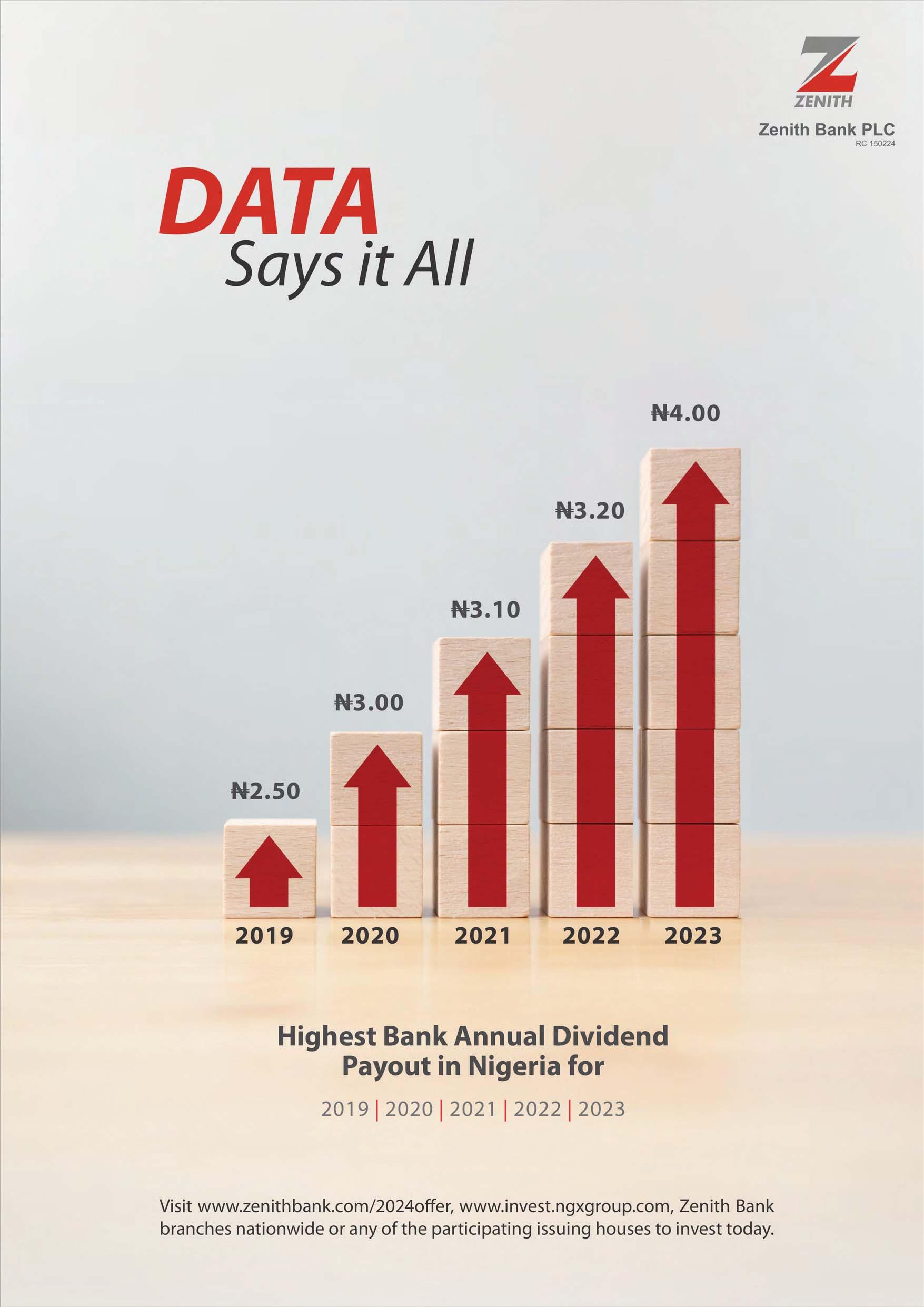Why CBN Allowed Providus to Take Over Unity Bank
James Emejo in Abuja
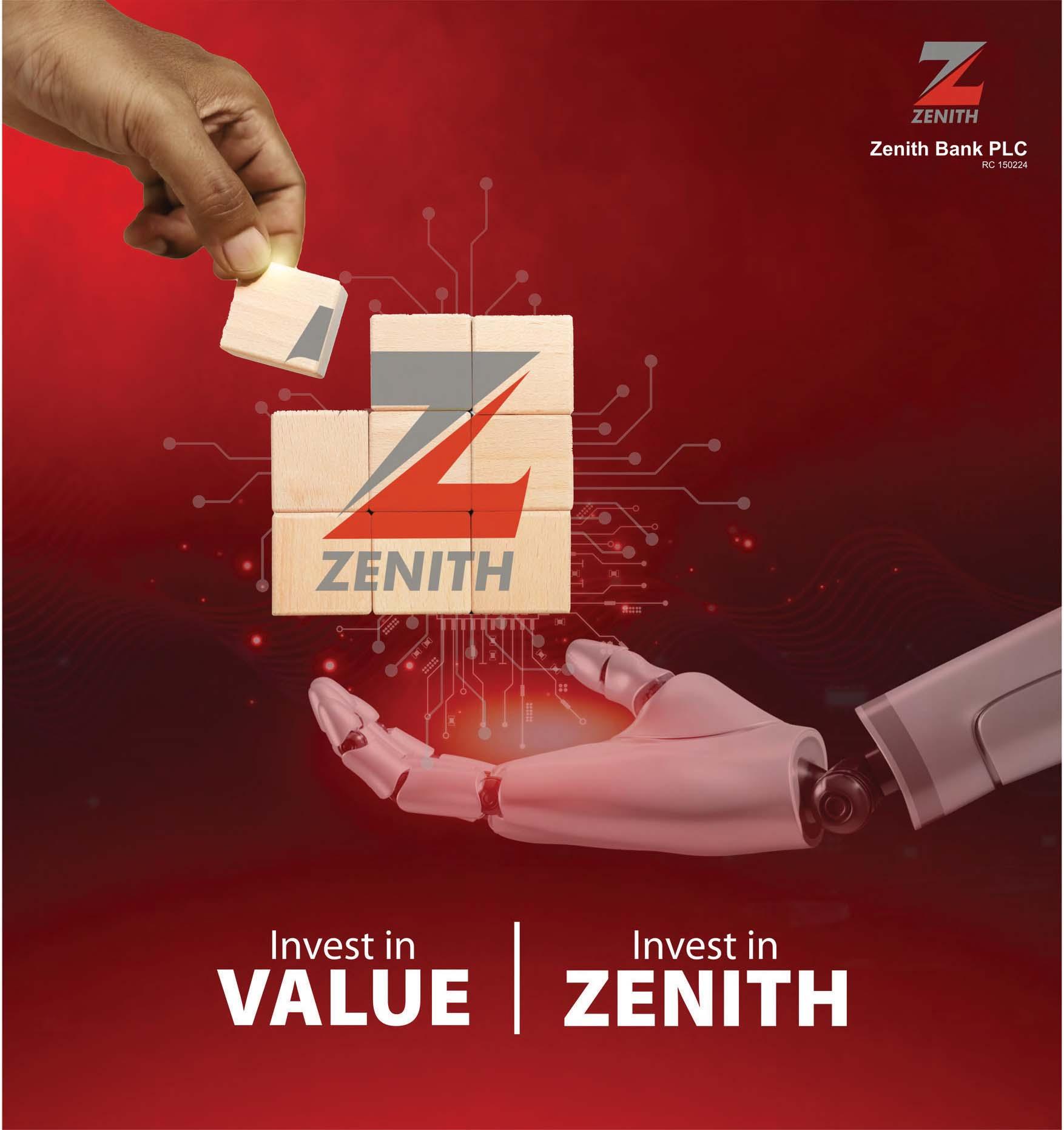





James Emejo in Abuja





Onyebuchi Ezigbo in Abuja
Nigeria Labour Congress (NLC), yesterday, warned that the administration of President Bola Tinubu might be encouraging dictatorship unconsciously.
NLC condemned alleged moves by the government to frame up innocent citizens on trumped up charges.
Worried by the recent unrest and hunger protests across the country, NLC urged Tinubu to convene an inclusive stakeholders' meeting to discuss pressing national issues.
In a communique issued at the end its
security initiatives.
emergency National Executive Council (NEC) meeting held on Saturday, and signed by NLC president, Joe Ajaero, the labour union also urged the federal government to stop the harassment of those holding opposing ideologies.
NLC stated, “The administration is unwittingly courting dictatorship. We must understand that this is not the first protest in Nigeria and would not be the last.
"NEC wonders why this administration is criminalising protest and have renewed clamp down on Marxists, Socialists and those who hold different shades of leftist ideologies as
if courting a neo-liberal dictatorship.”
NLC said the president needed to hold a national dialogue to discuss the pressing issues confronting Nigeria, address the root causes of the current unrest, and chart a path forward for the country.
The communique said, "The NEC calls on the government to convene an inclusive stakeholders' conclave to discuss the pressing issues confronting Nigeria and chart a path forward that addresses the root causes of the current unrest – hunger, poverty, inflation, insecurity and widespread dissatisfaction with government policies.
"The NEC calls on the government to stop the blame game and, instead, engage in meaningful dialogue with all stakeholders to find lasting solutions to the nation’s challenges."
The labour movement also urged Tinubu to take decisive action to address the systemic issues of profligacy, waste, and mismanagement that had exacerbated the suffering of Nigerians. It said government must listen to the voices of reason, embrace truth, and pursue a holistic overhaul of its policies.
NLC said the government should distance itself from divisive rhetoric
Sources also revealed that these were the major consideration by the CBN when it approved Providus’ bid to take-over Unity Bank, adding that Providus Bank has 80 per cent of the capital injection into the new entity that would emerge from the proposed acquisition.
The CBN also recently approved another N700 billion which would also allow the apex bank to recover its support to Unity bank.
Only last week, the Nigerian banking sector landscape was shaken following the approval of the merger of Unity Bank Plc and Providus Bank Limited. The Walter Akpani-led Providus, a financial services provider licensed as a commercial bank by the CBN in January 2016 took the industry by storm.
What surprised many stakeholders was how a relatively younger Providus Bank was able to pull through such a major acquisition deal, passed the due diligence test and obtained the regulatory approval from the CBN Governor, Mr. Olayemi Cardoso.
THISDAY can now exclusively reveal the history of the transaction, the cast of characters behind the transactions, their challenges and triumph and how this may have become a model for the CBN in treating future cases of non-performing loans by banks in Nigeria.
The Birth of Unity Bank
As the deadline for the July 2004 banking recapitalisation programme drew closer, some banks risked revocation of their licenses. When the reform was announced, Nigeria had 89 banks, most which were small in size with limited lending capability. As of then, the single borrower limit for the banks’ lending was 35 percent of shareholder funds. Prior to this reform, the required minimum of shareholder funds was just N2 billion. While a few banks had shareholder funds of up to N10 billion, that meant their maximum loans could only be a maximum of N3.5 billion, an amount commonly said to be grossly insufficient to finance major transactions in critical sectors of the economy such as power, telecommunications, real estate and maritime.
The Soludo reforms began with the phased withdrawal of public funds from the banking sector in July 2004 with the aim of forcing the banks to find alternative deposits instead of a chronic dependence on government funds. By this time, industry analysts agreed, 83.9 per cent of money in circulation within the Nigerian economy was outside of the banking sector. The hope was that banks would chase these funds and improve their lending capabilities.
Thus, a hasty marriage of nine banks, namely, Bank of the North, First InterState Bank, Inter-City Bank, Pacific Bank, Societe Banque, Tropical Bank, New Africa Merchant Bank, Centre Point Merchant Bank and New Nigeria Bank was hurriedly put together to form Unity Bank with late Prof. Akin Mabogunje appointed as Chairman and Alhaji Falalu Bello as Managing Director from 2006 to 2011. Unity Bank commenced operations in January 2006 following the merger of the nine banks with competences in investment, corporate and retail banking. THISDAY historical checks revealed that, due to some intense ethno-religious pressures, Soludo was reported to have quickly given Unity Bank “a pass mark” to escape the regulatory hammer. According to industry watchers, this was said to have been far from the truth as the bank had inherited several legacy debts comprising
heavy Non-Performing Loans from the legacy banks. THISDAY’s archival findings further shows that, as of 2005 when the banking consolidation was announced, about 7 of the 9 banks that hurriedly coalesced into Unity Bank were already clinically dead. By 2009, Unity Bank itself was already with the NDIC.
However, on 1st of June 2009, Sanusi Lamido Sanusi was named Central Bank Governor by President Umar Musa Yar’Adua and his appointment was confirmed three days later in the heat of the global financial crisis to replace Dr. Chukwuma Charles Soludo. By this time, Unity Bank was widely known by industry watchers to still be on “life-support” in a manner of speaking. Sanusi Lamido then reportedly gave Unity Bank six months to recapitalize saying the bank had “the best corporate governance practice” despite not having any audited accounts for years. There were suggestions by sources close to the Nigerian Senate then that this was the condition the Northern Senators had given the Presidency to support Lamido Sanusi’s clearance ahead of the Senate Screening as CBN Governor.
Thomas Akoh Etuh to the Rescue
Upon assumption of office, Lamido introduced the risk-based supervision model which involved assessing the banks’ capital adequacy relative to their risk profiles. According to a source close with his fingers on the pulse of the Northern establishment, this development rattled come concerned elder statesmen who then approached one of Nigeria’s serial investors, the self-effacing Thomas Akoh Etuh pleading with him to invest in Unity Bank to save the bank as it already had a problem of negative shareholding and had just six months more to recapitalize. The source who was also close to the elder statesmen further confirmed to THISDAY, that by 2009, the elder statesmen specifically requested Thomas Akoh Etuh to invest the sum of N10billion in the bank. But for Unity Bank, even as of 2013, the problem of liquidity still persisted and the center could no longer hold again as Unity Bank could no longer meet up with clearing under the leadership of Alhaji Ado Wanka, its then Managing Director from 2011 to 2013.
THISDAY findings discovered that the then leadership of the bank had invested in Express Discount House with no collateral whatsoever. This exposure worsened the Unity Bank liquidity crisis. Ado Wanka and the Bank’s Chairman, Alhaji Numan Danbatta were subsequently removed from office and succeeded by Henry Seminitari as Managing Director and Lamis Dikko as Chairman.
The source told THISDAY how Thomas Etuh was offered the option of nominating a Managing Director for the bank following his readiness to invest in the bank, which he declined. “Thomas Etuh was however appointed Vice Chairman of the bank instead,” the source added. Further checks by THISDAY showed that that same year, Unity Bank initiated a Rights Issue to raise N40billion naira.
THISDAY findings also showed that, on 23rd January 2015, Thomas Etuh was subsequently appointed Chairman of the bank following the resignation of the former Chairman, Alhaji Lamis Sheu Dikko who left to pursue his political ambition. Thomas Etuh held the position until 2017 when he was said to have voluntarily resigned to attend to a pressing family crisis and was succeeded by Aminu Babangida as Chairman with Tomi Somefun becoming
the Managing Director, a position she holds to date.
Another source close to the CBN confided in THISDAY that, “while all of this was going on, the legacy NonPerforming Loans (NPLs) were still in the books of the bank, some from the 1960s and 1970s with interest capitalizing monthly.” The source lamented how, the Management of the bank failed to take advantage of the forbearance window provided by the Central Bank of Nigeria (CBN) then to be able to save the bank. Another source close to Unity Bank wondered why, another CEO of the bank, Falalu Bello, who was appointed CEO and Group Managing Director of Unity Bank from 2006 to 2011 also refused to sell off these legacy debts to AMCON but rather retained them in the books of the bank with interest mounting daily. The source disclosed that, “this is contrary to the claims now being disingenuously made by some vested interests around Unity Bank that a previously healthy Unity Bank Plc led by Thomas Akoh Etuh found itself completely hollowed out after giving out hundreds of billions of naira in non-performing loans (NPLS).”
THISDAY can however authoritatively reveal that, concerned by the lingering problem the NPLs had constituted to the sustainability of the bank, Thomas Etuh it was who sought counsel from a highly respected U.K-based Global Investment Banker who had helped the Bank of England to design the rescue of British banks during the last global financial crisis. He was said to have offered Thomas Etuh his time-tested strategy for debts to Unity Bank. THISDAY investigation threw up the names of some very reputable firms such as PricewaterhouseCoopers, Olaniwun Ajayi LP and Frontier Capital Alternative Assets Ltd, FCAAL which were said to have been involved in conducting financial, legal due diligence and ultimately sale of the debts. An inside source at one of the firms confirmed to THISDAY that, “No Objection” responses were obtained from CBN and AMCON respectively. According to THISDAY checks, the AMCON Act requires that AMCON must always be offered the first right of refusal to buy such debts. Another reliable source at the CBN who spoke to THISDAY on Friday in Abuja said,” yes, Unity Bank obtained a “No Objection” response from AMCON and FCAAL was able to buy off the toxic debts off the books of Unity Bank.”
As of 2014, THISDAY gathered that Unity Bank had amassed non-performing loans (NPLs) of approximately N191.9bn, representing over 70% of the loan portfolio. This was significantly higher than the regulatory threshold for prudential supervision and was the highest ratio of NPLs/Total Loans in the Nigerian Banking Industry at the time. However, by the time the NPL deal with FCAAL was being completed in 2016, NPLs were said to have risen to approximately N242bn, excluding intervention and insider credits. THISDAY learnt that the collateral coverage of NPLs, estimated at less than 10% of loan value, was very weak, further reducing collectability.
THISDAY investigation revealed that Frontier Capital Limited, a boutique investment banking firm, maintains a low profile but its involvement in the distressed debt space as an adviser, dates back to the early days of the Asset Management Corporation of Nigeria,
and, instead, promote national unity and the restructuring of the country.
NLC further demanded immediate apology from the Nigeria Police and the federal government for the "unwarranted invasion and desecration of the headquarters of Nigeria Labour Congress (NLC)". While calling for a forensic security audit of the NLC headquarters to ascertain its safety and continued suitability for the use of workers, it directed a temporary cessation of use of the labour union’s head office to mitigate any unforeseen disaster that might have been intended. Ajaero
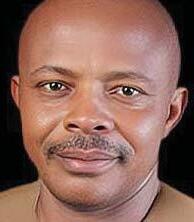
AMCON. Sources at AMCON told THISDAY that its former CEO, Femi Edun led one of the earliest loan restructuring deals to be approved by the Board of AMCON, Sparkwest Steel Industries Limited in 2011. He was subsequently appointed as Chairman of the company’s board of directors, representing AMCON and the lending banks. THISDAY checks also revealed that Frontier Capital has in fact advised on several other distressed debt transactions, acting for borrowers, lenders and AMCON at different times.
The company incorporated Frontier Capital Alternative Assets Limited (FCAAL) as a private acquirer and manager of distressed debt portfolios and other alternative assets as unconventional asset classes are usually described in the financial markets. THISDAY searches at the Corporate Affairs Commission reveal that the owners of FCAAL are the management of Frontier Capital and InvestmentOne Capital Management, a subsidiary of Lagos based InvestmentOne Financial Services Limited, formerly owned by Guaranty Trust Holding Company Plc. While the concept of distress debt investing may be new to the Nigerian clime until the AMCON dispensation, it is major practice in most advanced economies of the world. Harvard Business School Online says, “distressed debt investing, also called distress debt investing, distressed investing, or distress investing is the process of investing capital in the existing debt of a financially distressed company, government, or public entity.” Some of the largest privately owned players in the field globally are Oaktree, Cerberus, TPG, Centerbridge, Fortress, PIMCO, Apollo, Bain Capital and Blackstone. In 2022, International Financial Corporation and Nimble Group launched a $165million facility to invest in distressed debt in Southern and Eastern Africa. FCAAL is the pioneer private player in West Africa, following publicly owned AMCON.
Sources close to Unity Bank say that when the deal with FCAAL was done in 2016, the bank’s, Unity Bank's NPL/ total loans ratio at over 70 per cent, was the highest in the industry and the sale of the NPL portfolio was a condition for keeping their banking licence. The bulk of the bad loans were said to have been inherited from the 9 legacy banks that made up Unity Bank.
THISDAY learnt that FCAAL’s acquisition of the loan portfolio was preceded by rigorous financial and legal due diligence by the firms of PricewaterhouseCoopers and Olaniwun Ajayi LP respectively, the same firms who advised AMCON in the acquisition of NPLs from the banking industry in 2010. Due diligence confirmed that of the non-performing loans to over 20,000 borrowers totaling N242 billion, only N51 billion was properly documented and fully backed by collateral. Therefore, the transaction fully complied with all legal and regulatory requirements then in force. FCAAL acquired a further tranche of loans totaling N187 billion, in 2018.
THISDAY gathered that the commercial terms of the NPL transaction were for an upfront deposit of up to 5 per cent of loan value, depending on the quality of the loans, totaling N6.4billion and further payments of up to 60 per cent of collections. THISDAY confirmed from multiple inside sources at Unity Bank that, to date, the bank has received over N15billion, whilst collections and payments continues. FCAAL is said to currently be overseeing over 250 court cases on the Unity Bank NPL portfolio. Multiple sources at the CBN and NDIC respectively confirmed to THISDAY that they have looked at Unity Bank’s NPL
transactions on repeated occasions both as part of routine examination activity and by way of deliberate investigation instigated by anonymous petitions. They commended the pioneering effort of FCAAL and described the transactions as a model for the banking industry to use as an additional option for NPL resolution, especially since AMCON is now in the "sunset phase" and no longer acquiring NPLs.
Multiple sources at the Central Bank involved with the transaction who spoke to THISDAY on condition of anonymity disclosed that, “by the time due diligence was conducted on the loans only N51 billion of the over N400 billion NPLs of Unity Bank had perfected collaterals. One of the CBN sources told THISDAY that “the attempt to pin the problem of the bank on Thomas Etuh may have been a clever diversionary tactic by some vested interest to scuttle the planned acquisition of the bank by Providus Bank. The allegations have no footings in the facts and figures before us at the CBN.”
The Providus Connection
THISDAY investigation confirmed that, following the global investment banker’s advisory to Thomas Etuh and the NPL sale transaction, NPLs were cleared out to less than two per cent percent. Nevertheless, raising capital remained a challenge for Unity Bank. An inside source at the Risk Department at Providus Bank confided in THISDAY on condition of not having her name in print that, “it was Thomas Akoh Etuh who led the efforts for Providus Bank to make N75 billion capital injection for the acquisition of Unity Bank.” She wondered why some vested interests whose positions would be affected should this capitalization move succeed began to hire some hatchet writers to begin to release false information alleging sharp practices in the process leading to the off-loading of the toxic loans from the book of Unity Bank, saying “CBN and all the parties in this transaction deserve some commendation as this is now a precedent for the banking sector.”
Alex Emode, a close ally of Thomas Etuh who spoke to THISDAY in Lagos, queried, “isn’t it illogical for Thomas Akoh Etuh to be working against the interest of a bank where he is still the largest shareholder? As Chairman of Unity Bank for a period of time, Emode told our correspondent that Thomas Akoh Etuh understood the realities of the financial health of the bank. “He received no official car nor a litre of diesel from the bank. Rather, he became an advocate of cutting costs and waste by reducing the large size of the Board of the bank from an 18-member Board to an 8-member Board. A clear testament to his penchant for cost-cutting but one for which he was hated by some powerful forces within the bank,” Emode added. Another source at Providus Bank to THISDAY, “I think the motive of those behind the negative media campaign was simply to force the CBN to halt the acquisition which comes with a N75 billion capital to restore the bank to sound state of financial health. Thankfully they have lost the battle for the soul of the bank.”
Although the combination of Providus and Unity is structured as a merger, THISDAY checks revealed that Providus Bank is actually the stronger partner given its financial condition. Providus Bank had shareholders funds in excess of N96.2
billion and total assets of N1.5 trillion as of December 2023 and is one of the fastest growing banks in the industry. THISDAY Analysts compared that to Unity Bank’s negative shareholders’ funds of N190 billion and total asset of N413 billion.
The combination with Unity Bank gives Providus Bank the opportunity to have a more national outlook, given the branch network, spread and profile of Unity Bank across Nigeria, especially in Northern Nigeria. For Unity Bank, the merger preserves the safety of depositors’ funds and its banking franchise. It also allows Unity Bank and its shareholders to be part of a fast growing and well managed institution with bright prospects. Unity Bank has one of the most extensive branch networks in northern Nigeria, inherited from some of its legacy banks, particularly Bank of the North, Tropical Commercial Bank, Intercity Bank and New Africa Bank. This, combined with its focus on small and medium scales enterprises and the agricultural sector means that Unity Bank also plays an important role in financial inclusion - bringing banking services to unreached and under-served citizens and communities.
According to industry analysts THISDAY spoke to as part of its investigation into the transaction, approving the merger of Providus and Unity Bank, allows the Central Bank of Nigeria to achieve a number of objectives. Firstly, by putting the management of the combined bank in the hands of a tested management team, CBN greatly enhances the prospects of repayment of the financial accommodation already extended to Unity Bank so that there is no loss to the Treasury. Next and of great importance is the objective of financial inclusion. Preserving the branch network and customer accounts of Unity Bank secures continued access to banking services for millions of urban and rural customers in many areas of the north, including several areas where Unity Bank is the only bank.
THISDAY learnt that, by extension, this also allows the Central Bank to prevent loss of customer confidence. Therefore, the merger is consistent with the Central Bank’s responsibility to maintain financial sector stability, manage systemic risks and foster financial inclusion.
Now that the regulator’s nod has been secured and Providus Bank will be able to make the injections of N75billion for the acquisition of Unity Bank, the bank may be well on its way to sound financial health as it no longer faces the challenge of the Non-Performing Loans in its books. Today, Unity Bank is one of Nigeria's leading retail banks with 213 business offices spread across the 36 States and Federal Capital Territory. It is rated as Nigeria's 8th largest bank by business locations. The Bank offers wide-ranging financial services to individuals, businesses and the public sector of the nation’s economy. Unity Bank focuses in particular on SMEs and Agribusinesses. The Bank is driven by the vision to be the retail bank of choice for all Nigerians and this is at the core of all that it does as a bank.
With the combined force of Unity Bank’s branch network and Providus Bank’s digital prowess, a stronger banking institution is bound to emerge from the transaction. This may well be the beginning of a season in the Nigerian banking sector.


Anambra State governor, Prof Chukwuma Soludo with his daughter, Adaora, while performing traditional rite for her marriage to h er hubby, at the weekend in his country home in Isuofia, Aguata Local Government Area.
Emmanuel Addeh in Abuja
Portland Gas, one of the companies partnering the federal government in its Compressed Natural Gas (CNG) programme, at the weekend stated that the initiative was a game-changer for the transportation sector in Nigeria.
Speaking at the launch of the ride sharing CNG conversion incentive programme in Abuja, Chief Executive Officer of Portland Gas, Mr Folajimi Mohammed, stated that the programme will lead to a
cleaner, more sustainable energy future.
Mohammed said the Presidential CNG Initiative (PCNGi) had been instrumental in paving the way for innovations that will reshape the way Nigerians thought about transportation and energy consumption in the country.
He said one of the key components of the initiative was the Ride Share CNG Conversion Incentive Programme, a groundbreaking effort to encourage the adoption of CNG among ride-share
drivers.
Mohammed stated, “This programme is a game-changer, offering substantial incentives for drivers to convert their vehicles to CNG, thereby reducing emissions and lowering fuel costs. It is a win-win for both the environment and the economy, and we at Portland Gas are fully committed to supporting this initiative in every way possible.
“In line with the PCNGi, we are also excited to introduce the MyCNG App, a user-friendly
platform designed to facilitate the transition to CNG. This app provides real-time information on CNG stations, fuel prices, and conversion centres, making it easier than ever for drivers to embrace this cleaner, more cost-effective fuel option.”
Mohammed said the success of the CNG initiative relied on efficient management and seamless service delivery. He stressed that this was the reason Portland Gas was complementing the PCNGi with the launch of a cutting-edge
David-Chyddy Eleke in Awka
Anambra State Governor, Professor Chukwuma Soludo, weekend, gave out his daughter, Adaora, in marriage at his home town in Osuofia, Aguata Local Government Area of the state.
The event attended by several dignitaries, mostly from his government and his in-laws' family from Onitsha, was the first in 142 years in
the dynasty for lack of female children.
Soludo took to his verified Facebook account to attest to the fact that the traditional marriage was truly the first in his family in the last 142 years. He explained that it was because of the lack of female children in his family, until he broke the jinx, after God blessed him with four female children.
The governor wrote, "In
the presence of my family, kinsmen, friends, and my in-laws from Onitsha, I gave out my lovely daughter, Ifeatu Adaora Soludo, to her heartthrob after all traditional rites had been met and certified in line with the customs of the Isuofia community.
"I celebrate this historic event for two reasons. First, God has graciously blessed the larger Soludo family with another such marital
union after 142 years (by my estimate).
"This is largely due to the fact that female children have been a rarity in the past three generations of the Soludo family. To break that ‘jinx’, God has mercifully provided me with four beautiful daughters, whom I celebrate every day."
Soludo stated that by marrying his daughter off to Arinze Ibekwe, his son in-law, he had gained another son.
Addeh in Abuja
The President of the Consortium Touristes Par Million Au Benin (CTM) who also doubles as the Vice President of the African Tourism Board, Dine Bouraima, has called for collaboration among stakeholders to ensure the growth of the sector.
In an address at the 27th Annual General Meeting and Conference of the Federation of Tourism Associations of Nigeria (FTAN) held in Abuja, Bouraima who delivered a goodwill message emphasised unity, to fully tap the immense potential of the tourism sector in Africa.
Bouraima, reflecting on Benin's rich cultural heritage, historical significance, and natural beauty,
underscored the historical connections between Benin and Nigeria, particularly within the Yoruba community.
He emphasised the importance of creating synergies between the two nations to foster sustainable tourism development.
“Benin has a rich tapestry of cultural heritage, historical significance, and natural beauty.
From the historic city of Ouidah to the breath-taking landscapes of Pendjari National Park, our nation stands as a beacon of potential and promise in the tourism industry.
“ It is imperative for the two countries to create a synergy between ourselves in the areas of mutual tourism sustainable development,"
he stressed.
He emphasised the critical role that institutions like the African Tourism Board and Consortium Touristes Par Million Au Benin play in promoting cooperation throughout the continent.
He urged using these channels to take advantage of the enormous potential in the travel and tourist industry, fostering prosperity and growth for all.
Bouraima also talked about his dedication to creating enduring business ties with Nigerian partners. He underlined how crucial the alliances are to fostering richer cross-cultural interactions and advancing economic growth in both nations.
“It is imperative that we leverage our resources, expertise, and unique offerings to create a seamless and enriching experience for tourists. By doing so, we can ensure that both our nations reap the rewards of increased tourism activity, greater cultural exchange, and enhanced economic growth," he asserted.
He asked for a reaffirmation of dedication to teamwork, knowledge sharing, and creating connections that result in mutual achievement.
"Together, we can create a robust framework that will support our tourism industries and foster a sustainable future for our communities. Let us move forward with determination and unity for the benefit of all," he stressed.
Customer Relationship Management (CRM) software.
According to him, “This software is designed to schedule and handle all auto conversion appointments, ensuring that every driver has a smooth and hassle-free experience when making the switch to CNG.
“Additionally, our CRM system will create and retain a comprehensive database of all conversions, enabling us to track progress, identify trends, and continuously improve our services.
“This database will be an invaluable resource, not just for Portland Gas, but for the entire CNG ecosystem. It will allow us to provide better support to our customers, optimise our operations, and contribute valuable insights to the broader CNG community.
“We believe that this initiative will set a new standard for service excellence in the CNG sector and further accelerate the adoption of this clean, efficient fuel.”
Executive Vice Chairman/Chief Executive Officer of the National Agency for Science and Engineering Infrastructure (NASENI), Mr. Khalil Halilu, emphasised the significance
of Pi-CNG in Nigeria's gas revolution, stating that the Initiative has become central to discussions on the country's energy future. Halilu said, "A little over two months ago, we commissioned this all-in-one CNG facility in partnership with Portland and Dana Motors. This joint venture is part of NASENI's vision to accelerate the delivery of market-ready products that reduce the cost of living, improve quality of life, and support President Bola Ahmed Tinubu's Renewed Hope Agenda." The Conversion Incentive Programme, aimed at the rideshare sector, including Uber and Bolt drivers, offers a 50 per cent discount to drivers who sign up and use the newly launched MY-CNG App. Halilu stated, "CNG is a cleaner, more affordable vehicle fuel, with the potential to reduce transportation costs by up to 70 per cent and deliver 40 per cent savings for car owners."
He stressed that the initiative was a response to the current economic challenges, and it offered a viable solution to reduce the cost of living for Nigerians.
Kasim Sumaina in Abuja
The Nigerian Maritime Administration and Safety Agency (NIMASA) and Chatham House, London, have agreed to address issues of maritime security in the Gulf of Guinea.
It therefore said it was set to raise the matter at the United Nations Security Council (UNSC).
NIMASA, While emphasising the progress made in combating piracy and sea robbery in the region noted that the decision to reach out to UNSC was made during a session between Dr. Dayo Mobereola, Director General of NIMASA, and Dr. Alex Vines, Director of the Africa Programme at Chatham House.
Mobereola in a statement by Head, Public Relations, NIMASA, Osagie Edward, yesterday in Abuja, noted that the agency and Chatham House had also commenced collaboration to convene a meeting of international stakeholders from
both the public and private sector in Nigeria.
He stressed that this was with the aim of developing a position paper on maritime security in the Gulf of Guinea.
The NIMASA DG emphasised the importance of effective international partnership to sustain security in the Gulf of Guinea.
He said: “We had a very fruitful discussion with the team at Chatham House. The decision to engage the UN Security Council is to ensure they are well informed about the progress made so far in terms of security in the Gulf of Guinea.
"We also need an independent analysis of the security situation in the Gulf of Guinea and how best to transform the gains in terms of enhanced security, into tangible economic benefits such as reduction in the cost of all Nigerian Bound freight and issues bothering on payment of war risk insurance premium for Nigerian bound vessels.


The management of AIPCC Energy Limited, operators of the Edo Refinery and Petrochemicals Company Limited (ERPCL), yesterday raised the alarm over the persistent lack of crude despite being a full functional 1,000 barrels per day stream crude oil refinery. It said in spite of the disclosure by the Dangote Refinery on the refusal of the Nigerian National Petroleum Company Limited (NNPC) and the directive by President Bola Tinubu that the company should supply crude oil to Dangote Refinery and other Modular Refineries in the country in Naira denomination, the Edo Refinery was yet to get any from
the relevant authorities.
Speaking to journalists in Benin-City at the weekend, the management of Edo Refinery situated at Ologbo in Ikpoba-Okha local government area of Edo State, said it was facing significant challenges due to persistent lack of crude oil supply.
Representative of the company, Segun Okeni, who spoke at the event, said the refinery, which requires 1,000 bpd stream crude can barely function at full installed capacity.
Okeni said though the company has had existing crude oil supply agreements with Seplat and ND Western since 2022, bureaucratic bottlenecks had prevented the refinery from accessing the much-
Emmanuel Addeh in Abuja
Seplat Energy plc, an indigenous energy company yesterday reassured all stakeholders of its commitment to driving and ensuring a sustainable business and creating increased value for people and the environment.
In a statement, the company also reiterated its resolve to addressing the dual challenges of ensuring energy security and meeting climate change mitigation targets.
The Director, New Energy, Seplat Energy, Mr. Okechukwu Mba, gave the assurance during a panel session at the Society of Petroleum Engineers (SPE) Nigerian Council’s 47th Nigeria Annual International Conference & Exhibition (NAICE) in Lagos.
The event was themed: “Energy Security: Exploring the Interplay Between Technology, Market Dynamics and Organisational Capabilities”.
Mba, who represented Mr. Roger Brown, CEO Seplat Energy Plc, at the session, said every molecule of gas Seplat Energy produces is targeted at displacing utilizable diesel, and the company’s new gas plant developments now come with Liquefied Petroleum Gas (LPG) installations, which promote clean energy and discourages the use of biomass for cooking.
“We are committed to ending routine gas flaring by 2025, and all projects aimed at making this a reality are on track,” Mba assured.
In a bid to end gas flaring as targeted, Seplat Energy, a statement from the company said, has continued to progress efforts to secure evacuation
options for unprocessed associated gas from the Sapele Flow Station.
“Alongside this, work has continued on the construction of the Sapele Integrated Gas Plant (SIGP), which is scheduled to be completed during H2, 2024. Once operational, SIGP offtake has the potential to materially reduce Group Scope 1 emissions.
“Other ongoing key flare-out projects, including the Western Asset Flares Out (installation of VRU compressors), Sapele LPG Storage & Offloading Facility, Oben LPG Project and Ohaji Flares Out Project, are on track for completion by their respective due dates,” the energy firm stated.
The Seplat New Energy Director also referenced the company’s Tree4Life initiative, which recently saw the NEPL/Seplat Energy joint venture and the Edo State Government sign an agreement that allocates 6,000 hectares of land from Edo State protected forest reserves to enable a large-scale tree planting initiative by Seplat Energy Plc. This, it said, was in furtherance to increase forest cover and carbon sequestration efforts within the region and ensuring a sustainable environment for living.
The efforts by Seplat Energy and other operators to drive LPG penetration in Nigeria also received commendations from the 2024 SPE NAICE participants and organisers, as the moves are expected to boost supply of LPG in Nigeria and possibly bring down prices of the commodity, thus promoting accessibility and energy security, it said.
needed resource.
He alleged that in 2021, ERPCL’s addressed a letter to the Group Chief Executive Officer of NNPC, Mele Kyari, after a series of meetings and constant communication with him did not hear much fruit.
“On August 18, 2021, our team led by our chairman, met with the NNPC GCEO and its top management team to discuss our intention to buy crude oil from NNPC and we immediately wrote seeking crude supply.
“In July 2022, the representatives of NNPC visited our facility for site inspection and to confirm the mechanical completion of the Edo refinery. In September 2022, we were invited for a commercial negotiation meeting with the NNPC head of terms, after which we sent a follow-up letter identifying the oil fields from which we can offtake crude oil.
“In March 2022, we also wrote to the Ministry of Petroleum Resources, informing it of our refinery status, future projects and our challenges of lack of crude oil supply to our refinery.
“We had also written and
had a meeting with the NNPC Exploration and Production Limited (NEPL) between November 2022 and March 2023, indicating our severe need for crude oil supply from oil fields where NEPL has equity stakes,” he stated.
The ERPCL representative however, noted that despite the meetings, correspondences and communications with NNPC over the past three years on the issues of crude oil supply, nothing was done.
Besides, he identified other key issues encountered by the refinery as the inability of NNPC to assign any of the preferred fields to allocate crude to the company since it started having engagement with the management August 18, 2021.
He pointed out that even with the options given to allocate crude to the refinery from ND Western, First Hydrocarbon, and Seplat, nothing happened till date.
"ERPCL also has a Crude Oil Supply Agreement with ND Western to lift crude oil from the Ughelli Pumping Station (UPS) owned by NEPL and operated by Shoreline.
“We have held several meetings with Shoreline and Heritage Oil and indicated our readiness to make modifications needed to offtake crude oil from the UPS but no progress has been made till date,” the company added.
On the way forward, ERPCL said NNPC and other producers need to put loading infrastructure in place to allow for truck loading, decrying why Dangote would be getting 30,000 bpd because it opened up to the public, while smaller refineries are not being served which he likened to lack of respect for small people who can also grow the economy alongside the big players.
The representative of ERPCL therefore sought Kyari’s intervention as group GCEO of NNPC a d implement the SeplatERPCL agreement to enable Edo refinery to start lifting crude oil from Oil Mining License (OML).
Describing the past two years as frustrating for the establishment, he said: "If we local investors can't get crude even as small as we are, how can foreign investors be encourage to invest in the country.
“ The total daily demand of all
modular refineries is not up to 2 per cent of the daily crude oil production. Our lifting from the pumping station, will even reduce pipe line losses," he added. Okeni argued that the advantage of loading from NNPC pumping stations to the expert terminal was that it costs less because the cost of pipeline export terminal charges and loss will be saved. According to him, this will make the modular refineries more competitive than the offshore refineries who come to the export terminal to take the crude, thereby making cost savings to trickle down to Nigerian consumers.
"If the smallest refinery is not getting crude, it will discourage investors in that area" Okeni said, contending that because of lack of crude, OPAC Refinery operates less than 3 per cent of its installed capacity and Edo Refinery less than 10 per cent of installed capacity. He noted that Nigeria loses millions of dollars following the inability of NNPC to supply modular refineries over the past three years which has a total installed capacity of less than 30,000bpd.
Kasim Sumaina in Abuja
The Nigerian Meteorological Agency (NiMet) air quality monitoring stations nationwide are in deplorable state, jeopardizing the agency's ability to fulfill its critical mandate effectively.
This was discovered after a comprehensive audit exercise of NiMet's air quality monitoring stations published at its website.
The audit which was commissioned in February 2024 by NiMet management headed by the DG/CEO, Prof. Charles Anosike, concluded that; “NiMet’s air quality monitoring stations nationwide are in a deplorable state and that the comprehensive audit exercise was aimed to evaluate the operational status and condition of seven critical air quality monitoring stations strategically located across the country in Sokoto, Kano, Maiduguri, Yola, Enugu, Lagos, and Abuja.
These facilities, representing a substantial financial investment
by the agency, are pivotal in monitoring air quality and providing essential data to support environmental policies and public health initiatives nationwide.
The leader of the audit team, Mrs. Olumide Olaniyan, the General Manager, Air Quality Monitoring Unit, reported that the findings of the audit exercise painted a profoundly concerning picture, unveiling the deplorable state of these stations with the exception of Sokoto which has just been installed and Yola where the installation is still ongoing.
The audit revealed that the current condition of the remaining five facilities is alarmingly appalling, jeopardising their ability to fulfill their intended purpose effectively.
The audit exercise shed light on the concerning reality that the air quality monitoring stations had not received the necessary attention and resources over the years by the past managements.
This lack of proactive
maintenance and resource allocation, NiMet said, has hindered the stations’ ability to operate at their full potential, thereby limiting the agency's capacity to effectively safeguard public health.
According to the report: "For example, the report faulted the inability of the contractor at the Kano station to complete the installation for over five years after the contract was awarded, hence there has been no official handing over of the air quality station to NiMet by the contractor because the job has not yet been completed.
"The Enugu station which became functional after complete installation in 2013 worked till 2015.
"Currently, all MSS international/MSA gas analyzers which measured CO, NO2, SO2 and PM10 and wind sensor were carried away by the contractor in January 2019 for servicing, repairs and upgrade, but never
returned till date."
Summary of other issues noted in the report included ill-conceived contracts, lack of contractor compliance and maintenance capability, and abandoned air quality stations.
Reacting to the report, Professor Anosike said that it was important that management conducted the audit to have firsthand knowledge of the state of equipment in the agency. According to Anosike, "We have been mandated by the Honourable Minister of Aviation and Aerospace Development, Festus Keyamo, SAN, as part of the 5-point agenda set for Nigeria’s aviation sector to ensure strict compliance with safety regulations and continuous upward movement of Nigeria's rating by ICAO.
"The findings of the audit of NiMet's air quality monitoring stations, though shocking, will help management to determine areas to channel resources," Anosike said.


Emmanuel Addeh in Abuja
Oando Energy, one of Nigeria’s foremost companies operating in the oil and gas space has said that the current ongoing divestments in the industry were inevitable.
The company made the positive known at the recently concluded Society of Petroleum Engineers (SPE) 2024, Nigeria Annual International Conference and Exhibition (NAICE), which held in Lagos, according to a statement from the firm.
Speaking at the Workshop, General
Manager, Commercial, Oando Energy Resources, Akinbambo Ibidapo-Obe, shared Oando's strategies and preparations for the International Oil Companies (IOCs) divestment, underscoring the company's proactive approach.
He described the current spate of divestments as an inevitable reality indigenous companies have been actively preparing for.
"Where we are now is a confluence of opportunity and preparation. The government has been deliberate about ensuring the transfer of knowledge
from the IOCs to the indigenous companies over the years.
“Oando, along with other indigenous companies, has also proven its technical abilities to operate and manage these assets through the marginal fields program and earlier divestments.
“ It is now time for indigenous companies to step up, prove themselves on this global stage and drive significant growth and innovation in the industry," said Ibidapo-Obe.
The three-day conference, themed 'Petroleum Industry Value Chain Optimisation: The Inevitability
of Midstream and Downstream Development, ' was sponsored by IOCs and indigenous energy companies like Oando, Seplat, and Aradel, amongst others.
The conference entreated attendees to workshops, panel sessions, an award and gala night, as well as networking opportunities.
In attendance were the Minister of State for Petroleum Resources (Oil), Heineken Lokpobiri; the Minister of State for Petroleum Resources (Gas), Ekperikpe Ekpo; the Group Chief Executive Officer of the Nigerian
Emmanuel Addeh in Abuja
July 2024 was both second-warmest July and the second-warmest month on record, the European Union’s climate change service Copernicus, has said.
The month saw a global average temperature of 16.91 degrees Celsius, 0.04 degrees Celsius lower than the average temperature in July 2023, currently and the hottest month on record.
Until June, monthly average temperatures had broken records
every month since May 2023.
“The streak of record-breaking months has come to an end, but only by a whisker. The overall context hasn’t changed; our climate continues to warm.
“The devastating effects of climate change started well before 2023 and will continue until global greenhouse gas emissions reach net-zero,’’ Deputy Director of the Copernicus Climate Change Service, Samantha Burgess, said.
For the period from August 2023 to July 2024, the global average
temperature was 1.64 degrees Celsius above the pre-industrial average, according to Copernicus data.
Earth experienced its two hottest days ever in July, with the daily global-average temperature reaching 17.16 degrees Celsius and 17.15 degrees Celsius on July 22 and 23.
The average European temperature in July exceeded the average value for the month from 1991 to 2020 by 1.49 degrees Celsius, making it the second warmest July since records began in Europe.
According to the report, temperatures were mostly above average over southern and Eastern Europe, but near or below average over north-western Europe.
The European Union’s Copernicus climate service regularly publish data on the earth’s surface temperature, sea ice cover and precipitation.
The findings were based on computer-generated analyses that incorporate billions of measurements from satellites, ships, aircraft and weather stations around the world.
Governor Godwin Obaseki of Edo State has said the construction of the Uwelu-Adolor Road, in Egor Local Government Area of the state, will boost economic activities and open more communities in the state to development.
The governor who spoke while addressing journalists in Benin City, the Edo State capital, said the road will serve as a bypass connecting several communities in the state.
According to him, the road will span Uwelu to Siluko Road, through the Uwelu Market and Power line, and down to Adolor. Reaffirming his government’s commitment to opening up more communities for economic activities and development, Obaseki assured that all ongoing road projects in the state will be completed before the end of his administration in November.
The governor restated that the road is to be developed as part of plans to create internal bypass roads to decongest traffic from the Lagos-Benin Expressway, adding that the road when completed will serve as a mini bypass to move traffic around the Benin metropolis.
According to Obaseki, “The Uwelu Road will be rebuilt, from Siluko back to Uwelu Market, to connect Powerline and the work
that has been done along Adolor. This is all part of our efforts to build our internal roads and get traffic moving around the city.
“We are trying to have internal bypasses to take traffic coming in from the Lagos axis to the Benin Ugbowo axis through that traffic into Siluko and onto Ekenwan Road. This will be like the Western bypass, a mini bypass to take traffic and move around the city.”
National Petroleum Company Limited (NNPC), Mele Kyari; the Chief Executive of the Nigerian Midstream and Downstream Petroleum Regulatory Authority (NMDPRA), Farouk Ahmed; and the Chief Executive of the Nigerian Upstream Petroleum Regulatory Commission (NUPRC), Gbenga Komolafe, among other stakeholders.
A key highlight of the conference was the topical issues workshop, a session that explored the theme 'The Outlook of the Nigerian Oil and Gas Industry, Post IOC Divestment and Exits: Opportunities and Challenges'.
The session delved into the recent spate of IOC divestment and its implications for the country and Indigenous players, providing valuable insights and strategies for the future.
For over a decade, oil majors in Nigeria have pursued divestment strategies, focusing on exiting the shallow water and onshore sectors while maintaining interests in the deep waters and downstream sectors.
In February 2022, Seplat Energy
announced an agreement to acquire ExxonMobil's entire share in its shallow water business—Mobil Producing Nigeria Unlimited (MPNU). In September 2023, Oando disclosed that it had signed a deal to acquire Eni's subsidiary, Nigerian Agip Oil Company Limited (NAOC). In November 2023, Norwegian oil company Equinor announced that it had sold its Nigerian entity to Chappal Energies, the end of Equinor's three-decade association with Africa's largest oil producer, to name a few. Also at the conference, the plenary session themed 'Unlocking Upstream Value: Developing Markets, Trade Access, and Facilitating Partnerships in the Midstream and Downstream' was addressed by the seasoned panellists. The engaging dialogue resulted in a wealth of perspectives, strategies and recommendations for optimising value creation across the Nigerian oil and gas industry, including specific strategies for developing markets, enhancing trade access, and fostering partnerships.
Leading pay-tv company, MultiChoice Nigeria, has announced a three-month Golden Window for GOtv SupaPlus, from August 10 till November 10.
During this Window customers who renew or upgrade their GOtv subscription to the SupaPlus package, will pay N13,900 instead of N15,700 standard rate.
Announcing the offer, Executive Head of Marketing MultiChoice West Africa, Tope Oshunkeye, said it is a window of opportunity for customers to enjoy the best of action from the new European football season, and an interesting line-up of Africa Magic drama and movies across all Africa Magic channels.
According to Oshunkeye, “As part of our ongoing commitment to providing great value and ensuring high-quality viewing experiences for more families, we are offering this Golden Window to make premium
entertainment more accessible to our valued customers.
“The offer is open to all GOtv customers who renew or upgrade their subscription to the SupaPlus package. This package comes with all Africa Magic channels including AM Showcase, and top SuperSport channels that give access to the Premier League, La Liga, Serie A, and UEFA Champions League matches.”
League football action will kick-off this weekend, August 16 and will run throughout the window, while a new set of Africa Magic series will premiere on AM Showcase within the period.
To enjoy the offer, customers can reconnect or upgrade using the MyGOtv App or the USSD code (*288#). Customers can also download the GOtv Stream app to watch their favourite programmes on the go.
Unknown persons are reported to have vandalized and set fire to the Zonal Headquarters of the Redeem Christian Church, Kontagora, in Niger State. Valuable equipment in the church were said to have been stolen before it was set on fire. The incident occurred around 3.30am on Saturday. ThISDAY learnt that the vandals stormed the church in their numbers made away with valuable items including musical instruments before setting it on fire.
The church located along the road to the Federal College of Education FCE in the town suffered similar fate about 10 years ago when some religious fundamentalists set fire to the building then under construction after the church members ignored a directive that a church should not be built in the area.
The pastor of the church, Mr. Samson Ogbebor, said the incident occurred around 3am on Saturday.
His words: “I got a distress call that our church was on fire and on getting there I met a church that has been in existence for the past
20 years being burnt down and properties looted by hoodlums.
“This church has faced lots of challenges, about 10 years ago, hoodlums came and burnt it down completely and with self-efforts we were able to re-erect it.
“They had made several unsuccessful attempts and have refused us the permission to roof it properly and we decided to be using it like that for worship but look at what they have done today again.”
The Niger State Chairman of the Christian Association of
Nigeria (CAN), Most Reverend Dr, Bulus Dauwa Yohanna, who also confirmed the incident condemned the action of the arsonists describing the incident as "barbaric and uncalled for."
Reverend Yohanna said the incident was painful to the Christian community in the area and urged the Niger State Government to take proper action by ensuring the culprits are brought to book.
"There is freedom of worship in Niger State. I am sure by the time the government and security agencies take action; it will go a
long way to address any form of tension that may want to escalate, " Yohanna said, adding that "We are hoping that the law will take its course".
However, when contacted the police blamed the incident on "fire outbreak".
Police Spokesman, Superintendent of Police Wasiu Abiodun, said in a statement sent to ThISDAY which confirmed the incident that:
"On 10/8/2024 at about 09.00am information was received that on the same date at about 04.00am, there was a fire incident at Redeem
Church, along COE Road Kontagora. "The fire incident burnt and destroyed valuable property of the church, value yet to be ascertained,” Abiodun said, adding that: "The Police patrol team led by the DPO, A Div, Kontagora, visited the scene. The inferno was put off in collaboration with the fire service, but a large damage has been done by the fire". However, the cause of the inferno is yet to be ascertained he said adding that investigation into the "unfortunate incident is ongoing; no life was lost".

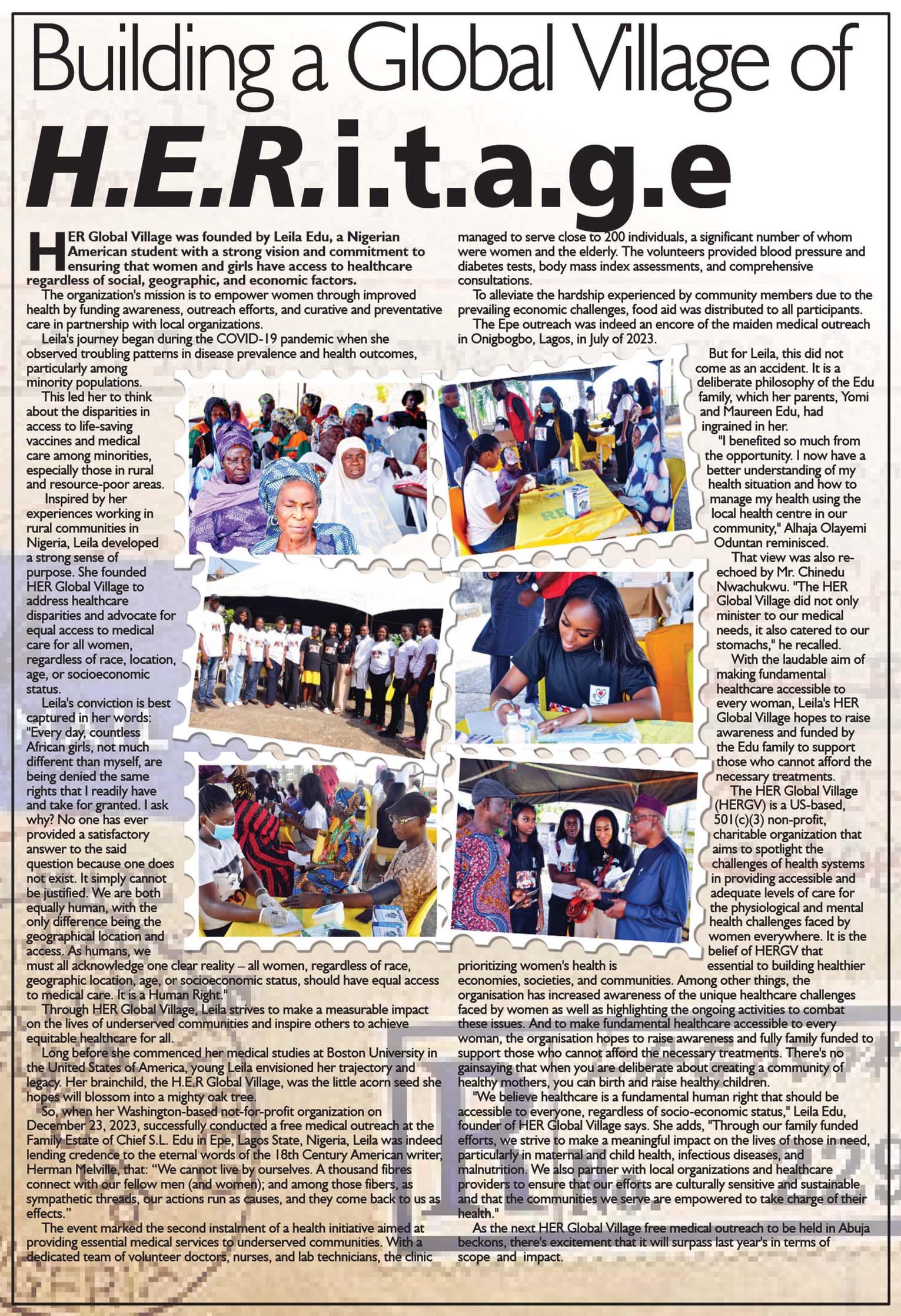
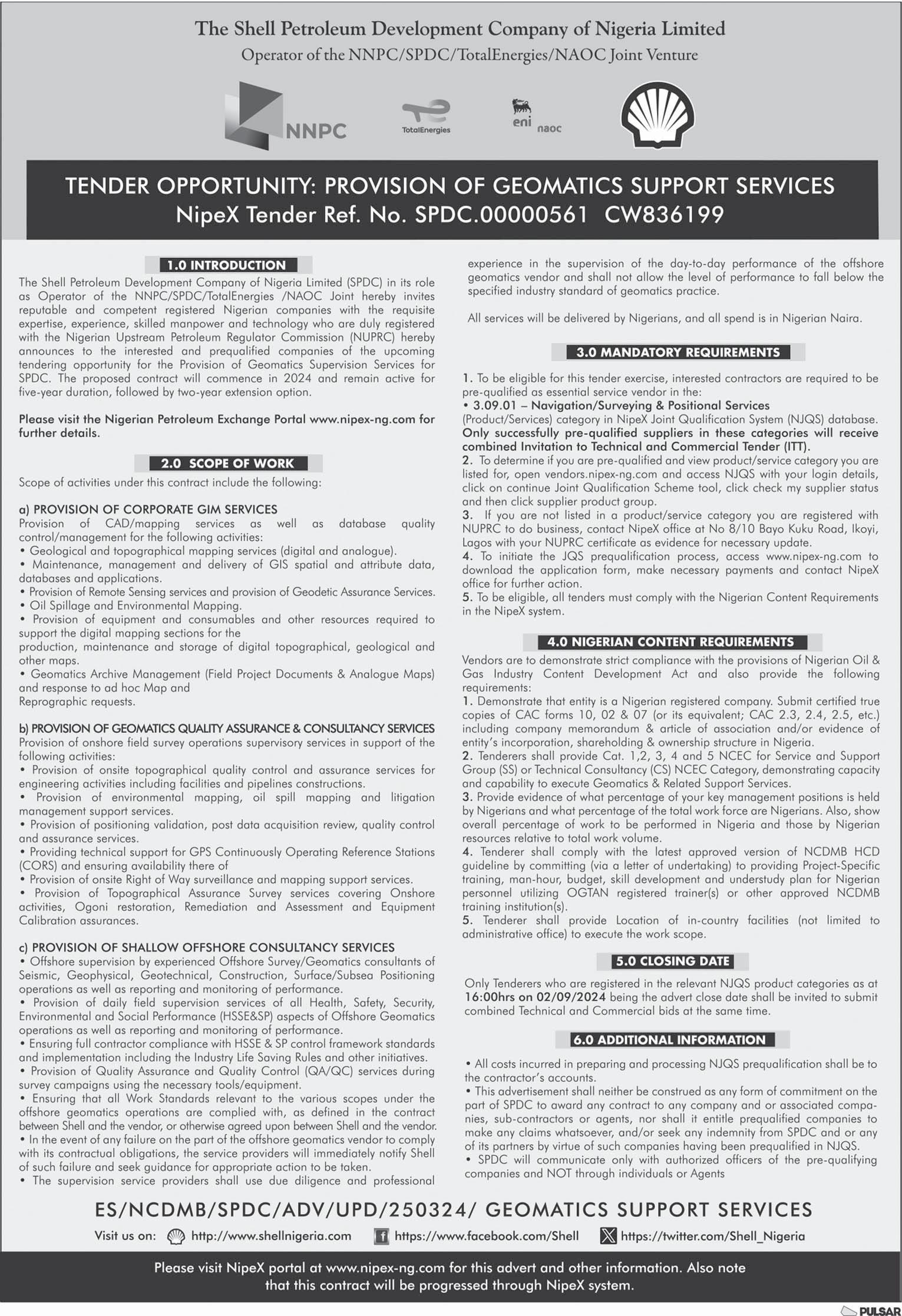
Email: deji.elumoye@thisdaylive.com
08033025611 SMS ONLY
The recent call by a group of Nigerian elites, led by elder statesman, Chief Emeka Anyaoku for a new constitution is coming at a time when what is most needed is a new Nigeria, away from the very hurtful country we have today, reports David-Chyddy Eleke.
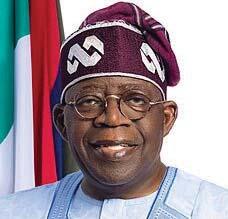
Last week, members of The Patriots, a group of eminent Nigerians led by a former Commonwealth SecretaryGeneral, Chief Emeka Anyaoku, met with President Bola Tinubu at the State House, Abuja and appealed to the President to send an executive bill to the National Assembly, proposing the convening of a National Constituent Assembly with the mandate to produce a draft of what they called the people’s democratic constitution.
Anyaoku while addressing Tinubu on the occasion said: “The constituent assembly should be of directly elected individuals, on a non-political basis, from the 36 states of the federation, possibly three individuals per state, and one from the FCT. They should be assisted by seven constitutional lawyers, one drawn from each of the six geo-political zones and the FCT. The deliberations of the constituent assembly should take into full account the 1960/63 constitutions, as well as the recommendations of the 2014 National Conference and indeed of the various national conferences that considered the Nigerian constitutions.
”The draft constitution, produced by the constituent assembly, should be put to a national referendum and if approved, should then be signed by the President as the genuine Nigerian people’s constitution. The Patriots had organised a well-attended colloquium in March 2024, where it was unanimously agreed that Nigeria needs a new people’s constitution. We have confidence in your ability to lead the constitutional transformation, considering your personal record as one of the greatest champions of Nigeria’s struggle for democracy,” the elder statesman told Tinubu.
Also speaking with reporters after the visit, Anyaoku explained that: “The Patriots are a nonpartisan group of eminent Nigerians, who are committed to the unity of our country and good governance of our country under a legitimate people’s democratic constitution. So we came to convey this view that Nigeria needs a people’s democratic constitution. We affirmed to Mr. President that Nigeria is a pluralistic country. And you all know that pluralistic countries exist all over the world. Those of them that addressed
their pluralism by having true federal constitutions have survived. Examples are India and Canada.”
This would not be the first time Anyaoku was expressing his deep love for Nigeria and how things can be put aright. Early this year when Anyaoku marked his 91st birthday he had advised about how Nigeria could manage its diversity, to avoid a break up. He marked the celebration with the inauguration of the Emeka and Bunmi Anyaoku Centre in Obosi, Anambra State, and in his speech he said the inauguration of the centre will be a hub of collaboration with universities, schools, institutes to promote studies in various areas, and it has enough materials to help leaders address the challenges posed by diversity.
Responding to the requests by The Patriots, Tinubu informed them that retooling the economy for sustainable growth and development was a major priority of his administration. The President also assured the group that their request for the convening of a national constituent assembly with a mandate to draft a new constitution would be reviewed. The President expressed his respect for The Patriots and their contributions to national discourse.
He said: “I have listened to you care-
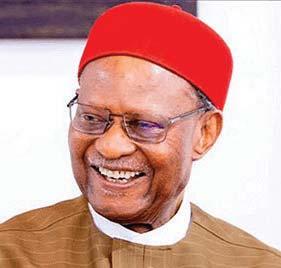
fully, and this is not a group that I can ignore. This is a group of patriots reflecting the heart and aspirations of society. I thank all of you for being here. I have faced the challenge of this democracy that I inherited from your struggles. I must recognise the fact that these challenges are most required for good governance. We have no other choice, and I also believe that it is most difficult to manage the twist and turns of democratic governance. I want to assure all of you that as I listened to your two major requests on the path to referendum, that should lead to constitutional measures that will fit our diversity and governance so that we avoid conflicts and break-ups.
”I believe in the unity of this country and I want to assure you that whatever is necessary to put happiness and good governance in the hands of all Nigerians is what I would do.
”The avoidance of chaos is necessary to build this country and move its aspirations forward for the benefit of all of us. I am currently preoccupied with economic reform. That is my first priority. Once this is in place, as soon as possible, I will look at other options, including constitutional review as recommended by you and other options,” the President said.
As germane as the demands of The Patriots may appear, there have been disagreements as to the urgency of the demand against the biting economic hardship in the country.
Some analysts have argued that the demand
As germane as the demands of The Patriots may appear, there have been disagreements as to the urgency of the demand against the biting economic hardship in the country. Some analysts have argued that the demand even though good, is not what the country needs at a time when youths are protesting about the hunger in the land. Others believe the constitutional conference convened by former president Goodluck Jonathan in 2014 should rather suffice, to avoid waste of funds.
even though good, is not what the country needs at a time when youths are protesting about the hunger in the land. Others believe the constitutional conference convened by former president Goodluck Jonathan in 2014 should rather suffice, to avoid waste of funds. In 2014, the national confab committee set up by former President Goodluck Jonathan had recommended that the country should return to the old national anthem. The former president had inaugurated the 492-member confab, headed by Idris Kutigi, a retired suprem court judge, to deliberate on the country’s political system. The committee which had been hailed as all encompassing had members from all spheres of life, and had made far reaching recommendations on how the fortunes of Nigeria could be turned around.
Successive presidents after Jonathan had ignored the recommendations of the committee, including Jonathan himself who failed to implement it.
Arespondent from Anambra state, Mr Chikezie Eze said: “I don’t know why they should be calling for new constitution at a time when Nigerians are talking of something as important as food. Their call may be okay, but what is most critical now should have been for The Patriots to speak to Tinubu and appeal to him about reversing fuel subsidy, cutting cost of governance and ameliorating the bitting hunger in the land. The poor people will not eat constitution.
“Also, they should have rather channeled energy in asking the president to start by implementing the recommendations of the 2014 national confab. You can not be telling him of a whole new constitution, when we have a draft document that is lying somewhere and gathering dust, that has not been implemented. It sounds Utopian to Tinubu to embark on a whole new constitution, when there are low hanging fruits that he can pluck, like the recommendations of the national confab. What is even the possibility that he would sign a new constitution into law, when there are others that have not been signed?
NOTE: Interested readers should continue in the online edition on www.thisdaylive.com
As the November 16, 2024 date for Ondo state gubernatorial election draws near, Fidelis David x-rays the preparation of the electoral umpire and candidates of the major political parties ahead of the electoral battle.
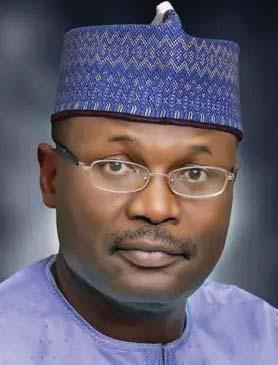
With three months to the governorship election in Ondo State, political activities in the coastal state is gathering more momentum.
Last week, the Independent National Electoral Commission released the final register of voters for the governorship poll.
The decision followed a meeting held by the commission, as contained in a statement signed by the National Commissioner and Chairman of the Information and Voter Education Committee, Sam Olumekun.
The new register incorporates new voters from the recent Continuous Voter Registration and includes successful applicants for transfers from other states to Ondo.
Specifically, Ondo State now has 2,053,061 registered voters, showing a 3.0 per cent increase over the 2023 general election figure of 1,991,344.
According to Olumekun: “Of these, 1,034,006 are male (50.36 per cent), and 1,018,964 are female (49.64 per cent). Youths aged 18 to 35 years make up 726,944 voters (35.41 percent), while the middle-aged group consists of 721,982 individuals (35.17 percent). Together, they represent 70.57 per cent of the registered voters in the state.
“In terms of occupation, 694,938 students constitute the majority of voters (33.85 per cent). There are 1,782 (0.09 per cent) PWDs. The new register represents a 3.0% increase over the 2023 General Election figure of 1,191,344”.
He further stated that the commission would release the timetable for the collection of Permanent Voters’ Cards for all categories of voters in both states, including new registrants, those who applied for transfers, replacements, and uncollected cards from previous registrations.
In his words: “In the next few days, the Commission will release the timetable for the collection of Permanent Voters’ Cards for the two States for all categories of voters including new registrants from the last CVR, voters that applied for transfers, replacements and uncollected cards from previous registrations”.
Seventeen political parties fielded candidates, but notably, no female candidates were among the lot.
The governorship candidates with their deputies include – All Progressives Congress, Lucky Aiyedatiwa and his deputy, Olayide Adelami; People’s Democratic Party, Agboola Ajayi, deputy, Samuel Ogunmusi; Accord Party, Ajibola Falaiye, deputy, Samuel lkuyajolu; Action Alliance, Omolere Akinuli, deputy, Oluwatosin Adeyemi; African Action Congress,
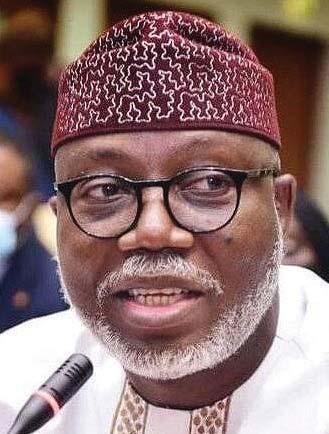

Oluwaseyi Ajayi, deputy, Abiodun Lijofi; All Progressive Grand Alliance, Olatunji Popoola, deputy, Ayorinde Adedeji, and Allied Peoples Movement, lsaac Ogunfeyimi, deputy, Arowolo Afolabi. Others include Action Peoples Party, Babatunde Fadoju, deputy, Olarewaju Ajagunna; African Democratic Congress, Adeyemi Nejo, deputy, Rasheed Ibrahim; Labour Party, Ayodele Olorunfemi, deputy, Olabisi Adu; New Nigeria People’s Party, Oluwatosin Ayeni, deputy, Abike Omoyugbo; and Peoples Redemption Party, Babatunde Alli, deputy, Olusegun Famesa. Others are Social Democratic Party, Olusegun Oyebolu, deputy, Gift Dada; Young Progressives Party, Otitoloju Akinmurele, deputy, Ayodele Obe; Youth Party, Kehinde Adegoke, deputy, Otitoleke Olupitan; and Zenith Labour Party, Abbas Mimiko, deputy, Opeyemi Fadoju.
Parties Preparation
Political parties and their flag bearers in the last few months have been holding meetings, with stakeholders and citizens to get their support and votes.
While the All Progressives Congress (APC) which is the ruling party in the state is trying to ensure the incumbent Governor Lucky Aiyedatiwa is reelected after completing the tenure of the late governor Oluwarotimi Akeredolu, stakeholders in the major opposition party, Peoples Democratic Party (PDP) and other political parties are strategising on how to defeat Aiyedatiwa.
But, Aiyedatiwa has repeatedly declared that there was no vacancy in the Ondo State Government House as he remains the candidate to beat.
Putting Issues of Last Primary Election Behind In what could be described as a boost
for the party, members of the state APC Caucus in the House of Representatives last week pledged their total support for Governor Aiyedatiwa ahead of the gubernatorial poll.
The eight members of the caucus said they have resolved to put the issues of the last primary election behind in order to unite behind the Governor to ensure victory in the governorship election.
The caucus, represented by four of the eight members, announced their support during a courtesy visit to the Governor at the Presidential Lodge of the Government House in Akure, the state capital.
They are Hon. Timehin Adelegbe (Owo/ Ose), Hon. Gboyega Adefarati (Akoko South West/Akoko South East), Hon. Festus Adefiranye (Ile-oluji-Okeigbo/Odigbo) and Hon. Jimi Odimayo (Okitipupa/Irele).
The other four members, Hon. Donald Ojogo (Ilaje/Ese-Odo), Hon. Abiola Makinde (Ondo East/Ondo West), Hon. Derin Adesida (Akure South/Akure North) and Hon. Ife Ehindero (Akoko North West/Akoko North East), who were absent, sent their words of support to the Governor.
Speaking on behalf of the group, Hon Adelegbe said the visit was to erase any doubt on whether or not the members of the National Assembly are fully supporting the Governor in the coming election.
According to him, members of the caucus have resolved to mobilise grassroots support and votes for Governor Aiyedatiwa in the election to make his victory a landslide.
Chairman of the APC in the State, Ade Adetimehin, while speaking on the occasion said the development promotes unity and will strengthen the party in the State ahead of the November governorship election.
The candidate of the PDP in the coming governorship poll in the Sunshine state, Agboola Ajayi believes that it’s time to rescue the state from the misgovernance of APC.
The former deputy governor had said he’s in
Political analysts believe Governor Aiyedatiwa understands well the power Mimiko possesses, having forged a surprising alliance with him despite belonging to different political parties. This cross-party collaboration has, however, raised eyebrows and sparked discussions about its implications for the politics of the coastal state vis-a-vis the November 16, 2024 governorship poll.
the race to become the next governor because of his vision for the State’s economic transformation and inclusive, sustainable growth.
Corroborating Ajayi, former Vice Chairman (South-West) of the Peoples Democratic Party (PDP), and the current Zonal Liaison Desk Officer of the party in the Southwest, Dr. Eddy Olafeso, described the former deputy governor as personality who is unwavering, tenacious, persistent, persevering and never giving up. According to him: “It not about your size or your height, it’s’ about what is in your heart. When you’re fearless, you can conquer the world and that’s what Agboola Ajayi represents. We were very open in our primary. Our own Congress is not the type that is written in the space even without an election.”
Olafeso who said agriculture remains at the centre of Nigeria’s national identity said the APC government, particularly in Ondo State can hardly be said to have made farming a priority.
He ssid: “I am a farmer but I can now say that I was a farmer because I didn’t plant this season. I requested and begged for a tractor which I’m going to be paying N90,000 per hectare but I couldn’t get any till now. That means, there is no aganda for people in the agricultural sector, which means there is no aganda for people in small businesses.
“We will hold APC accountable for all the monies that came in all the years Akeredolu was elected till this moment. When he took over the state it was more or less like a cesspool of scandal with money flying out by signature, flying in by signature and everything just slept in the hands of whoever cares to be a criminal.”
The PDP chieftain added that, “the criminality in government must be fought. And you see, you look at our faces and ask why are these old men think they can fight? Yes, we may not be able to make 100 meters in 20 seconds but the truth is that our head is as clear as when we were 18 years old.”
However, it is worthy to note that both Ajayi and Aiyedatiwa are from the southern senatorial district of the state. The former is from Ese-Odo while the latter is from Ilaje local government areas.
Olugbenga Edema, a Night Mare for Arch Rivals?
The candidate of the New Nigeria Peoples Party (NNPP) for the election, Olugbenga Edema has also been a threat to APC and PDP ahead of the poll.
Group Features Editor: Chiemelie Ezeobi
Email: chiemelie.ezeobi@thisdaylive.com, 07010510430
To enhance the operational efficiency of its personnel, the Nigerian Navy recently held a seminar. Organised by the Accounts and Budget branch, it was a multi-faceted forum that was tailored to optimise its non-public fund opportunities in a dynamic environment. But beyond this, Chiemelie Ezeobi writes that it provided an opportunity to unveil the comprehensive welfare schemes, including housing policies for personnel, whether serving, retired or deceased
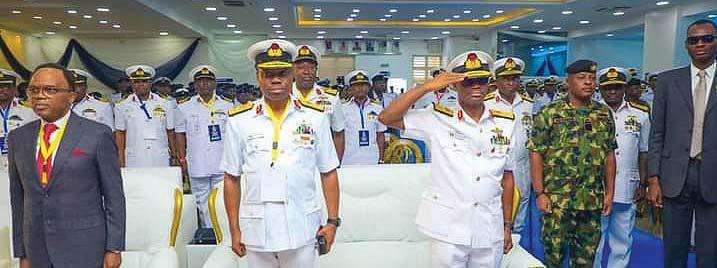
L-R: Keynote Speaker and former Chief of Accounts and Budget, Rear Admiral KO Komolafe (Rtd); Chief of Accounts and Budget (CAB), Rear Admiral Omotola Olukoya; Chief of Policy and Plans Naval Headquarters, Rear Admiral Joseph Daniel Akpan, who represented the Chief of the Naval Staff (CNS), Vice Admiral Emmanuel Ikechukwu Ogalla; Admiral Superintendent Naval Dockyard, Rear Admiral Abolaji Orederu; FOC Western Naval Command, Rear Admiral Mustapha Hassan; and Rear Admiral HD Zakaria, FOC Naval Doctrine Command
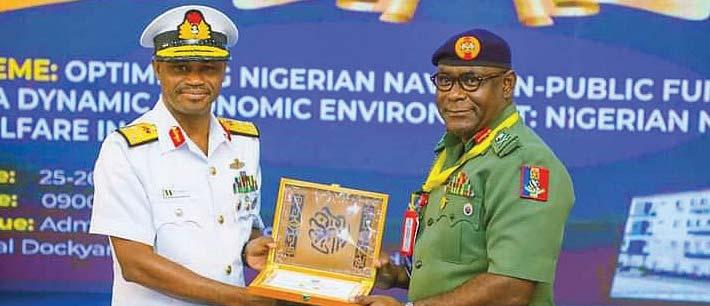
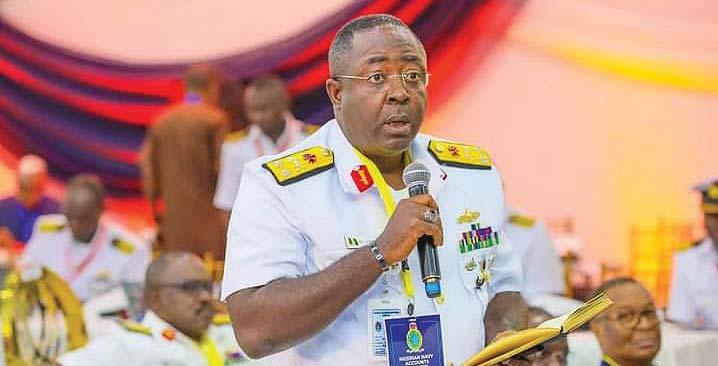
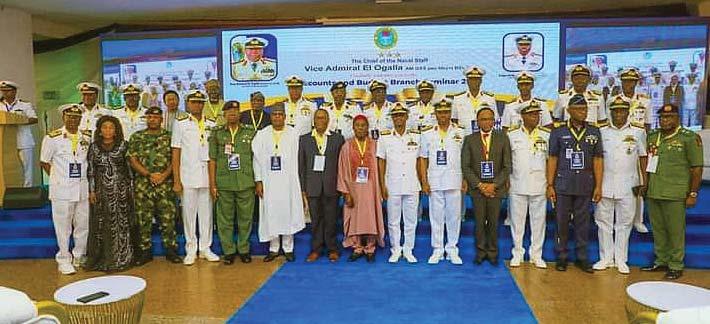
Rear Admiral Akpan presenting a plaque to Nigerian Army Chief of Accounts and Budget, Major General Adetokunbo Fayemiwo Group photograph of participants of the
When the doors of the Admiralty Conference Centre, Naval Dockyard, Victoria Island, Lagos, opened on a certain Thursday in July, the participants of the 2024 Nigerian Navy (NN) Accounts and Budget (A&B) Seminar didn’t know exactly what to expect other than how the NN intends to improve on the welfare of its personnel.
Soon enough, the agenda became clearer as speaker upon speaker elucidated the plans and measures that would enhance welfare in a bid to achieve optimal output efficiency.
Themed “Optimising Nigerian Navy Non-Public Fund Opportunities in a Dynamic Economic Environment: Nigerian Navy Personnel in Focus”, the seminar served as an avenue to reiterate the NN’s commitment to enhancing personnel welfare through innovative funding strategies.
The second in the series after the maiden edition in 2012, the seminar drew participants from top members of the Armed Forces accounts and budget departments, senior military officers, financial institutions, and personnel from the NN A&B branch, as well as retired officers.
The day one of the seminar set the tone for what the forum portends. While reiterating the need for capacity building of Nigerian Navy Accounts and Budget personnel, the Chief of the Naval Staff (CNS), Vice Admiral Emmanuel Ikechukwu Ogalla, said the seminar was a step in the right direction.
Ogalla, who was represented by the Chief of Policy and Plans Naval Headquarters, Rear Admiral Joseph Daniel Akpan, commended the Chief of Accounts and Budget (CAB), Rear Admiral Omotola Olukoya for understanding the importance of building capacity for the men overseeing the financial aspect of the NN.
Looking Inwards to Leverage Non-public
Funds for the NN
Necessitated by the challenge of a lean purse, the NN had to start looking inwards to generate income to take care of its personnel other than relying solely on the defence budget given that it was no longer enough to support its personnel.
This much was covered by Rear Admiral KO Komolafe (Rtd), a former Chief of Accounts and Budget, when he delivered the keynote paper titled “Non-Public Fund Opportunities and Personnel Welfare: Imperatives for the Nigerian Navy”.
Not done, three other strategic sessions also focused on financial imperatives leveraging non-public fund entities in the NN and how to generate such non-public funds to boost personnel welfare.
Also speaking, Vice Admiral Ogalla, emphasised that optimising non-public funds is crucial for improving welfare of naval personnel, thereby enhancing operational efficiency.
"The welfare of our personnel is fundamental to our operational success," Ogalla stated. "By leveraging non-public funds, we aim to improve living standards, retain skilled personnel, and ensure a resilient and capable naval force”.
The CNS called for innovative strategies to generate funds independently from government budgetary allocations. "With shrinking government budgets, it is imperative that we look inward to develop alternative funding sources. This will enable us to better support our personnel and ensure operational effectiveness."
Not done, he said the NN will continue to support the families of naval personnel through the Naval Officers Wives Association (NOWA) and the Ratings Wives Association as these “organisations play a crucial role in providing support to the
families of our personnel, especially those who have fallen in the line of duty”.
Expanding Welfare Schemes for the NN
Already, the Nigerian Navy operates some schemes to enhance the welfare of its personnel like navy insurance, car refurbishing loan and welfare loan schemes.
Managed by the Directorate of Non-public Funds, the CNS said the NN will expand these welfare schemes, adding that "we are committed to enhancing these initiatives to provide better support for our personnel and their families”.
Pension Increment, Housing
One of the welfare measures brought to the front burner was the 20 per cent pension Increment for the Armed Forces by President Bola Ahmed Tinubu, which took effect from January this year.
While expressing the gratitude of the service to the president for his unwavering support in prioritising the welfare of Armed Forces personnel, Vice Admiral Ogalla said “the approval of a 20 per cent increase in pension rates is a testament to his commitment to our welfare”.
Another challenge that has constantly proved a challenge for the Armed Forces is the issue of adequate housing. On this, the CNS highlighted ongoing efforts to improve housing and other welfare aspects for naval personnel.
"Over 300 new housing units have been provided, and various palliatives have been given to our personnel. These initiatives are part of our broader strategy to improve the living standards and well-being of our naval force."
The military is one service that never leaves anyone hanging and this much was reiterated by the CNS. For the retirees, he said: “The Navy is also focused on preparing personnel for retirement and ensuring their well-being post-service. Recent increases in pension rates
and other benefits reflect our commitment to supporting our retirees. We will continue to develop policies that ensure the welfare of both serving and retired personnel."
But even with the available funds, Ogalla stressed the need for transparency, accountability and continuous evaluation in the management of these schemes to meet the needs of the personnel. Underscoring the need for transparency and accountability in managing non-public funds he said: “We must ensure that these funds are managed effectively to meet the evolving needs of our personnel. Continuous evaluation and transparency are essential to this process."
The second day, which marked the end of the seminar, strategy sessions featured presentations by the Managing Directors of the Naval Dockyard Ltd and Admiralty Exchange Ltd as well as the Director of Medical Services and they were geared towards eliciting innovative solutions for addressing the numerous identified welfare confronting NN personnel from the perspectives of engineering, healthcare and consumer goods under the current economic realities.
During another session, the Managing Directors of the Federal Mortgage Bank (FMB) and Naval Building and Construction Company Ltd proffered workable strategies for affordable barracks construction and post-service housing delivery to Naval personnel and other stakeholders. Beyond the lectures, it is expected that the discourse yield actionable insights and innovative solutions to enhance the Navy's operational effectiveness and the well-being of its personnel. This much was agreed by the CNS who pledged that they will “ continue to prioritise the welfare of our personnel, ensuring a capable and resilient naval force ready to protect our maritime environment and contribute to our nation's economic prosperity”.
AS AT AUGUST 9,2024
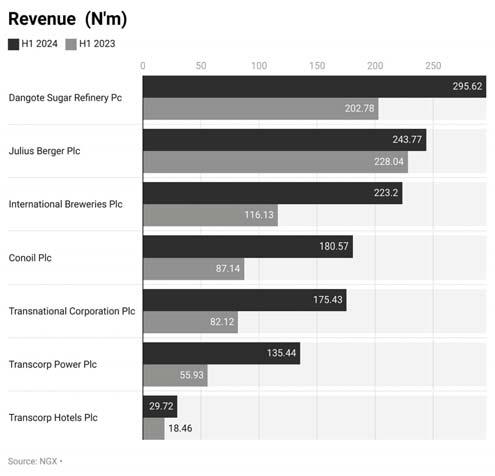
Kayode Tokede
Dangote Cement Plc and 22 other firms defied macro economic challenges to generate about N8.11 trillion revenue in the half year (H1) ended June 2024, about 68 per cent increase when compared to N4.83 trillion reported in the corresponding period of 2023.
The other 22 firms are made up of telecommunication, agroallied, cement manufacturing, power generating, oil & gas, Fast-Moving Consumer Goods (FMCG) companies, among others.
An independent investigation by THISDAY revealed that the firms grew revenue significantly amid a double-digit inflation rate that has led to a hike in cost of food and services across the country.
But the cost of operation and foreign exchange loss weaken profit generation and posed a threat on their 2024 financial result and accounts.
Companies operating in Nigeria have been bedevilled by low purchasing power amid hike inflation that spread across Africa, weakened naira, insecurity and bad road networks that prolonged delivery of goods and services across the country.
In the period under review, Dangote Cement followed by MTN Nigeria Communication Plc and BUA Foods Plc topped others in revenue generation.
The breakdown showed that Dangote Cement reported revenue of about N1.76 trillion in H1 2024, about 85 per cent increase from N950.83 billion reported in H1 2023, while MTN Nigeria reported N1.54 trillion revenue in H1 2023, representing an increase of 33 per cent from N1.16 trillion in H1 2023.
Commenting on the results, the Chief Executive Officer, Dangote Cement, Arvind Pathak in a statement said: “We effectively navigated macroeconomic
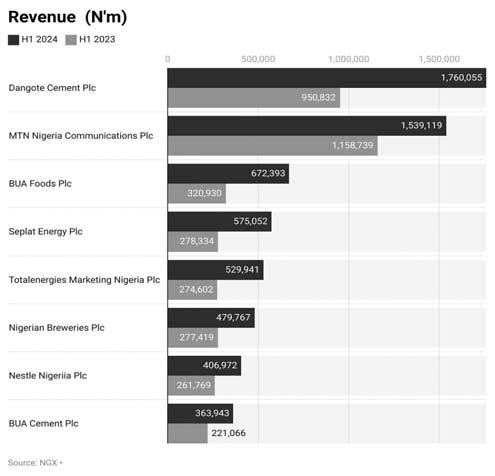
headwinds to deliver positive results in the first half of the year. Group volumes were up 3.8 per cent, with our Nigeria operations achieving double-digit volume growth of 10.9 per cent. This growth was driven by improved efficiency across our operations and supported by increased market activity levels compared to the election year and cash crunch in 2023.
“Despite the challenges of elevated inflation, high borrowing cost and a further weakening of the currency in the first six months of the year, our business demonstrated strong resilience. This was due to our rigorous focus on cost minimisation and our diversified business model.
“Group revenue and EBITDA rose 85.1per cent and 50.3per cent to N1,760.1 billion and N666.2 billion, respectively. Our PAT reached N1,89.9 billion, marking a 6.3 per cent increase. I am pleased with the performance of our business, as
key financial indicators are showing positive trends.
“By leveraging our robust export-to-import strategy, Dangote Cement completed 14 shipments of clinker from Nigeria to Ghana and Cameroon. This effort resulted in a 55.2per cent surge in our Nigerian exports, underscoring our commitment to fostering African self-sufficiency.”
For MTN Nigeria, the CEO of the telecommunication giant, Mr. Karl Toriola stated that the H1 2024 results underlined operating performance despite macro headwinds and foreign currency impacts.
“The macroeconomic conditions in Nigeria have been challenging during the period. The country has been dealing with rising inflation and the continued depreciation of the naira against the dollar and other currencies. The inflation rate reached 34.2 per cent in the month of June, with an average rate of 32.8 per cent in the first half of the year,
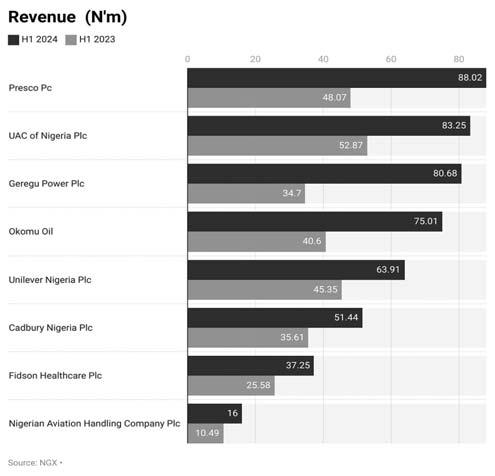
while the naira closed June 2024 at N1,505/Dollar (December 2023: N907/$) at the Nigerian Autonomous Foreign Exchange Market (NAFEM). However, we are encouraged by the improving liquidity n the foreign exchange in the period which enabled us to reduce our exposure to foreign currency-denominated obligations,” he said.
In its part, BUA Foods declared N672.39 billon revenue in H1 2024, a growth of 109.5 per cent from N320.93 billion reported in H1 2023.
The company attributed increase in revenue to a to a y-o-y increase of 88 per cent in Sugar sales to N369.7 billion (H1 2023: N196.5 billion), 164 per cent in Flour sales to N227.9 billion (H1 2023: N86.05 billion), and 95per cent in Pasta sales to N74.03 billion (H1 2023: N37.9 billion).
The Managing Director, BUA Foods, Ayodele Abioye said: “The first half of the year has been one of significant resilience and achievements for our company. We attained a robust financial
performance, with total revenue increasing by 110per cent to N672.3 billion compared to the same period last year. Our gross profit stands at N218.4 billion, reflecting a growth of 64per cent. This solid performance is a testament to the efficacy of our strategic initiatives, operational efficiency, and unwavering dedication of our board, management, and other members of staff.
“During this period, we have made significant strides in executing our strategic plans, successfully launching new products, specifically, macaroni, premium pasta and semolina to meet the yearnings of our customers Our diversified portfolio and expansion into new markets impacted revenue growth while strengthening our partnership with key stakeholders. We also maintained a strong focus on cost optimization, resulting in sustained margins and profitability.”
A report by Doctors Without Borders/ Médecins Sans Frontières (MSF), has revealed an extraordinary surge in severe malnutrition cases in Bauchi State, recording 23,000 cases between January and June this year—a staggering 120 per cent increase compared to the same period last year.
The organisation also noted a 40 per cent increase in overall malnutrition across the country, warning that without immediate intervention, the situation could become disastrous.
MSF’s medical coordinator, Thierry Boyom, highlighted that while poverty remains a primary driver of malnutrition, other factors are exacerbating the crisis.
“From the feedback we received, many people are struggling with the significant increase in food prices compared to last year, making it difficult for them to afford three meals a day,” Boyom explained.
He also cited the lack of access to healthcare and clean water, poorly functioning health facilities due to inadequate supplies, poor infantfeeding practices, and low vaccination
coverage, particularly in Bauchi, as significant contributors to the crisis. Diseases like measles, which thrive in low-vaccination areas, are a major factor in worsening malnutrition.
MSF has been actively responding to the malnutrition crisis in Bauchi since 2022, but the situation is overwhelming the organization’s resources. Their treatment centers and personnel are stretched thin as they struggle to accommodate more sick children.
Nigeria faces one of the highest burdens of growth-stunted children globally, with malnutrition being the
direct or underlying cause of 45 per cent of all deaths in children under the age of 5, according to UNICEF.
The country’s ongoing conflict with armed gangs, who often kidnap farmers and disrupt food production, coupled with general insecurity and rising food prices, has further hindered vulnerable populations from accessing adequate nutrition. The situation is particularly dire during July and August, known as the peak of the lean season, when food from previous harvests runs out.
Bauchi State’s Nutrition Officer, Abubakar Saleh, stated that authorities
are working to reduce the number of malnourished children through various initiatives.
These include scaling up micronutrient supplementation for pregnant mothers to prevent malnutrition from the womb, interventions supported by USAIDUkraine for managing severe acute malnutrition, and maternal, newborn, and child health campaigns that screen children for malnutrition.
In a bid to bridge gaps in healthcare access, MSF recently launched a community-based intervention called Integrated
Community Case Management in eight villages, training local women to detect and manage malnutrition early.
“They were trained to identify malnutrition, recognize signs of severity or medical complications, and manage simple cases of malnutrition on the spot,” Boyom said. “Additionally, they were trained to manage malaria.”
Despite these efforts, Boyom stressed that unless insecurity is addressed and more funding is allocated to support the vulnerable, many more children will continue to struggle for survival.

L-R: Head, Competence Centre Agribusiness, Delegation of German Industry and Commerce in Nigeria, Mr. Sabestian Glaeser; Head, Component and Capacity Development, German Cooperation for International Development, GIZ, Nigeria, Ms. Sharon Kaburuk; Managing Director, Siemen Energy Nigeria, Mr. Seun Suleiman; governor of Enugu State, Dr. Peter Mbah; Consul General, German Missions in Nigeria, Mr. Weert Börner; the Programme Manager, Technical and Vocational Education and Training (TVET), GIZ Nigeria, Ms. Britta van Erckelens and the Secretary to Enugu State Government, Prof. Chidiebere Onyia, during a visit to Governor Mbah by a German delegation at the Government House, Enugu… recently
Oluchi Chibuzor
The government of Germany has expressed its eagerness to strengthen economic cooperation with the government and people of Enugu State, especially in the areas of agriculture, energy, trade and investment.
The industrial giant said that it chose Enugu State as one of its three business and investment destinations in the entire southern Nigeria given its findings on improved ease-ofdoing-business under the Dr. Peter Mbah administration and affirmation by the Nigerian media.
The German government spoke through its Consul General, Mr. Weert Börner, who led a delegation of the German business community and the German Corporation for International Cooperation, GIZ, on a working visit to Governor Peter Mbah at Government House, Enugu. Börner said the visit was in continuation of discussions that started in Lagos in 2023 on increasing German cooperation with Enugu State in the aforementioned sectors.
“So, I am very happy to be here in Enugu city to increase and deepen our conversation on this cooperation. I am also very happy that the delegation with me is comprised of representatives of the DHK (Deutsche
Handels Kompetenz), which is our chamber in Lagos for industry and commerce; GIZ, our international cooperation agency and Siemens Energy, a private company that is already doing a lot in Nigeria to improve electricity and energy sector.
“We get a lot of news by the Nigerian media and through our own office that Enugu State and its own government have improved a lot in the sense of structuring process to get business easier done to improve the infrastructural basis for joint engagement.
“We are actually very happy about this development. The German government decided to concentrate more on specific states within the Nigerian federal system. And those states from the south are Ogun, Abia, and Enugu State. So, this is why I am here to get our cooperation on a higher and more intense level,” the envoy stated.
While appreciating the Germans for choosing Enugu State as one of their economic partners, Governor Peter Mbah said his administration was very ready and willing to partner with German government and businesses.
Mbah emphasised that the $30billion GDP target his administration set for itself, though high, was realisable through private
“Bbb” Rating Affirmed by Agusto & Co
Nume Ekeghe
Parthian Partners Limited (PPL) has once again had its ‘Bbb’ rating affirmed with a stable outlook for the year 2024/2025. This reaffirmation was announced by the Pan-African credit rating firm Agusto & Co Limited in a recent statement.
Parthian Partners Limited (PPL) has maintained its ‘Bbb’ rating with a stable outlook for the 2024/2025 fiscal year, as confirmed by PanAfrican credit rating agency Agusto & Co Limited
According to the statement, by Agusto &co., “The rating reflects PPL’s good profitability, acceptable asset quality, and competent management team that has begun to implement the plan to transition to a full-service investment banking group. However, the rating is constrained by higher funding
costs due to the current elevated interest rate environment and the cyclical nature of the inter-dealer broker (IDB) business, which is volume-driven. Additionally, the eroding business landscape for IDBs globally and in Nigeria also constrains the rating.”
Speaking on this development, the Chief Executive Officer and Managing Director of Parthian Partners, Mr. Oluseye Olusoga, expressed satisfaction with the rating, which aligns with the company’s current expansion drive, robust earnings potential, and wealth of experience of the management team. Olusoga said: “The affirmation of Parthian’s rating by Agusto & Co lends credence to the effectiveness of our business strategy and our capacity to continue playing our part in improving liquidity in African markets.”
sector investments and international cooperation, adding also that Nigeria’s much-needed economic growth could only come from the states, not the centre.
“I want to put on record our deep appreciation to you for selecting
Enugu as one of the three southern states you want to partner with. We are really excited about this essentially because though we are subnational, our ambition and the goals we have set for ourselves are national in scale.
“We plan to grow the economy to a point that is unprecedented. If you look at the target, we set for ourselves to grow the economy from $4.4bn to $30bn in the next seven years. It appears too ambitious because you are talking about a sevenfold
growth and you are looking at a compounded annual growth rate of 27 per cent, but we think it is realisable because we are looking at unlocking a lot of the economic potentials of the state that have not been touched,” he said.
Kayode Tokede
The Chinese Consul General in Lagos, Ms Yan Yuqing, has expressed confidence that China and Nigeria would make greater contributions to the world on the road to peaceful development of modernisation.
Yuqing stated that China and Nigeria would work together to deepen, expand exchanges and cooperation in various fields, adding that the two countries would make new and greater contributions to the building of a high-level community with a shared future for Africa and for mankind.
The Chinese Consul General made this known in a paper tittled, “Future Deepening Reform Comprehensively to Advance Chinese Modernization Building a High-level China-Africa and China-Nigeria Community with a Shared Future” delivered recently. She said, “In the communique of the Third Plenary Session of the 20th CPC Central Committee, reform and opening up, development, people and Chinese modernization have once again become high-frequency hot words.
“Through these words, the international community can see that China is gathering its strength to forge ahead steadily,
pioneering and innovative, open and confident. It is more optimistic about the huge potential of China’s economic and social development, and hopes that China’s high-quality development will bring more opportunities to the world.
“This plenary session demonstrates China’s firm conviction to carry out reform and opening-up in the new era to the end. The reform theme of this plenary session is clear, It was stated in the Resolution that to further deepening reform comprehensively, we must implement 6 principles of upholding the Party’s overall leadership, taking a people-centered
approach, upholding fundamental principles and breaking new ground, taking institution building as our main task, exercising lawbased governance on all fronts, and applying systems thinking.” Yuqing added, “We must remain committed to the basic state policy of opening to the outside world and continue to promote reform through opening up. Leveraging the strength of China’s enormous market, we will enhance our capacity for opening up while expanding cooperation with other countries and develop new institutions for a higher-standard open economy.”
Nume Ekeghe
Union Bank, has received another significant recognition with its recent attainment of the Payment Card Industry Data Security Standard (PCIDSS) version 4.0 certification.
The bank in a statement noted that this notable achievement, which is an upgrade from the previously awarded Payment Card Industry Data Security Standard (PCIDSS) version 3.2, recognises
the Bank’s adherence to the highest data security standards and diligent compliance with industry guidelines regarding payment card fraud prevention and reduction in unauthorised card usage.
The PCI-DSS is the premier Information Security standard for payment cards. It aims to improve the controls of cardholder data and related payment systems to reduce unauthorised use and fraud.
Commenting on the Bank’s latest attainment, Chief Information Security Officer at Union Bank, Francis Mojoyinola, said: “Union Bank is delighted that we have again been acknowledged for the considerable work we have put into attaining better controls and card payment standards. This certification once again demonstrates our ability to provide top-of-the-line
cybersecurity standards and solutions that help us manage and reduce risk exposure. All of this could not have been achieved without the Bank’s collaborative, dedicated, and competent team of IT and data security experts. Our esteemed customers will continue to be our focus as we strive to build a secure data security structure that enables safe, simpler, and straightforward innovative banking services.”
Emma Okonji
Sophos, a global leader of innovative security solutions for defeating cyberattacks, has released a new dark web report, tagged, ‘Turning the Screws: The Pressure Tactics of Ransomware Gangs’, which details how cybercriminals are weaponising stolen data to increase pressure on targets who refuse to pay ransom.
This, according to the report, includes sharing the contact details or doxing the family members of targeted CEOs and business owners, as well as threatening to report any information about illegal business activities uncovered in stolen data to the authorities.
In the report, Sophos X-Ops shares posts found on the dark web that show how ransomware gangs refer to their targets as ‘irresponsible
and negligent’, and in some cases, encourage individual victims whose personal information was stolen to pursue litigation against their employer.
Analysing the report, Director, Threat Research at Sophos, Christopher Budd, said: “In December 2023, in the wake of the MGM casino breach, Sophos began taking note of ransomware gangs’ propensity to turn the media
into a tool they can use to not only increase pressure on their victims but take control of the narrative and shift the blame. We are also seeing gangs singling out the business leaders they deem ‘responsible’ for the ransomware attack at the companies they target. In one post we found, the attackers published a photo of a business owner with devil horns, along with their social security number.”
Apart from dismantling obstacles to trade and prioritising efficiency in service delivery as the bedrock of trade facilitation, Wale Adeniyi has surpassed revenue generation target by a huge margin, writes Eromosele Abiodun
On June 27, 2023 when he took over the helm of affairs at the Nigeria Customs Service (NCS) as the Comptroller-General, Mr. Basir Adewale Adeniyi, promised to dismantle obstacles to trade and prioritise efficiency in service delivery and as the bedrock of trade facilitation and revenue generation.
According to him, “No longer shall encumbrances impede trade - we shall dismantle obstacles and foster a new culture of consultations and compliance.”
Also promising to prioritise staff welfare and training, Adeniyi said his administration would work diligently to implement career advancement opportunities approved by the board, and ensure that competence remained the sole criterion for assigning responsibilities and measuring effectiveness.
Speaking shortly after he officially took over from the erstwhile CG, Col. Ahmed Ali (Rtd) who led the service for about seven and a half years, Adeniyi also promised to adopt a bottom-up approach, where the needs of the country would take precedence over everything else.
He said he remained humbled and honoured by the trust placed in him by President, Bola Tinubu, describing it as a call to duty that signifies a great responsibility to serve the nation as trade facilitators and enforcers of government policy.
He acknowledged that the task was a delicate balancing act that demands professionalism, integrity, and the highest ethical standards.
Adeniyi said in order to achieve set objectives; it was crucial to bridge the current human resource gap within the service ranks.
He promised to build on the successes of his predecessors whom he said had set the service on the pedestal of modernisation through various policy reforms.
He said, “Our focus is on cultivating a highly skilled workforce that is equipped to face the challenges of a rapidly changing world.
“Staff welfare is of paramount importance to us. We acknowledge the harsh and hostile environment in which our officers and men are compelled to function. Therefore, we commit ourselves to prioritise the welfare and well being of our personnel.
“By providing better remunerations, improved accommodation, life insurance, and quality healthcare, we aim to create an environment that supports and motivates our workforce. We understand that a well-motivated team is instrumental in achieving our aims and objectives.”
For those who were not familiar with the promises made by Adeniyi on assumption of office, the above highlights may suffice. Looking back, one can now see the wisdom behind the appointment of Adeniyi as NCS boss. Apart from transforming the service operational wise, Adeniyi has also recorded stellar performance in revenue generation.
Recently, the Nigeria Customs Service disclosed that it generated N2.74 trillion in the first half of 2024, surpassing the N2.54 trillion target by eight per cent.
The performance also represented a 127 per cent increase over the previous year’s revenue.
The service collected N1.39 trillion in the second quarter of the year, exceeding the quarterly target by 10 per cent and 131 per cent increase over Q2 2023.
In a statement, Chief Superintendent of Customs/ National Public Relations Officer, Abdullahi Maiwada, attributed the positive performance to initiatives including the e-auction platform, which generated over N1.34 billion, and the 90-day duty payment window for uncustomed vehicles which raked in N4.37 billion.
He said these measures have significantly enhanced transparency, compliance, and efficiency in customs processes, underscoring its commitment to excellence.
The statement added that the service intensified its anti-smuggling operations in Q1 2024, resulting in notable achievements.
Maiwada said, “From January to June 2024, the NCS made 2,442 seizures with a Duty Paid Value (DPV) of NGN 25,520,652,942.87, which is 203 per cent higher than the DPV of seizures in the first half of 2023.
“In the second quarter of 2024, the NCS
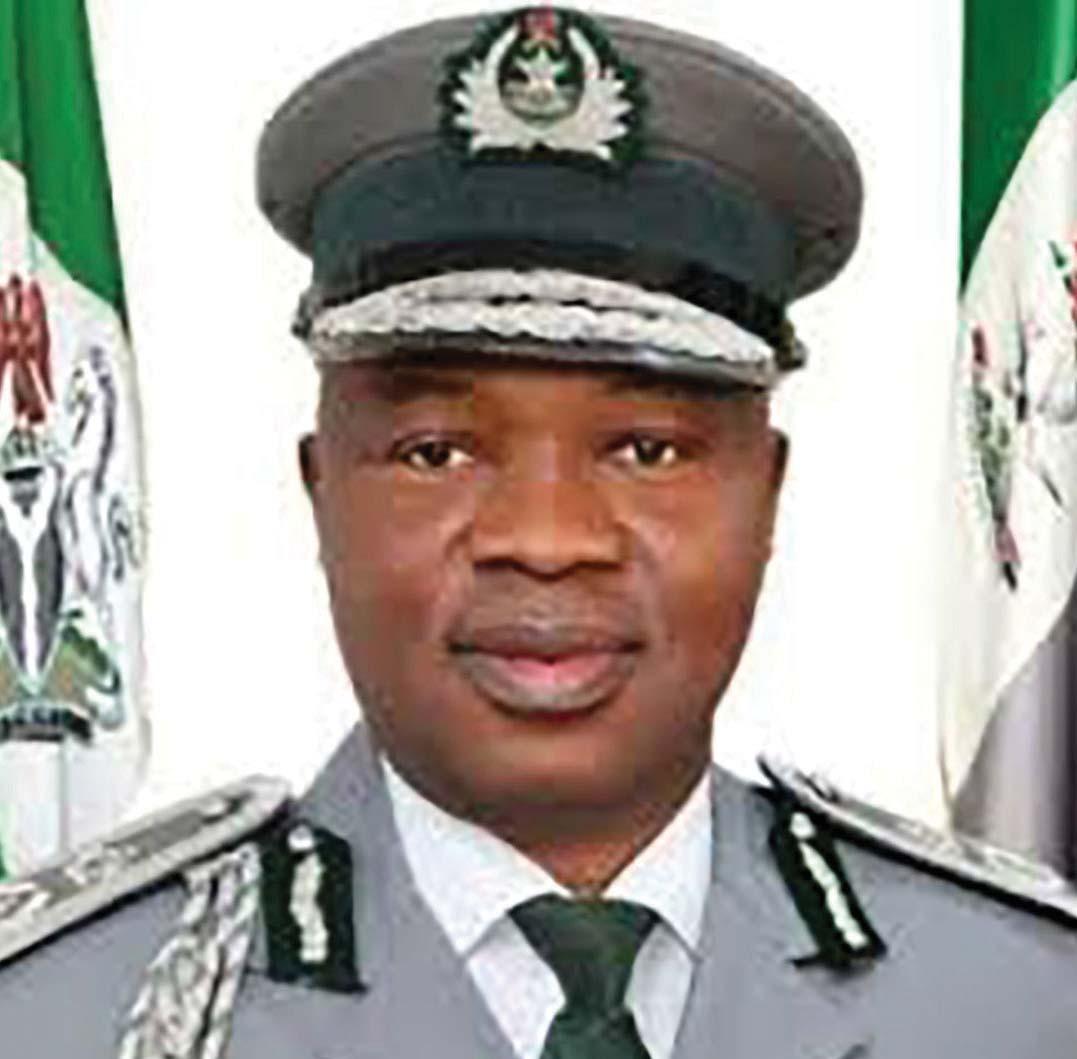
made 1,334 seizures with a DPV of NGN 17,564,384,378, representing a 121 per cent increase over the first quarter of 2024.
“The top items seized include wildlife items, vehicles, arms and ammunition, foreign rice, pharmaceuticals, and narcotics, with 32 suspects in custody. “
He said trade facilitation remained a core priority for the NCS, stating that it processed 620,467 Single Goods Declarations (SGDs), reflecting a reduction of approximately 39 per cent compared to the same period in 2023.
He said despite the decline, the NCS had implemented several key initiatives to simplify and expedite customs processes, including reinforcement of NCS automation procedures, capacity-building programs for officers, and public-private partnerships to enhance customs clearance efficiency.
These efforts, he noted, remained crucial for enhancing the country’s trade competitiveness and supporting economic growth.
He said despite the achievements, the NCS faced several challenges in the review period, particularly the significant fluctuations in the exchange rate, a lower volume of transactions, low compliance levels among importers and exporters, and periodic downtime.
He said these limitations impacted the consistency of revenue collection and overall operational efficiency.
“To address these challenges and enhance revenue collection, the NCS implemented several strategies, including real-time system auditing, post-clearance audits, verification of documents for the Pre-Arrival Assessment Report (PAAR), ensuring compliance with import guidelines, and the implementation of a pilot test for the Authorized Economic Operators (AEO) scheme,” he said.
In addition, he pointed out that the service recently introduced the Advance Ruling System (ARS), a legally binding decision on classification, valuation, and rules of origin before the importation or exportation of goods.
“Other pragmatic measures implemented to increase revenue, despite a drop in cargo throughput, included establishing a robust framework for dispute resolution, launching Operation Whirlwind, reshuffling strategic-level officers and robust stakeholders’ engagement,” Maiwada added.
STELLAR REVENUE
GENERATION
Early May this year, Adeniyi disclosed that the service recorded a total revenue
stakeholders, stressing that ongoing Operation Whirlwind will continue to intercept and disrupt the activities of smugglers in this regard.
Adeniyi also said in a bid to guarantee food security and suppress the smuggling of food in and out of the country, NCS recorded 1,744 cases of rice and grain seizures valued at N4.4 billion. He pointed out that the concerted efforts underscored the service’s commitment to protecting society and ensuring national security.
On trade facilitation, Adeniyi said significant achievements had been made in the decongestion of ports and reopening of previously inaccessible access roads.
Among other things, the customs boss revealed that stakeholders had reached an agreement to set up a technical working group supported by the Ministry of Finance, comprising all relevant agencies involved in the processing of medicaments. He said the move aimed at developing specific clearance procedures for medicaments and to institutionalise a platform with customs for setting up a special corridor dedicated to the clearance of healthcare products.
That followed the service’s most recent engagement with the Health Federation of Nigeria (HFN), whereby greater cooperation and collaboration were emphasised, particularly, to reduce the cost and time for medicament clearance, Adeniyi stated.
collection of N4.49 trillion between June 2023 and May 2024.
The performance represented a remarkable growth of 74 per cent in revenue collection when compared to N2.58 trillion collected during the corresponding period of the previous year.
Addressing journalists in Abuja, at a briefing on the performance of the service in one year, Adeniyi said the achievement was underpinned by a sustained increase of 70.13 per cent in average monthly revenue collection compared to the previous year.
He said NCS recorded an average monthly revenue of N343 billion, compared to N202 billion, and added that there was a substantial 122.35 per cent rise in revenue collection during the first quarter of 2024 compared to the same period in the previous year.
Adeniyi attributed the gains recorded to various strategic initiatives, including N15 billion recovery by the Revenue Review Performance Recovery exercise; N2.79 billion recovered from the 90-day window for the regularisation of the documents of uncustomed vehicles; and N1.5 billion recovered from the decongestion of 1,705 overtime containers and 981 vehicles from the ports.
The CGC stated that NCS recorded a daily all-time-high collection of N58.5 billion on June 13, 2024. He said the deployment of officers to sensitive posts on the basis of merit and capacity also contributed to the positive revenue performance under the review period.
NCS’s anti-smuggling efforts intensified within the review period, resulting in significant interceptions, high-value seizures, and numerous arrests.
According to him, the service recorded 63 seizures related to animal and wildlife products valued at N566 million, including seven seizures of arms and ammunition made through the country’s ports and borders.
He said in terms of illicit drugs, a combined total of 127 cases involving narcotics and pharmaceutical products valued at over N6 billion were confiscated.
Adeniyi said the service recorded 724 seizures, involving 2.93 million litres of Premium Motor Spirit (PMS), otherwise known as petrol, that were about to be smuggled out of the country.
He said the illegal dealings in petroleum evacuation had attracted the interest of relevant
Providing further account of the NCS performance over the past year under his stewardship, Adeniyi said the customs would continue to work with relevant national and international agencies to share intelligence and develop structured frameworks to ensure that those seeking to disrupt the peace and stability of the country did not go unpunished.
On food inflation currently ravaging the country, Adeniyi said the service will continue to work to ensure that the business of food hoarders remained unprofitable.
He said the NCS was committed to ensuring transparency in its operations and sharing relevant and credible information with members of the public.
The customs head said NSC also remained open to fact-based constructive criticisms, and promised to be open to address such issues.
Adeniyi stated that one of the leading policy measures implemented under the guidance of the Minister of Finance and Coordinating Minister of the Economy was the transition from the repealed Customs and Excise Act of 2004 to the newly signed Nigeria Customs Service Act of 2023.
He said the new Act strengthened the modernisation of NCS operations, compliance, and enforcement, with features that promoted innovation within the service.
He said, “This included extensive sensitisation efforts for all stakeholders involved in the customs process, ensuring they were informed about the new laws and had a clear understanding of the implications of the features introduced in the NCS Act of 2023. The new act also forms the basis for several trade facilitation measures currently being pursued by NCS.”
Adeniyi added, “It has been one year since my appointment as Comptroller-General, and we continue to recall the euphoria and enthusiasm that greeted the announcement, considering that after eight years, a serving career customs officer had been appointed to this esteemed position. It has been a year of continuous work and dedicated efforts to ensure that we deliver on the mandate and trust that has been reposed in customs. I must emphasise that all the measures and recorded successes would not have been possible without the dedication and hard work of our officers and men.”
The CGC used the occasion to remember customs officers who paid the ultimate price in the service of their fatherland, and requested that a minute of silence be observed in their honour. He commended President Bola Tinubu for his support and confidence reposed in him and the service.
Adeniyi also expressed gratitude to the finance minister and Chairman of the NCS board for their support.
‘Tunde Popoola
There is no denying the fact that access to credit for individuals and small businesses is crucial and central to economic prosperity of a nation and its inhabitants. A credit-driven economy that addresses the concern of access to finance for these segments of economic sector has many benefits. The most important of this is the fact that it enables and eases access to credit for consumers and businesses and emboldens economic transactions to take place efficiently. For producers in the economy especially firms, credit allows them access to equipment, tools and resources they require to produce the items that are demanded.
For the consumers, access to credit activates effective demand which could lead to better living and livelihood conditions. Consumers in a credit economy that works for them can get mortgage to own a house, borrow to use an automobile, obtain loan for education for themselves and their children, acquire domestic utensils such as washing machine, television, telephone, air conditioner, etc to live a life with some degree of comfort, convenience, ease, and dignity. A credit driven economy confers prosperity on the citizens simply because it enhances the ability of individuals and businesses to access products and services they desire to a reasonable degree, even at a time they may not have the full amount of the cost of such a service or product. There is no doubt that if credit is accessed and used responsibly by households, the economy and its agents benefit. Responsible credit gives purchasing power to people to grow and develop. It is a known fact that large enterprises do not normally have trouble in accessing funds whether for working capital, to meet short term operational requirements or long-term funding for big projects. The money and capital markets are at the service of large enterprises. Financial institutions and capital market operators flock around them to meet their funding and financing needs in short term accommodation facilities, medium term in loans, leases and bonds and long term through debenture and equity. Large enterprises borrow against their balance sheet and all-assets collateralisation. The same cannot be said of individual persons and small businesses. However, to engender broad prosperity, personal consumers and small businesses also need to have access to the right amount and type of finance at the lowest possible cost to them.
Despite the best efforts, access to credit in Nigeria for individuals and small businesses remain abysmally poor and low. Mortgage loans barely exist. Credit cards are for a priviledge few. Large retail stores sell most of their
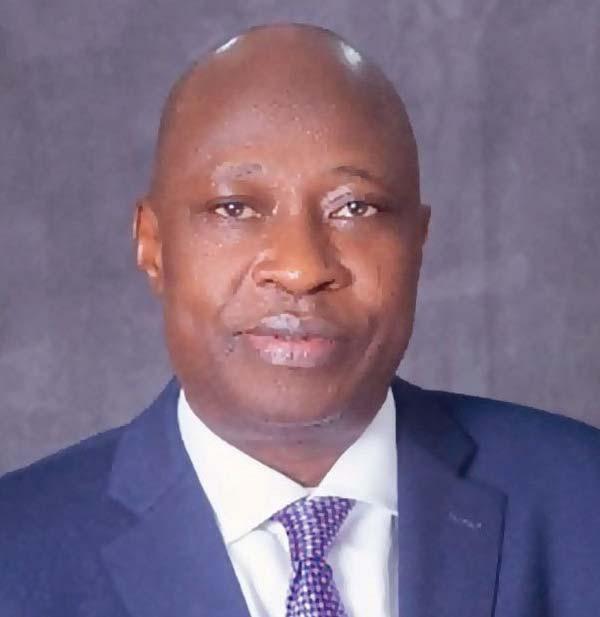
items on a cash basis. In strictly conceptual terms, credit penetration, represented by the proportion of credit to the private sector to the nation’s GDP was at abysmal 14 per cent in 2023. Curiously, the average for the sub-Saharan Africa was 35 per cent. Countries we like to compare ourselves with have better performance and stories to tell. For the same period of the year 2023, credit penetration for Kenya was 32 per cent, Rwanda was 23 per cent, Senegal scored 32 per cent, Egypt was 31 per cent and India attained 50 per cent. Though these are also low, but they represent better access to credit than the situation in Nigeria. Notwithstanding the unsatisfactory position of Nigeria, it is a significant improvement from where we used to be at credit penetration of barely 4 per cent ten years ago. Nigeria has done so much by introducing initiatives and infrastructure that are meant to spur growth in access to credit for consumers and small businesses. Nigeria realised the strategic importance of a unique identifier for access to consumer credit and embarked upon the provision of unique identifiers. The Bank Verification Number (BVN) was introduced in 2014 and the mandatory use of National Identity Number (NIN) came into force in 2015. Nigeria licensed three private credit bureaus in 2009 and launched the National Collateral Registry in 2016. Private
credit bureaus and the collateral registry are two credit infrastructure positioned to make financial institutions comfortable to lend to consumers and small businesses. While the credit bureau helps to provide credible information to creditors to profile loan applicants, monitor disbursed loans and help in management and collection of delinquent loans, collateral registry improves the comfort of lenders in having alternative, and more liberal security and collateral through the acceptance of movable assets, hitherto unacceptable by financial institutions.
All over the world, credit bureaus facilitate access to credit for consumers and small businesses. A credit bureau collects data from various sources, especially credit-related data from lenders and credit-granting institutions and process them to produce credible information that can be used by creditors to profile potential borrowers and manage credits granted. The two most important products of a credit bureau that are widely used are credit reports and credit scores. A credit bureau operates under a credit reporting system and primarily facilitates access to credit for those with credible credit history and credit scores. It helps lenders to significantly reduce the incidence of adverse selection of borrowers, promote responsible lending and risk-based pricing of loans. Research on the impact of credit bureau showed that in countries with a credit bureau, consumers and small businesses experience better access to credit. In such economies, 27 per cent of small firms report high financing constraints compared with 49 per cent in economies without credit bureaus. Similarly, the probability of obtaining a bank loan for a small firm is about 40 per cent in economies with functional credit bureaus, whereas it is lower at mere 28 per cent in economies without credit bureaus.
Nigeria and Nigerians have benefitted immensely from the operations of credit bureaus. As a country, it has assisted in raising access to credit thereby moving Nigeria’s credit penetration from 4 per cent in 2009 when the credit bureaus were licensed to 14 per cent in 2022. In addition, the rate of nonperforming loans has dropped significantly from over 30 per cent in 2009 to less than 5 per cent presently, below the threshold established by the Central Bank of Nigeria. This is because lenders now have credible information about prospective borrowers that help them in determining the character of borrowers regarding the capacity
and willingness to repay loans. Much more, the fact that those in default are not likely to obtain new credit facilities or other contractual obligations sends a serious message of the need to respect contractual terms and obligations. Credit reporting systems serve to discipline debtor behaviour by motivating borrowers make payments on time so as to continue to have access to credit.
Furthermore, deposit money banks are now able to open up to doing retail loans, nano loans, loans to micro and small businesses, etc because they now have access to reliable data from credit bureaus on the credit worthiness of Nigerians. Some of them have even got into digital loans, using Application Programming Interfaces (APIs) which enable them to process large quantities of applications, process and take decisions on applications in seconds and automate decision making thereby removing subjectivism and human errors from credit decisioning. It is assisting the banks to adopt risk-based pricing of loans with lenders charging interest rates based on the riskiness of the borrowers. Much more, there are now many new non-bank operators such as fintechs and microlenders who are new entrants into the microlending and retail loans space. Their entrance, lending models and loan products they deploy to the market rely on the availability of credible information about the creditworthiness of their potential borrowers made available by credit bureaus.
The new initiatives of government in introducing consumer credit and student loans can really be a big boost to improving prosperity and reduce the much talked-about poverty situation. With access to student loans to acquire tertiary education and vocational skills, this has the tendency to give opportunity to access higher education and vocational skills to all classes of young people irrespective of their economic background. No doubt, access to student loan would promote inclusiveness and remove financial barrier to higher education in Nigeria. It is capable of preparing beneficiaries from poor background for an enhanced quality of life and in the process leads to increased productivity and enhanced human development index in Nigeria. Likewise, consumer loans, promoted by government, would improve access to loans for the disadvantaged segment of the population. It should liberate a lot from loan sharks and shadow banks who charge prohibitive and usurious interest rates and other charges.
The story continues online on www.thisdaylive.com
In this definitive Interview, the Managing Director and Chief Executive Officer , Industrial and Medical Gases (IMG) Nigeria PLC, Ayodeji Oseni, discusses a range of issues that manufacturers of industrial gasses contend with, the way forward and how IMG has been navigating uncertainty in the Nigerian operating environment.
How will you describe the operating environment of Industrial and Medical Gases in Nigeria?
Challenging and very unpredictable. As a business, we are not insulated from the current harsh operating environment and our business operations contend daily with very dynamic but uncertain operating conditions.
What are the specific challenges militating against the operators in the industry?
The challenges include high energy cost,unavailability of forex for imports, high levies on imports, ,unrealistic regulatory barriers, activities of quacks and unfair practices and near zero regulatory interventions on entryand exit of players etc.
Can you provide an insight into the policy measures that Federal Government can put in place to address the challenges?
Our products and services serves as input to other industries, therefore, some of these measures will include: review of appropriate levies and duties on importation of raw materials and spares, access to FOREX, foreign suppliers need to be paid as at when due, regulatory framework to guide players, cylinder control mechanism to improve safety and engagements by government with the right stakeholders within our industry as against profiteers.
Despite the challenges that you have mentioned, IMG has consistently posted profits. What will you attribute to this?
Safety first, an astute management team, superior quality products, innovation, Besides talent retention and long serving and dedicated workforce are also contributors to our success story. As a 65- year old company in Nigeria, we have undergone so many changes and continued to evolve dynamic strategies to overcome operating challenges within the
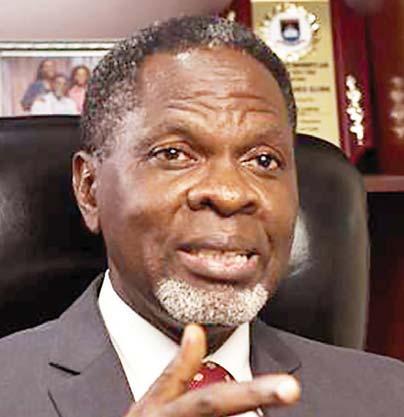
Nigerian operating environment and system. What makes IMG unique as a major operator in the industrial and medical gasses industry?
For several years, IMG Nigeria Plc was part of the world famous and leading manufacturer of Industrial Gases, Linde Plc. We operated under stringent international manufacturing and operating guidelines that consistently resulted in best global practices. We are grounded in this practice and this foundation firmly prepared us for our transformation into a proudly owned Nigerian entity, successfully operating in Nigeria.
What is the relationship between the management and staff at IMG and what is the company putting in place to attract
millennials, Gen Z, Gen Alpha etc, the future of every investment?
The relationship between management and staff at IMG is very cordial and involves collaborative efforts to achieve the organization’s goals. The primary objective is to ensure a healthy and productive relationship by fostering communication, providing growth opportunities, and ensuring a supportive work environment. In a bid to attract millennials, Gen Z, Gen Alpha etc. which is indeed the future of every organization, the company has put in place several globally acceptable human resource management initiatives such as Remote Work Options, Engagement and Recognition, Innovation and Creativity, Technology Integration, etc.
With the rising cost of doing business in Nigeria, is IMG planning to raise fresh capital in the capital market and by what financial instrument?
Yes, the Board is looking into plans to raise equity in 2025 to support growth. The objective of the equity will be to pay off the loan contracted in the current year and support business expansion and growth initiatives.
Congratulations on the successful hosting of the company’s Annual General Meeting (AGM) recently. What is your assessment of the mood of shareholders?
Our shareholders have always been very supportive of the Board and Management. They were delighted to receive a dividend from our positive performance. As you are aware, many big companies reported losses and couldn’t pay dividends. The Board, Management and Staff of IMG, received commendations from shareholders ,and were encouraged to continue to seek out opportunities for growth and positive
earnings. Despite the prevailing gloomy national economic outlook, the future holds great promise for Industrial & Medical Gases Nigeria as we continue to consolidate and innovate,
In December 2021, IMG unveiled a new corporate identity. To what extent has the new identity been impactful?
Our new corporate identity has had a significant and positive impact on our business. Our new identity expressly conveys a promise and commitment from the Board, Management and entire Staff to all our stakeholders that our company will continue the path to greater heights and a promising future. Our new identity reflects a collective commitment to service. The name, IMG, is an embodiment of the sector in which we operate in our industry and confers specificity to our business whilst communicating an assurance of availability of an array of associated superior and quality products to our existing and prospective customers. Our logo is called Greater Heights. The vertical slanting lines show a single mindedness in meeting the unified goal of serving the customer and the objectives of the company.It also conveys the energy to drive our promises without wavering, flowing from one source and towards the same objective – safe and superior quality products.
Let’s have an update on the company’s implementation of Environmental, Social and Governance (ESG) policy in line with the guidelines of Nigerian Exchange Limited (NGX). Our ESG framework reflects our business and ESG journey and these will aid us in reporting on our ESG activities for 2024. Our goals and pillars revolve around safety and quality, diversity and inclusion, innovation and excellence as well as people and integrity.
Arthur Eriye
The National Emergency Management Agency (NEMA) has delivered 68,087 litres of liquid gel fertilizer to the Niger State government for onward distribution to farmers affected by the 2018 flood disaster.
This intervention is undertaken pursuant to the National Food Security Council-Emergency Agricultural Intervention (NFSC-EAI) initiative.
The Acting Governor of Niger State, Yakubu Garba, formally received the fertilizer at a ceremony held in Minna, the state capital. NEMA Director-General Mrs. Zubaida Umar headed the delegation that delivered the items.
While presenting the fertilizer, the NEMA DirectorGeneral, who was represented by the Direc tor Pl anning, Research and Forecasting, Dr Onimode Bandele, explained that the liquid gel fertilizer was a substitute for the remaining NPK fertilizer allocated to Niger State under the NFSC-EAI program initiated in 2020. She attributed the delayed distribution to regulatory changes imposed by the Presidential Fertilizer Initiative (PFI). She commended Governor Mohammed Umaru Bago for his agricultural efforts aligned with national food security policies and urged for the prompt distribution of the liquid gel fertilizer to its intended recipients.
Ebere Nwoji
Veritas Kapital Assurance Plc, said it recorded a remarkable increase of 630 percent in profit in the first half (h1) of 2024.
The company said its profit grew from N672.4 million in H1 2023 to an astounding N4.908 billion in H1 2024, marking an extraordinary year-on year growth of 630 per cent. The Managing Director/CEO of Veritas Kapital Assurance, Dr Adaobi Nwakuche expressing her feelings on the performance said she was confidence that this unprecedented financial success underscores
Veritas Kapital Assurance’s unwavering commitment to delivering unparalleled value to its stakeholders. The net insurance and investment results saw a remarkable growth of 425 percent leaping from N1.243 billion in the same period last year (2023) to N6.523 billion in 2024. Insurance revenue also experienced a significant boost, increasing by 350 per cent from N2.201 billion in 2023 to N9.908 billion in 2024. She said moreover the Gross Written Premium (GWP) showed a substantial 330 improvement, rising from N2.921 billion in 2023 to N12.574 billion in 2024.
In response, the A cting Governor, Yakubu Garba hailed the fertilizer donation as a boost to the state’s agricultural endeavors, expressing confidence
in the state’s ability to excel in this sector.
The Acting Governor gave assurance that the fertilizer would be distributed
transparently and equitably among the intended beneficiaries, noting that the Niger State Emergency Management Agency (NSEMA)
had meticulously documented the farmers affected by the 2018 flood, ensuring a seamless and targeted allocation of the relief materials.
Nume Ekeghe
The Chartered Risk Management Institute (CRMI) is gearing up to host its 23rd Annual Conference, where it will also sign a landmark Memorandum of Understanding (MOU) to establish the Federation of African Risk Management Associations.
Set to take place in Lagos, the conference will bring together
top professionals, thought leaders, and stakeholders from across the continent to address Africa’s most pressing challenges. Themed ‘The Emerging Crisis in Africa and the Way Forward,’ the event aims to foster strategic discussions on crucial issues.
In a statement, CRMI highlighted that this year’s conference represents a significant step in elevating Africa’s role in global risk
management. Commenting on the conference, CRMI President Ezekiel Oseni stated: “We chose the theme because of the numerous global developments that have farreaching implications for our continent. Geopolitical issues, bilateral agreements, FinTech advancements, and the rise of AI all have significant impacts on Africa’s welfare and growth. During this conference, we will
explore these topics, along with fintech, climate change, market volatility, and more.”
Regarding the MOU, Oseni added: “We will be signing an MOU to establish the Federation of African Risk Management Associations during this conference. This federation will be akin to those in Europe and America, enabling Africa to have a stronger voice in global risk management.”
To empower entrepreneurs and career professionals in Nigeria, MOre-Thenticity Limited recently hosted a revolutionary twoday workshop, tagged, “The Breakthrough Blueprint.”
The event, which drew entrepreneurs and career professionals from across the state, was held in partnership with founder of Bukie Signature Consulting, Bukie Adebola-Ezeh, a UK-based sales and confidence coach; and owner of Positively Unreasonable LLC, Monica Walters, a US-based coaching and creative strategy expert.
Speaking at the training, founder, MOre-Thenticity Limited, Monica Nnoka, who is also known as ‘’The MOre
Coach’’ and a mindset and Transformational coach explained that the event was necessary as it marked a significant milestone in the personal growth and development journey of entrepreneurs and career professionals in Nigeria.
On the theme of the training, “The Breakthrough Blueprint”, Nnoka said: “We want to empower as many entrepreneurs and careers professionals with actual breakthrough success. Rather than just motivation, we are giving them a practical blueprint. We focus on inner growth and development, helping individuals cultivate their inner influence and confidence.
“By working from the inside out, our goal is to equip them
with the tools and strategies needed to elevate their impact and give them the tangible results that they expect in their businesses, life, work, and then, extend that influence to the world around them as well,” she said.
Speaking further, Nnoka noted, “Statistics show that most Nigerian businesses don’t last up to five years. Again, most career professionals are unhappy in their jobs. A common underlying factor is a lack of inner influence, which is crucial for success and fulfillment.
“There are unresolved traumas that can hold people back from unlocking their potential. Those unaddressed childhood traumas such as
bullying, emotional neglect, parents divorce or even sexual viole nce or abuse can hinder success and fulfillment causing procrastination, self- blame, or guilt.”
On her part, founder of Bukie Signature Consulting, Bukie Adebola-Ezeh, shared valuable insights on the importance of self-identity for entrepreneurs. According to her, focusing on self-identity, entrepreneurs can shift from competition to collaboration, leading to more meaningful relationships and mutual growth.
Adebola-Ezeh highlighted the significance of understanding life’s phases and preparing for each stage. She encouraged entrepreneurs to embrace challenges as opportunities for growth, rather than obstacles.



www.thisdaylive.com

12,

opinion@thisdaylive.com
YINKA ADARANIJO reckons that the President is laying the foundation for a more stable, prosperous, and inclusive society

A sense of entitlement is a cancerous thought process and can be deadly to any relationship, argues LINUS OKORIE
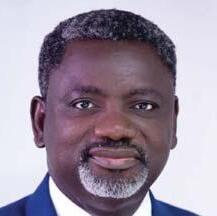
We often confuse a sense of entitlement with recognizing and owning one's value. When someone knows their worth and understands what they can contribute, it is not a sign of entitlement mentality; rather, it reflects self-awareness and confidence, which indicates a healthy understanding of their value and potential impact.
Entitlement mentality can manifest in any relationship—whether at work, within a family, or among friends. An entitled person expects to be treated as superior to others and views others as inferior, existing solely to serve their needs. They believe they are owed something without having to put in much, if any, effort to achieve it.

is a cost to learning.
While it’s relatively easy to address entitlement in children by teaching them skills like empathy, perseverance, and gratitude, it’s more challenging with adults who may have long relied on entitlement tactics to succeed. We can’t control or predict how our employees will react, respond, or evolve as our business grows. It’s up to us to curb entitlement. Here’s how:
DANGOTE REFINERY AND CRUDE OIL SUPPLY
The NUPRC will prioritise the development of a transparent and well-regulated upstream petroleum sector, writes AKPANDEM JAMES

See page 21 See page 21

Contrary to popular belief, this is not just a ‘Millennial or Gen Z problem.’ Anyone, regardless of age, can develop an entitlement mentality if their expectations are misaligned with what can be reasonably offered. Employee entitlement is linked to narcissistic behaviour and the self-centred belief that one is special and deserves preferential treatment. However, friction arises when an employee’s demands are out of alignment with their performance or when they are unwilling to put in the necessary time and effort to generate value equivalent to their requests.
Social media is increasingly contributing to the entitlement mentality in our society. Many uninformed individuals with internet access offer online commentary on workplace behaviours, negatively influencing others’ perceptions of what is acceptable. Entitled behaviour is more than just annoying— it is toxic to your team.
Research shows that entitled workers often display negative behaviour, leading to conflict with co-workers and with you as their leader when you don’t give them what they feel they deserve. The entitled employee also lacks reciprocity toward their co-worker, creating a vicious cycle of disharmony within the team.
Entitled employees believe they are owed something, so they become increasingly disengaged if they don’t receive it. They are also less satisfied with their jobs and may constantly seek opportunities elsewhere, perceiving your treatment as unfair.
As a leader, the perception of fairness is crucial. While employees may disagree with your decisions, your decisionmaking process must be transparent and fair. Catering to an entitled employee’s every demand will not only reinforce their behaviour but also make the rest of the team think you are playing favourites or that being a squeaky wheel will get them results.
Managing an entitled employee can lead
to an influx of special requests for schedules, vacations, and work preferences.
An employee might request a higher salary, preferential treatment for projects, employment perks, or schedule flexibility due to their tenure or an inflated sense of selfworth. This employee believes they automatically deserve privileged treatment from their co-workers and leadership. However, it is not your responsibility to grant a raise just because it was requested. This is where performance appraisals are valuable; they allow you to reward or penalize performance according to clear expectations.
Sometimes an employee feels they should be the first to know about business decisions. As your team grows, sharing information with one privileged person could create more discord than it's worth. While news might occasionally leak, as a leader, you should have the autonomy to make business decisions without seeking unanimous approval—that’s why you own the business! New information should be communicated in the right way, at the right time, in the proper context, and to the appropriate people.
You might have an employee who has been with the company for a long time, perhaps a family member or close friend, who believes they don’t have to follow systems or processes as thoroughly as everyone else. Such favouritism can lead to low morale and disengagement among the rest of the team. To foster an efficient and collaborative work environment, rules must be upheld by everyone in the organization, even those who feel entitled to special treatment.
An employee might feel they deserve additional skills training at the company’s expense. They may want to attend a conference just because another employee is going, or they may compare their privileges to a friend in another state. Be cautious of employees who believe they are automatically entitled to educational and training opportunities funded by the company. They need to understand the value and effort required to earn such opportunities—there
Most employees don’t fully understand what it means to run a business, including the concepts of profit, loss, and overhead. Take this opportunity to show them the financial breakdown. Avoid entering into a debate—arguing is a tactic entitled people use to bully others. Instead, explain a few key aspects of the business and leave it at that. Entitled individuals thrive on arguments but dread the silent treatment.
Don’t give in to their Demands: Consider a child throwing a tantrum in a grocery store because they want chocolate. If their mother buys it, it might stop the tantrum temporarily, but it reinforces the behaviour. Don’t be that mother—don’t let your entitled employee pressure you into caving to their demands.
From day one, ensure employees have clear job descriptions and undergo annual reviews to align on expectations and assess whether their assigned KPIs continue to benefit the evolving business. During the offer process, employees should be made aware of the compensation package, which outlines the value of each expense the company incurs by employing them. It's important to help them understand that benefits such as bonuses, insurance, paid vacation, retreats, training, and more are all costs to the company.
Implementing these strategies will curb employee entitlement. However, in extreme cases, you may need to let off the entitled employee. Stop shooting yourself in the foot trying to accommodate entitled employees. Rather, seek out passionate, grateful, and eager employees, help them align with the greater vision, and provide them with opportunities for earned growth that contribute to the company. A sense of entitlement is a cancerous thought process that is void of gratitude and can be deadly to any relationship. As the saying goes, “Gratitude begins where your sense of entitlement ends.”
Okorie MFR is a leadership development expert spanning 30 years in the research, teaching and coaching of leadership in Africa and across the world. He is the CEO of the GOTNI Leadership Centre.

Editor, Editorial Page PETER ISHAKA
Email peter.ishaka@thisdaylive.com
There should be an end to impunity in governance
The 10-day protest dubbed #EndBadGovernanceInNigeria, ended at the weekend with a planned ‘One-Million-Man March’ across the 36 states and the Federal Capital Territory (FCT) that was largely ignored. The nationwide protests, triggered essentially by unprecedented economic hardship, bad governance and corruption began on 1st August with many Nigerians trooping into the streets to openly express their discontent. However, what was billed to be orderly and peaceful protest slipped into disorder and chaos, particularly in the northern parts of the country where several business owners are still counting their losses.
Hundreds protest across Nigeria over soaring cost of living, fuel prices
In many northern states, including Gombe, where protesters pelted the government house with stones, children joined the demonstrations. In Abuja, the police gunshots to disperse protesters. In Kano, Kaduna, Yobe, Bauchi and Plateau, curfew to stem the violence. In a few states, protestvehicles, while also looting and vandalising shops and supermarkets. With hoodlums hijacking the protests, Kano descended into chaos. The retail outlets of Barakat Stores in Kano for instance claimed losses in excess of N5 billion. The Digital Innovation Park built at enormous cost and earmarked for inauguration last week in Kano, was burnt and ravaged.

complained aloud. “Live bullets as a state response to civic protest-itself becomes the core issue,” said Nobel Laureate, Wole Soyinka. “Even tear gas remains questionable in most circumstances.”
Nationwide, the economic loss as a result of the peaceful protest which spun out of control is estimated in trillions. For an economy which is already lying prostrate, this is double jeopardy. To restate what is obvious, the prevailing economic hardship exacerbat-
the naira has further fuelled the poverty for millions of Nigerians. In the north, millions of the children are already out in the streets, hungry, dependent on others
Nigeria has the highest number of food insecure people in the world at 31.8 million
T H I S D AY
EDITOR SHAKA MOMODU
DEPUTY EDITOR WALE OLALEYE
MANAGING DIRECTOR ENIOLA BELLO
DEPUTY MANAGING DIRECTOR ISRAEL IWEGBU
CHAIRMAN EDITORIAL BOARD OLUSEGUN ADENIYI
EDITOR NATION’S CAPITAL IYOBOSA UWUGIAREN THE OMBUDSMAN KAYODE KOMOLAFE T H I S

EDITOR-IN-CHIEF/CHAIRMAN NDUKA OBAIGBENA
Beyond the brigandage, the security agencies did not manage the protests well. Noteworthy was the use of arms against citizens excising their rights to protest the inadequacies of government. At the last count, about a dozen protesters fell to the bullets, among them a 16-year-old said to have been hunted down on the street of Zaria. Hundreds of others were also injured, some severely. Amnesty International
GROUP EXECUTIVE DIRECTORS ENIOLA BELLO, KAYODE KOMOLAFE, ISRAEL IWEGBU, EMMANUEL EFENI
DIVISIONAL DIRECTORS SHAKA MOMODU, PETER IWEGBU, ANTHONY OGEDENGBE
DEPUTY DIVISIONAL DIRECTOR OJOGUN VICTOR DANBOYI
SNR. ASSOCIATE DIRECTOR ERIC OJEH
ASSOCIATE DIRECTOR PATRICK EIMIUHI
CONTROLLERS ABIMBOLA TAIWO, UCHENNA DIBIAGWU, NDUKA MOSERI
DIRECTOR, PRINTING PRODUCTION CHUKS ONWUDINJO
TO SEND EMAIL: first name.surname@thisdaylive.com
Indeed, Nasarawa State Governor Abdullahi Sule was apt when he declared that many of the people protesting were Almajiris. But that does not remove the fact of hunger and desperation for millions of people in Nigeria. At 40 Nigeria is highest in three decades. According to the United Nations Food and Agriculture Organisation (FAO), Nigeria has the highest number of food insecure people in the world at 31.8 million. Besides economic insecurity, kidnappings, terrorism and banditry are additional daily challenges.
No doubt, the socio-economic situation in the country has made many young people the cannon fodder, pliable to all kinds of manipulation by the political elite. This time, as part of the protest, they were -
tunately, they knew not the implications of what they were doing. When President Bola Tinubu addressed the nation during the protests, he asked for patience, and dialogue, to address the basket of grievances. The nature of the dialogue is yet to be spelt out. But even if hunger will not vanish from homes overnight, there should be an end to impunity in governance. That is one message from the protests that should not be lost on the authorities, at all levels.
On Tuesday, August 6, 2024, President Bola Tinubu approved the appointment of seven individuals to head strategic agencies and programs under the Federal Ministry of Development. The agencies and programs include: the National Social Investment Programme Agency (NSIPA), the for Vulnerable Groups, the Home-Grown School Feedingtional Commission for People with Disabilities. The Presto provide much-needed relief to Nigerians and to ensure programs.
The most pressing task for President Tinubu now is to appoint a new minister for the Federal Ministry of Human-ment—someone who can provide the necessary leadership, work seamlessly with the managers of these agencies and programs, and connect with the people in need of relief, especially during this period of widespread hardship and
food scarcity in Nigeria.
Furthermore, any minister taking over the Humanitarian Ministry should be aware that some of the ministry's programs and schemes have not met people's expectations, and many of their managers have failed Nigerians. Many Nigerians see the ministry as just a cash cow for politicians, which should not be the case.
The new minister and their managers should note that direct methods of reaching the poor have often failed to serve the common man. Instead, they should consider indirect methods by leveraging a well-known and respected hybrid public-private partnership. This approach would -
For instance, the country could be segmented into its 360 -
gerprints, and phone numbers, including addresses, with a -
stituency and their local government areas. With this approach, the government could establish a central unit, potentially managed by a consortium of priminimize embezzlement risks, allowing the government to focus on monitoring and ensuring good service delivery. The programs and schemes could even be designed so that
This is not a call to completely discard the existing programs and schemes, but rather to comprehensively remodel
political interference. Moreover, this is an opportunity for President Tinubu to directly 'speak' to young Nigerians who actively participated in the EndBadGovernance protest by appointing two ministers to oversee the ministry, one of whom should be a youth.
Zayyad I. Muhammad, Abuja
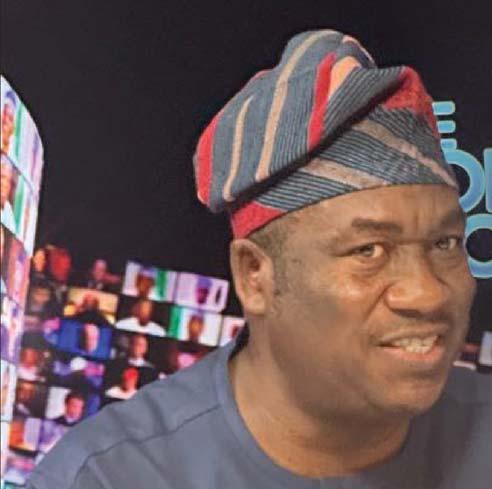
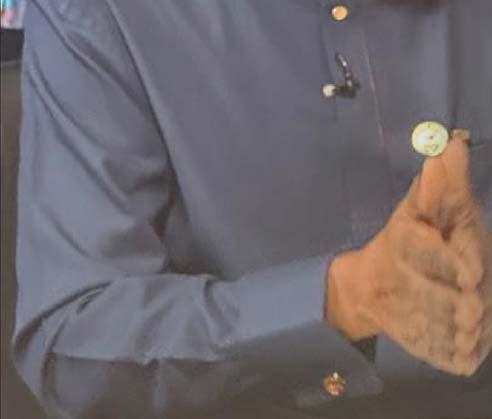
How has the Lagos government managed the #EndBadGovernance protest? Has there not been any explosion or escalation of violence we saw in Kano, Kaduna, and other parts of the North?
The second question is about the big elephant in the room. We find out that some people in Lagos, Lagospedia, as they call themselves, have given the Igbos a month to leave Lagos. The Lagos government has denounced it. But is the Lagos government taking other steps to make sure that the state, which is supposed to be the melting pot of Nigeria, does not become a boiling point for ethnic bigotry?
The first thing for us is engagement. As a people, we must learn from our experiences. We were all alive when the #EndSARS (protest) happened, and we saw the aftermath. Various infrastructures were destroyed, and we said never again. With that in mind, we went to our people, explaining the various initiatives we are embarking on and how they can be destroyed. I recall meeting some students, and I said to them, ‘You are all engineering students’. One of the buildings that was destroyed was the Public Works building. At the time, we brought in the biggest machine in this part of the world that could lay about a thousand interlocking blocks in an hour. But that multimillion-dollar machine was destroyed. This is where we train pupil engineers because when you graduate from engineering classes, you are all taught about mixtures of concrete, ratios, and other things. However, that does not mean anything until you are able to actually do the measurement in real life’.
So we went around the state, explaining to our youths, elders, CDCs, and CDAs that it is OK to protest. But it is not fine to destroy the assets that we know and proclaim are not even enough. Thankfully, I think our people apparently listened. On the issue of the Igbos, one of the hazards of social media is that some people can just come up and say Igbos must leave. That is totally unacceptable. That is why you saw that the governor immediately denounced it. As a people, that is not just who we are. Growing up in Lagos as children, we have all lived together in this state, and there is no need for people to become ethnic bigots. But again, some people will do whatever they can to divide us. But we will never allow that. Over the weekend, the governor, myself, and other members of the State Executive Council visited the family of Chief Emmanuel Inwanyanwu, who had just passed on. We went to see the family of Madam Onyeka Onwenu to commiserate with them. These are Nigerians of Igbo extraction whose families live and work in Lagos. What is going on in terms of fishing out the people is not what I can discuss because the security operatives will have to do their job. I can assure you that in the next few days, we will see what happens. You have talked about the issue of the government not condoning the bigoted rhetoric in any way. But a number of people are saying arrests should have been made because this did not just start. During the 2023 elections, some people came out and made some very divisive statements along ethnic lines, but nothing was done. Some did not even try to hide their faces. There are quick wins. What is stopping the government from picking






Deputy Governor Obafemi Hamzat speaks on key issues in Lagos, such as the recent #EndBadGovernance protest, legacy projects of Governor Babajide Sanwo-Olu’s Administration and the contentious issue of ethnicism in an interview on Arise Television. Excerpt:



S n

up those people while we fish out those who come under anonymity on social media, like the picture of the man wielding the axe?
You said they were easy. It is really not that easy because the issues concern both sides. If you noticed, somebody said we killed someone around Okota because they wanted to steal the ballot boxes. That cannot be right. We cannot take the law into our own hands. What should happen is that security operatives should do their investigations, and when people are found culpable, they should be prosecuted. The challenge and the bottom line for me, in a broader sense, is that public commentary can be problematic in this country. We might not all agree, and I will tell you why. How is it that we don’t talk about one of the most important economic factors for us as a people, which is land?
You go to Ghana, Cote D’Ivoire, and everywhere in Western, Eastern, and Central Africa, and you see the way we plan our cities. We all studied elementary economics, and we say land is one of the factors in production. But in trying to manage that critical asset, we politicise it. We all know that whatever structure you want to build in terms of infrastructure must take place on land, buildings, airports, etc. So why is it that we don’t manage our land? When you want to manage land, we all become emotional. It is, therefore, easy to say that physical planning and management of land assets are key to our development, and if we don’t get it right, building prosperity for our people will be a mirage.
But when you want to plan, you hear It is because you are Hausa, a Yoruba man, or Igbo. The bottom line is, let us focus on the real issues. Like I said, I was not in government in 1983. I was a student at the University of Ibadan. Please check various weekly editions of Newswatch magazine seasoned journalists. Since the 1970s, they have been talking about the same issues that are rearing their heads again today. So what is the problem? If you count the number of government officials—the chairman of local government, councillors, governors, and deputy governors—we are all less than 1,600. So, are we saying that in a nation of over 200 million, we can’t find 1,600 individuals who can build this country? It is because we have not all agreed to discuss and confront the fundamental issues confronting us as a people. You hear eminent Nigerians encouraging protests that they absolutely cannot control. I felt sad when people like Alhaji Atiku Abubakar did just that. He knows my father, so I can say he is my father’s younger friend. That cannot be right. Compare his attitude to that of Rishi Sunak, the opposition leader in the UK, who came out to quickly condemn the riot and supposed protest in that country. That is statesmanship. Elections are over. Let us all build our county. You raised a couple of things. What happened in Newswatch in 1983, hunger and poverty are still there. It’s because of the dubious political class that has continued to destroy Nigeria since 1983 has not left Nigeria and continues to rule to date. Even if you take a newspaper, 100 years from now, if this
class continues, things will never change. Secondly, Lagospedia has been running its Twitter handle since 2015. It has been inciting violence. It was very active during the elections, yet nothing was done. Why now?
A week before the protest, Lagospedia was talking about ‘Oro’. Why has the brains behind it not been fished out? Igbo man and Yoruba man are brothers. Our real enemies are the political class, which makes lives miserable every day. The truth has to be said. Why are we not clamping down on these people? You talked about development, land appropriation, and everything. The issue is that political hegemony keeps taking the majority of the land. That’s another problem with Africa; you can go from Kenya to Nigeria. Did you remember Adaramoye? It is a problem of the political class. Let us talk about the issues. What is the Lagos government doing? People are suffering. There are two million people in Lagos; their lives are miserable. They don’t even have potable water from the government. There is sewage everywhere. What is the Lagos government doing?
Let’s look at projects as they relate to Lagos state. If you want to look at projects, there is no local government in Lagos today, from Kosofe to Alimosho, Ojo, and so on, that we are not doing one project or the other on a continuous basis. Let me now tell you how we plan our budget in Lagos. Just two Fridays ago, when we were in Epe, for example, what did we do? We actually go to the communities, and they give us a list of projects based on their priorities. Went round the state, Badagry, Ikorodu, Kosofe and others. After finishing the estimates based on communal needs, requests come to about seven trillion, and we don’t have the needed funds to execute a budget of seven trillion. Our budget last year was N2.3 trillion, which means when you request five things, we can give you two.
On the issue of providing water for our people, our state is building Adiyan 2 waterworks, which is 70 million gallons of daily water. Our need is in the neighbourhood of 450 million gallons per day. We have Adiyan 1 with 45 million gallons, and Adiyan 2, which is 70 million, is still being built. The raw water source is from the Ogun River because the best way to process water for communal use is not from boreholes because we will be destroying the aquiver. The challenge is that in order for us to take the intake pipes from there, do you know the amount of money we need to pay for compensation for all these things? Again relating to land use and how we manage our land, the most important issue, therefore, is that we need to grow our economy and increase the pie so that we can better service the needs of our people than we are doing today.
You talked about not having enough funds, but even with the little the Lagos government has, people will challenge you that it’s not used effectively. What is the impact on the cash ratio of the money?
Corruption is an English word, and I cannot say that it does not exist. However, we will never condone it. We are embarking on massive projects all over the state. For example, the Mende-Ojota link bridge is
about N58 billion naira project. Please let me explain the problem and give you a specific example. When I was commissioner for works, people said, ‘When you are doing road in Lagos, it is more expensive than Ghana and other places’. It will be because Lagos is, on average, two meters below sea level. When we were constructing the Lagos-Badagry Expressway, we implemented it in phases from Mazamaza to Okokomaiko. We required 1.8 million cubic metres of sand. Given that a tipper, when fully loaded, is 5m3, it means you require 360,000 tippers full of sharp sand to get to level for concrete base and asphalting. You know the logistics of getting that together since the sand-mining unions in Ogun state will not even encourage Lagos sand tippers to come to Ogun state without understanding. So, there are structural challenges that need to be talked about. I am a politician, but I did that by choice. I had a PhD at the age of 27. I worked with Morgan Stanley as the head of IT, managing trading trade, the trading floor was doing $1.7 trillion a day. That is in volume. We manage the IT asset that allows the traders to conduct their trade. I know a lot of Nigerians are doing great things outside of the country. So why are we struggling in our land? We must resolve relevant structural issues without being unnecessarily toxic about our relationship.
Why haven’t you used that technology to battle corruption? Do you admit there is corruption in Lagos?
I can’t say that. Every day, we battle this, and every day, people lose their jobs. We have closed a lot of loopholes due to automation. It is a moving target, and we can never be satisfied until we rid the system of all corrupt practices.
Please talk to us about the visit to the Ajumogobia family, which indicates the security failure. The Lagos State Security Trust Fund had a vigilante group at a time. Neighbourhood Watch came later. And the visit to Onyenka Owenu to assure Igbos in Lagos that they are safe in the state. The Lagos government is saying we still have free maternity. You will get free rice, Indomie, or Ounje Eko, as the governor said. Despite Ounje Eko, people still gather at Ojota. Is there something else the state government needs to do to reassure the people?
The visit to the Ajumogobia family is not something I really need to talk about on TV. People are mourning. But the fact is that these are house helps, people working with her in the house. Fortunately, the three of them have been apprehended, and I am sure the law will take its course. This is a very unfortunate incident. A young, beautiful doctor was just murdered just like that. On the issue of the Igbos, when we visited the Onyeka family, people didn’t know that the husband was a Yoruba man and the children are Ogunlendes. Like we said, people just hide under whatever and just put something on social media. Like you also commented, the governor condemned it. Even in the speech of the president he condemned ethnic bigotry.
Continued on page 27
The reality is that some people are just social media tigers. Also, DSS is working on it; hopefully, they will fish them out very soon and they will have their day in court, and the court will decide what needs to happen.
On the issue of Ounje Eko, it is successful. But from our survey and feedback, what people said is that they prefer the 25% discount food, based on what we have done. I know we were giving out free food. The challenge is distribution. We have gone through religious bodies, CDAs, and CDCs, and some people feel that we are still missing out on getting to all that is needed in terms of people getting food. We have used different channels, and we keep changing them. People say they prefer the 25% discount market. We worked with aggregators and others in the ecosystem so that producers can bring all sorts of food to the market. To prevent any corruption, we don’t exchange cash. Payment is made through the PoS and other mobile channels, and the government pays 25% to the seller behind the scenes. Based on the survey, people prefer this approach, and we will start again in the 57 markets very soon. However, we have to wait and let this protest fizzle out. Then we start and make sure that people get that discount.
It’s often said protest is the voice of the voiceless. Recently, the Lagos government released more channels for engagement. Please tell us how you hope to further engage with young people in the state to ensure open communication channels and get feedback from the people to address. Second, in terms of arrests made in the UK, we see what’s happening there, how underlying ethnic tensions can balloon just by one trigger, and some people are concerned with Lagos state. We saw someone threatening Iya Chukwudi sometime last year, and we have seen theatrics like that, with faces being shown beyond speaking and condemning it. What are the extra steps and measures to ensure that Lagos continues to ensure ethnic peace?
Iya Chukwudi also came out and said, ‘He is my friend. We were just joking’ when she was engaged. So, what do you do if somebody says, ‘He is my friend’? However, the bottom line is: let us all have cool public commentary. The way we talk, we all need to be calm. When every action that you take is weaponised, it becomes a problem, and we are indirectly encouraging people to do the wrong things. That is where I am starting from. Let’s all calm things down, and it starts with the way we do our elections, how we talk about it, and how we compare ourselves with other nations around the world. It just does not make sense because we are all different nations and our methodologies are different.
We are one of the nations conducting monolithic elections; the ballot paper in Lagos is the same as that used in Kaura Namoda, in Aba, and others; that’s not what happens in the USA or India. In the UK, which is parliamentary, ballots are therefore counted and tallied at various constituencies. You know how everyone was busy abusing and cursing out the INEC chairman, and we did not say this was wrong. A lot of people are now scared to take up assignments when they know that if I give my best, they will not be appreciated. In fact, they will be maligned and abused unjustly.
We have invited various people with records of accomplishment. During cabinet formation, we called some people, and they said, ‘No, I am OK. I love to.’ But we have all created an unbelievably toxic environment. So if we devalue the system such that men of honour avoid these assignments, we will allow charlatans to take over our space. This is what we see, and you must notice what is happening around the world. The whole world is now an angry space, and you can see the right wing is defining the political space. Look at the narrative in England. It is because the right wing twisted the whole thing, leading to misinformation. More importantly, for us as people, let’s all calm down our rhetoric. The environment is toxic. Recall that after #ENDSARS, everyone says, let bygone be bygone; let us not arrest people. Let us call people and dialogue. It was agreed that we should set up a panel of inquiry, which we did. About the hatred on our Igbo brothers and sisters, like I said, investigation is ongoing. Hopefully, this protest will not be long-lasting. The police are all focused on the protests now. Hopefully, the DSS and other security institutions will do what they need to do and get those responsible. Sometimes, some of these people are not even Nigerians because the social media space is not necessarily locality-based or confined.
The governor’s media parley was commendable. We don’t know when the next one will be to open lines of communication because we want to prevent protests. We don’t want people to come out because they are feeling aggrieved, so one of the key things they asked for is dialogue, which means that their voices ought to be heard
We do that in our various communities. Every 100 days, we go around the state. It’s just probably not on television, but we go around. For example, I just told you we were in Epe two Fridays ago.
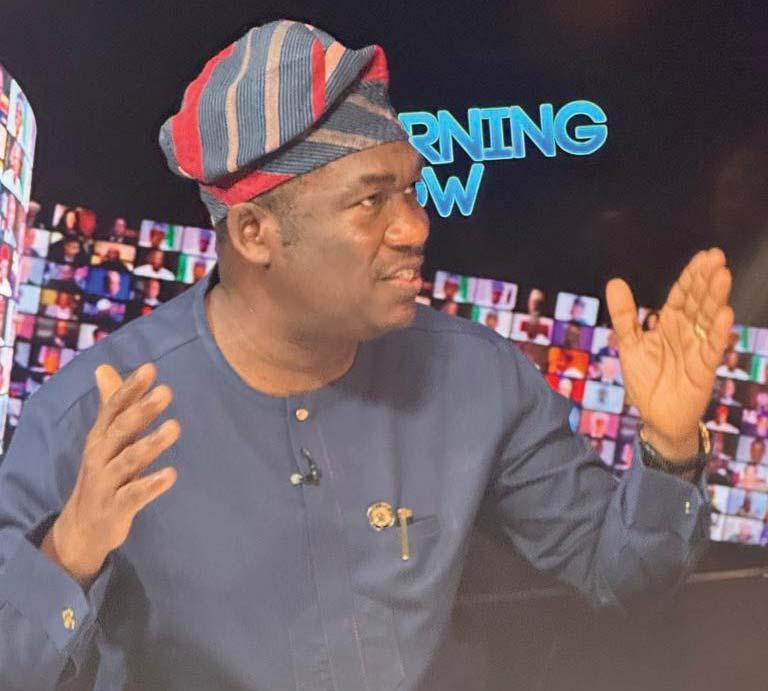
Our royal fathers, market women, artisans, and everybody else were there talking about complaints and needs. We were able to explain why we are able to only accomplish two out of five requests. We have to explain to them how we set priorities. The reasons why we cannot do roads A and B at the same time.
And then we also engage the youth. As a matter of fact, about 10 youth leaders were sponsored to Finland to go and see how things are done. Let me give you another example. When we wanted to modernize our abattoirs, some of our workers who are Muslims disagreed with us and said that they could not slaughter cows this way. I was there, and I explained that I am a Muslim; there is nothing unIslamic about it. We took them to Kenya, where they saw that Muslims were doing exactly that. We go round different sectors to talk to people and say we want to do this. You might think it’s not OK. When we were to build the BRT and bring in the Blue buses, some of our unionists were against it. We took them to Bogota in Columbia, and they were able to learn from that system. In essence, we were able to show that this can be turned into a sustainable business that generations can benefit from and that commuters will also benefit from using safer and cleaner transportation. The important point I am stressing is that we continuously engage with our people at different levels.
Can you tell us the millions of Lagosians you have on health insurance? How much allocation is put into it? What is the state of some of your hospitals, and what can we do to bolster the healthcare sector in Lagos?
As regards the healthcare sector, the challenge is that we must have a pool of money in order to run health insurance. We have 27 general hospitals, 377 PHCs, and 57 are flagship, which means they run 24/7. They are in the best shape, have adequate doctors, and have adequate facilities. However, there are some that open only for eight hours. Then, we have LASUTH, which is an APEX health facility. Part of the problem is that we are not using a referral system. What happens is that when I have malaria, instead of going to my PHC or general hospital, everybody goes to LASUTH. We need to change the structure and get to a referral system. Also, if you go to Orile Agege General Hospital, as I am speaking today, about 28% of the people there will come from Ogun state, which is OK, but it also means they don’t know the number of people they will deal with.
Even when we have LASSRA identification numbers, it is not helpful because you must treat everyone that is sick. It is a challenge for us. We have five burns centres, but we go to other states to bring people. What are we supposed to do? We will not let people die. We are all Nigerians. The challenge is the number of people that come to Lagos, which makes it difficult for us to manage; it just keeps increasing. As I said earlier, what you can’t measure is difficult to manage. But what we are doing is, we are expanding our various health facilities, like the Massey Children’s Hospital. Part of what we found out is that the number of people coming to those hospitals is bursting through the seams even though we have decentralized. That was why, years back, we started building the MCC maternal child centres. We have about 11 of them now, including in Ikorodu, Amuwo Odofin, Ogombo, Badagry, etc.,
We have done all the paper work; it was designed to be executed through the PPP model. Eighteen companies showed interest; we have CCECC the preferred bidder, a Portuguese company, as the reserved bidder. The challenge is that the cost is very high, and as a start, we have to contribute a huge amount. We have to decide, as a government, whether we want to do that now. Is it better for us to finish the Blue Line and Red Line or borrow to start the 4th Mainland Bridge? We must be mindful of the borrowing threshold. As stated, we have been given all the data. In the next 2–3 months, we need to sit down and look at all the data and decide what we want to do because it involves us actually taking some loans. With the value of the Naira now vis-à-vis the dollar, we have some hard decisions to make, and then we will decide and explain to Lagosians what we think is the appropriate thing for us to do.
so that we can free Massey Hospital and Ayinke House. It helps save our pregnant women and reduce traffic on the road.
This pool of funds you said we need for health insurance for two million people, how much is it, and how much is the government putting in now? Talk to your people because your constituents are looking at you now. Is there a chance for people to do counterpart funding?
I don’t know the amount; it started about four or five years ago when we started the pilot in Ketu. To say let’s even see the number, as the last count was about 800,000 people, but the target is about 6 million. Hopefully, with the new law and the executive order signed by the governor, everybody, both private and public sector, will aggressively pursue insurance, and we can now use it to expand. Another issue is that we want to stop wholesomely buying equipment for our hospitals; it might be better to lease them so that it is better managed by the OEMS when there are breakdowns and easily replaced when there are newer models.
You said you grew up in Kano. Do you speak the language?
Well, I used to go there on vacation to see my parents, but I lived and schooled in Lagos. I speak elementary Hausa.
Governor Sanwo-Olu has spent one year in the second term. H has achieved this dream. In Lagos, as elsewhere, we are looking at the 2027 general elections. What is your plan? Are you also going to show interest?
I have seen political calculations with some people going around. I grew up in a political family. My father was the secretary of Action Group in 1962. I was not even born then in what is now Mushin and Odi Olowo. So, I understand a bit of politics, but I think it is too early in my view. People voted for us, and I was on the ballot with the governor for a four-year term. We have done one year, but there are issues. I think it will be very wrong and disrespectful in my view to the citizens to say that in three years’ time, I’ll be running. I don’t know. May God preserve our lives. At the right time, consultations will take place, and we shall see. As a state government, what we are doing now is carrying out surveys; where are the areas where we are lacking? Mr. Rufai just mentioned the lack of potable water. He is absolutely right. The survey clearly shows that so what do we need to do? Reticulation from Adiyan runs into hundreds of billions. How do we finance it? So, we are working to see how we can get the private sector into the equation and build a sustainable way of providing water for our people. We are looking at issues that bother our state to finish the Blue Line from Orile to Okokomaiko, the last phase is costed to the tune of N380 billion or so. To connect the red line, that is what we are looking at. How do we solve these issues and make lives more livable for our people? When it is time for politics, we will see what our Party and people say to us as acceptable to the citizens of Lagos.
Lagos is collaborating with Ogun. What about the Fourth Mainland Bridge?
What is your government doing to fix roads to avoid accidents on our roads? The second aspect is also the street: in Lagos, more people are sleeping on the street, indicating the poverty level. How is the government hoping to fix the situation? Businesses, especially small businesses, are a big factor in Lagos’ economy. What is the state doing? For roads, I stated earlier, we have a public works that was destroyed. For Public Works activities, we have about 42 gangs; we have about 17 in each gang, and they work all over the state. Lagos has three asphalt plants in: Ikeja (Ojudu), Badagry, and Ikorodu. The essence is to prevent carrying asphalt all over the state so that the asphalt doesn’t cake. We have those plants that we have invested in; the gangs go around just to patch roads; the destruction happened and set us back. Thankfully, we have fixed the facilities. We were at an 80–90% level before the ENDSARS destruction, which brought us down to about 40% performance. So, actions do have consequences. In terms of what we are doing concerning roads, take any local government from Alimosho; we are doing ljagemo Road, and these are areas considered to be inter-lands (a bit rural). You probably don’t know the place. Abaranje in Igando; we are all over the state, from Demuren Street in Ketu to Hospital Road in Badagry. Buba Marwa in Ojo, Oba Fadaini in Apapa—we are active all over the state. We are doing a whole lot.
Please recall that in doing roads, we are also moving water, that is the challenge. For Fadaini in Apapa, for example, the drain is about three meters that is because it has a connection with one of our channels; so we must make sure we also move the needed volume of water, so such project will take longer than a typical road because we must be able to make sure it is able to move the volume of water coming from Kirikiri, it is like a monster, we must make sure we do the right roads at the right time, meaning if road A discharges into road B, you must do A before B else A will discharge into B and flush it away, we try to do this managing water flow, vehicular density on the road before selection based on funds. I recall vividly as commissioner for works, the Ministry of Works presented a budget, then during BRFs 2nd term, to the tune of 650 billion. That was what we took to the Ministry of Budget and Planning, but we realised that we must prioritise because, at the time, the whole State budget was less than that amount. So, our resources might not be able to cover everything, but we are moving things upward. Another challenge for Lagos roads is that we have 112 per square kilometre in terms of vehicular density; the national average is 11, which means we will have congestion ab initio. Please recall that roads are designed with a wearing course, so it wears off from day one. That’s the way roads are designed. So, because of the axle load in Lagos, it is a miracle that a lot of our roads actually last this long. As per people sleeping on the street, it is a function of migration; people are just coming to Lagos, and it can be explained because of insurgencies in some parts of the country. Tell me, what do we do? Will you put them in prison? What we do is we have areas where we can take them to, but interestingly, two nights ago, we took some people off the street to court and then to shelter because you can’t just detain people. There is a limit to how long you can keep people by law. You will recall that some of those people taking off the street were trained and given stipends, and based on their requests, they were taken back to Osun. You saw the reactions from some politicians who have no knowledge of what we have done to assist these individuals. It was weaponised. But we will keep doing what we believe is right.
Land titles in Lagos: people bought properties that were revoked because they were built on drainage; they said they did not know initially; the land title gamut in Lagos: how do we settle it out so we don’t have a crisis of people crying and all of that because their land is revoked? Also, concerning drainage, What can be done about the drainage system?
An effective drainage system actually starts from our kitchens; the majority of our drainage is actually OK. The problem is clogging, which is why we are looking at bringing back monthly environmental sanitation. You really need to know the amount expended every month just cleaning out our drain. It is, therefore, important that we take care of our waste from the kitchen. We have effective systems to drain our state effectively. We must also, as a people, be mindful of the need to have a cleaner environment. Climate change is real, and as such, we are not immune from the flooding that is rampaging in the Philippines, China, Houston, and Texas.
Charles Crawford is an Oxford and Harvard-trained British Diplomat. He is the winner of the equivalent of two Oscars and a former British ambassador to Bosnia and Poland. He has inspired thousands of leaders globally on how to win in a world increasingly shaped by geopolitics and volatility. He will be among the four faculty members delivering the TEXEM. Other faculty members include Prof Rodria Laline (inventor of the first chip used on the first ATM card, former Senior Vice-President of Oracle in Asia Pacific and Harvard, INSEAD and IESE professor, Oxfordtrained Roger Delves, board member at Global Firm at the age of 30 and Dr Alim Abubakre, advisory board member of London Business School Africa Society and founder of TEXEM, UK. In this interview, Crawford shares insights on how to inspire change and fuel Sustainable Success as part of this TEXEM, UK programme ‘Strategic Agility and Inspiring Change: Fuelling Sustainable Success’, taking place between August 26 and 29 at Hilton Liverpool.
How can your extensive diplomatic experience in post-communist Europe and your work in post-conflict reconciliation inform leaders on anticipating and adapting to market dynamics in rapidly changing environments?
The Foreign Office library had no handy textbook on ‘How to Abandon Communism’ that we could read. The situation we faced was completely new, almost revolutionary. The drama of the situation compelled new thinking and in the early years after the Soviet Union dissolved, some unusual urgency. We all had to try to think differently. To go back to First Principles, in a sense. The problem was that we had no way of identifying what those principles in fact, were. Our main mistake (and my own main mistake) was to have been too optimistic especially about Russia but then also Serbia. That’s a good lesson for business leaders operating in these increasingly volatile world: don’t think that buoyant market conditions are doomed to last forever.
What unique insights can participants gain from learning about leadership strategies from you, someone with firsthand experience managing complex transitions in volatile regions like the former Yugoslavia, Russia, and South Africa?
Leaders are likely to be as good as their followers. Any major change programmes have winners and losers, and the losers tend to be highly motivated and disruptive. It’s important to be ambitious but also realistic. The Serbia Prime Minister Zoran Djindji was assassinated because he underestimated his enemies. But then, how do you make concessions to dangerous enemies without demoralising friends? You will glean fresh insights and challenge assumptions around this through this forthcoming TEXEM programme, ‘Strategic Agility and Inspiring Change: Fuelling Sustainable Success’.
How does the concept of ‘Strategic Agility’ in business align with the diplomatic agility demonstrated by you during your service in regions undergoing significant political
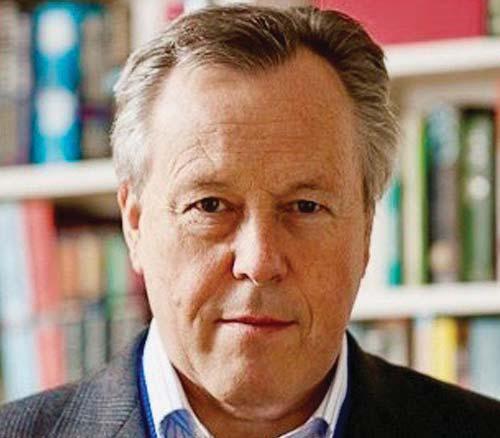
and social transformation?
Diplomacy is typically not ‘agile’ and does not aim to be. Rather, the emphasis is on patience and method, albeit with appropriate energy and ambition. Plus, it’s fine to be agile. But what if your agility makes you jump into a deep, dark hole? Maybe it all comes down to the willingness to take smart risks - and being good at taking smart risks! During this TEXEM programme , Strategic Agility and Inspiring Change: Fuelling Sustainable Success we will discuss actionable insights that will help them win.
What lessons can be drawn from your role as a speechwriter and communicator in the Foreign and Commonwealth Office and for world leaders that apply to leading change and inspiring others in a corporate setting?
Leaders have to mobilise and motivate followers. That normally comes through words that explain actions. Far too many speeches focus on sharing ‘information’ and ignore the importance of motivation. Speeches don’t need to give watertight answers. It’s often enough to pose new
questions or challenge old thinking without giving answers - get the audience thinking for themselves! That said, no speechwriter gets far if the senior speaker does not want to take any risks or say something new and challenging. ‘Let’s play it safe today’ is always a tempting way to avoid responsibility.
In what ways can the case studies of leaders who successfully led through chaos, presented in this programme, benefit from your experience dealing with the fall of communism and apartheid?
Inside stories from these great political or diplomatic dramas are always interesting. They show how hard choices were there to be made and what happened if those choices were embraced or avoided. One interesting problem is Trust - how to focus on delivering ambitious goals while not being naive about the intentions of the people you’re now unexpectedly working with? Lots of examples of these and many more will be shared leveraging TEXEM’s proven and tested methodology that makes learning insightful, practicable, engaging, stimulating and fun.
How does networking with a former senior diplomat like you and other illustrious faculty such as Professor Rodria Laline and Professor Roger Delves on this programme provide participants with unique perspectives on international market trends and leadership strategies? I want programme participants to go away with some new big ideas but also some practical skills they can apply the next day in a tough work context. Great programmes combine theory and practice in a lively, thought-provoking package. This TEXEM programme will entail a methodology that encourages peer-to-peer learning, networking, improved self-awareness and stronger sense of purpose for leaders to achieve their goals more effectively and efficiently. For more information, please visit Strategic Agility and Change Mastery: Fueling Sustainable Success TEXEM
Lagos State Governor, Mr. Babajide Sanwo-Olu, yesterday, expressed satisfaction with the level of ongoing work on the newly refurbished Wole
He said the Centre, formally known as the National Arts Theatre, Iganmu, would soon be completed and ready for public use.
Sanwo-Olu spoke during
an interview with journalists after he led some state officials and stakeholders on a tour of the theatre in Iganmu.
He said the newly transformed Wole Soyinka Centre for Culture and the Creative Arts, which could be compared to the World International Centre, would be completed in about four months.
The governor also commended the Bankers
Committee and stakeholders in the creative sector, who collaborated with the Lagos State Government to transform the National Arts Theatre to bring back the glory of the edifice to meet international standards.
Sanwo-Olu, who seemed excited by the transformation at the Centre in the last four years, said when completed, the Wole Soyinka Centre for Culture and the Creative Arts
would promote arts, tourism, and culture.
He added that it would also be a place where the international community could converge for conferences and host worldclass performances, among other activities.
“I am truly excited at the work the Bankers Committee has been able to do. They have truly shown us that when we put our minds to
things as a country and as a people, we can get the best out of ourselves.
“When we all came here four or five years ago, we were discouraged and saddened by what we saw at one of our national treasures.
But what has happened in the last four to five years, and with what we see today during our tour, we have brought back the old glory even in a bigger, better, and
more transformative way. I commend all the professionals and companies that have put this together.
“I think it is going to be a place where international audiences will see that we are ready to take the world by storm in entertainment, tourism, creativity and, more importantly, business conferences and seminars that we all go to attend in other parts of the world.”
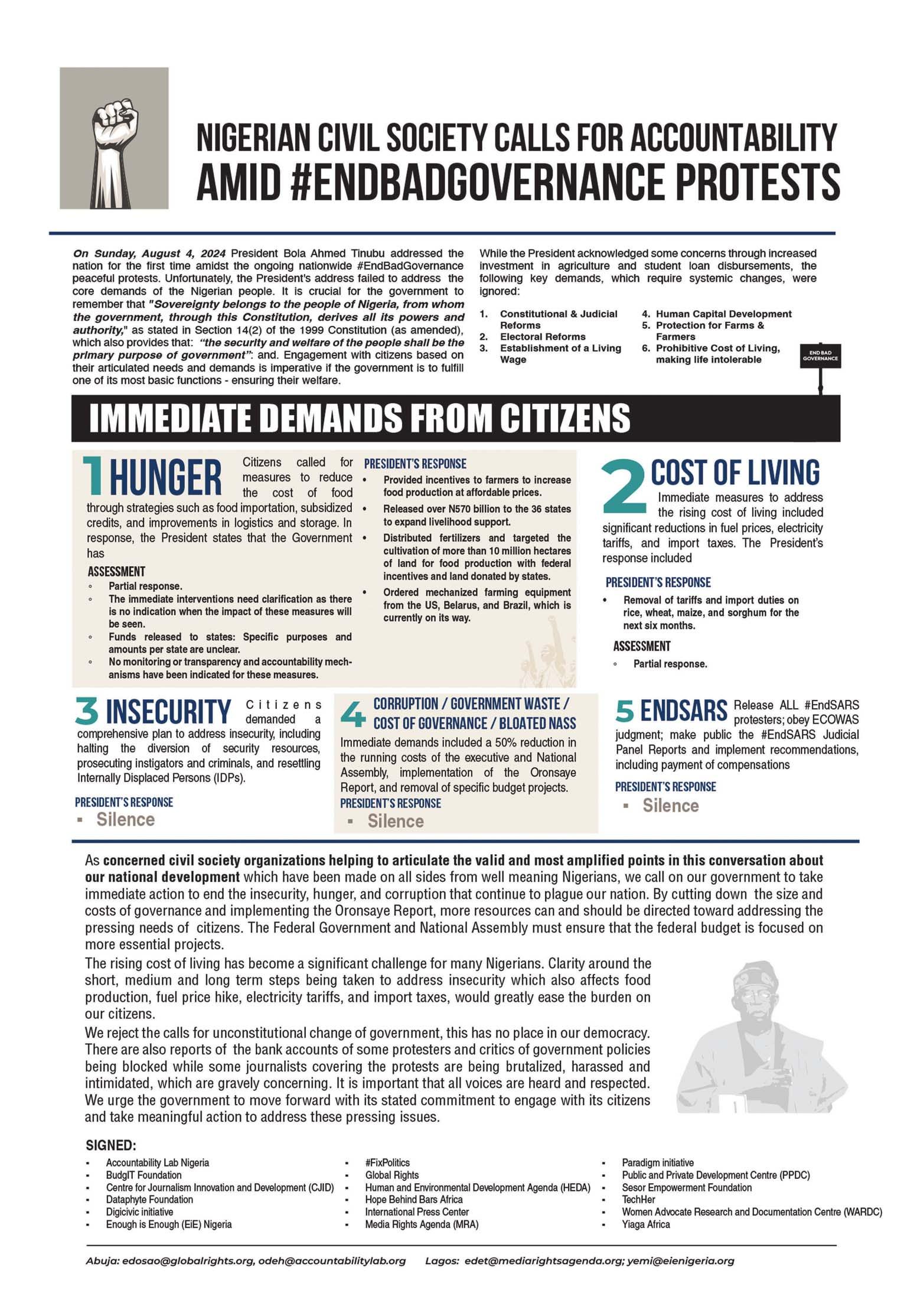


Financial institutions usually spare no expense to show affluence and stability. Fidelity Bank made this exact statement in its rendition of its headquarters building in Lagos. Bennett Oghifo writes
Fidelity Bank’s head office, strategically located at 2 Kofo Abayomi St, Lagos, stands out with its lush green tower, rich landscaping, and energy-saving facilities. These unique features not only make the building visually appealing but also contribute to its sustainability.
The design approach for the bank head office complex, developed by the architects, Ngonyama Okpanum and



Associates, is a testament to their expertise. The complex features interesting streetscapes and a central asymmetric landscaped piazza, thoughtfully arranged for pedestrian movement with a cafe-type pavilion.
They said the external treatments for cladding the simple polygonal 18-storey building are naturally treated bamboo fins for sun screening with double glazing.
With its insulating abilities, double-glazed glass automatically lowers energy bills. As doubleglazed windows reduce heat loss when the weather is cold and cool during the heat period, they allow air conditioners and central heating units to work less and maintain the building at a constant temperature.
Ngonyama Okpanum and Associates is an architectural firm with extensive experience designing



and planning various architectural fields. Ngonyama Okpanum and Associates was founded in the Eastern Cape province of South Africa in 1997 and has since grown significantly to become an international firm.
The founding directors, Sindile Ngonyama, Innocent Okpanum, and Tim-Hewitt Coleman, continue to carry through the founding values of “creativity, excellence, teamwork and integrity.”








In this piece, James Emejo aggregates analysts’ perspectives following the recent moderation in Central Bank of Nigeria’s monetary tightening
In apparent efforts to tackle inflationary pressures and achieve price stability, the Central Bank of Nigeria (CBN) under Mr. Olayemi Cardoso, has raised the Monetary Policy Rate (MPR), the benchmark interest rate, on four consecutive occasions since February.
At its maiden meeting of the Monetary Policy Committee (MPC) in February, the central bank raised MPR by an unprecedented 400 basis points (BSPs) to 22.75 per cent from 18.75 per cent.
In March, CBN also hiked by 200 basis points to 24.75 per cent from 22.75 per cent.
Also at its meeting in May, the MPC opted for a third consecutive interest rate hike, of 150 bps, to a record high of 26.25 per cent.
Furthermore, at its recent meeting in July, the committee resolved to raise the benchmark interest rate by 50 basis points to 26.75 per cent from 26.25 per cent.
The MPR is the rate at which commercial banks borrow from the apex bank and often determines the cost of funds in the economy.
All along, given the current high cost of credit from traditional banks and the attendant hardship it contributes to the economy, analysts have continued to urge the central bank to reconsider its contractionary policy stance in order to support growth.
But the MPC, chaired by Cardoso, had made it abundantly clear that it was determined to pursue its price stability mandate even if it is at the expense of growth.
Why will CBN jettison growth amid economic difficulties?
Oftentimes, central banks often choose to raise MPR to tackle inflation, even if it comes at the cost of slower economic growth.
This is partly because high inflation erodes the purchasing power of money, leading to higher costs of living and uncertainty in the economy. Thus, by raising the MPR, the CBN attempts to make borrowing more expensive, thus reducing consumer spending and business investments - effectively cooling down demand and helping to bring inflation under control.
Another reason is to achieve price stability. The CBN believes that if inflation is high or rising, it is better to curtail it as sustained inflationary concerns could lead to long-term economic instability.
The CBN bank had also adopted aggressively measure to curtail rising prices to maintain its credibility particularly to stabilise financial markets and attract investment, even if it means short-term pain for the economy.
According to Cardoso, the risks of allowing inflation to rise unchecked—such as economic instability, loss of purchasing power, and potential hyperinflation—are often viewed as greater than the costs associated with slower economic growth.
At its last MPC meeting the central bank, further raised the by 50 basis points to 26.75 per cent from 26.25 per cent, the bare minimum increase of all four.
Cardoso said the committee was mindful of the effect of rising prices on households and businesses and expressed its resolve to take necessary measures to bring inflation under control.
The MPC, however, re-emphasised its commitment to CBN’s price stability mandate, expressing optimism that despite the June 2024 uptick in headline inflation to 34.19 per cent, prices are expected to moderate in the near-term.
However, the moderation in MPR hike came amid elevated food prices.
Notwithstanding, the MPC further doubled down on its commitment to stay on course with its tightening cycle in view of the urgent need to address inflationary pressures to consolidate on the gains achieved so far.
The CBN governor particularly hinged the bank’s optimism on monetary policy gaining further traction, in addition to recent measures by the fiscal authority to address food inflation.
Cardoso specifically noted the persistence of food inflation, which continued to undermine price stability, adding that while monetary policy had been moderating aggregate demand, rising food and energy costs continue to exert upward pressure on price development.
He pointed out that the prevailing insecurity in food producing areas and high cost of transportation of farm produce were also contributing to headline inflation.
He said the committee was therefore, not oblivious to the urgent benefit of addressing these challenges as it will offer a sustainable solution to the persistent pressure on food prices, highlighting the increasing activities of middlemen who often finance smallholder
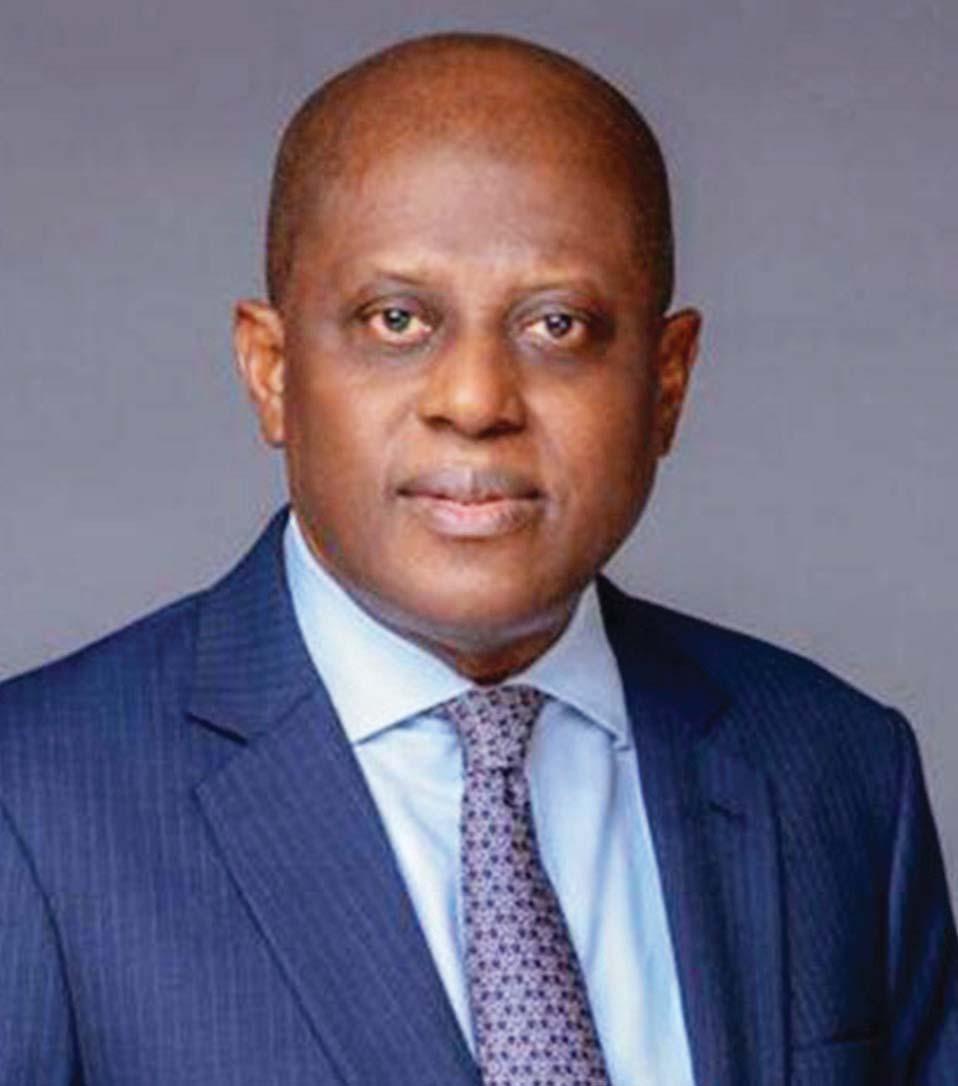
farmers, aggregate, hoard and move farm produce across the border to neighbouring countries.
Many analysists have, however, considered the moderate increase in interest as a sign of positive development for the economy. Others also pointed to the fact that the apex bank may have come to terms that increasing MPR may not be the only viable option to tame inflation.
If any thing, policy rate remains crucial in an economy for control of Inflation as raising the rate.makes borrowing becomes more expensive, which can reduce consumer spending and business investment, slowing down economic activity and, in turn, reducing inflation.
On other hand, lowering the rate could also stimulate spending and investment, which can boost inflation when it is too low.
The monetary policy rate can influence the exchange rate of a country’s currency because higher interest rates tend to attract foreign investment, leading to a stronger currency, while lower rates can lead to a weaker currency, a situation that impacts the balance of trade and capital flows.
MPR policy can also influence job creation as lower rates can lead to increased business investment and hiring, reducing unemployment, while higher rates can have the opposite effect.
Additionally, changes in the monetary policy rate send signals to financial markets and the broader economy about the CBN’s views on the economy.
Chief Executive, Centre for the Promotion of Private Enterprise (CPPE), Dr. Muda Yusuf told THISDAY that the marginal increase in MPR “marked a softening of the MPC’s tightening stance”.
Recently, President Bola Tinubu admitted that the economy was bleeding at the time he took over government, adding, however, that through hard work, his administration had now stopped the bleeding.
The president added said that the past 12 months had been challenging and at the same
time fulfilling, adding that the worst was over.
Cardoso, during the MPC meeting also explained that the various reform initiatives in the FX segment had been positive.
Backing his claims with evidence, he said exchange rate had converged, limiting the opportunities for arbitrage, adding that FX inflows had increased from 37.93 per cent between January and May 2024 to $38.8 billion while net inflows grew by 73.4 per cent May 2024 compared to May 2023.
Cardoso also stated that Diaspora remittances had currently gone up to $2.34 billion in compared to $1.58 billion in the corresponding period last year.
He said capital importation also increased to $5.92 billion between January and June compared to $1.77 billion same period last year.
He said: “So, that is all very positive for foreign exchange management. We have also seen that on the capital markets policies, the capital market has been responding positively and of course, the banking sector.
“We have been very aggressive in giving guidance to the banks with respect to how we want them to position themselves for the future of the $1 trillion economy.
“Inflation targeting is something that is an ongoing process, which we will be giving more and more guidance as we go along.”
The CBN governor insisted that the aim of monetary policy decisions were meant to impact the man on the street, pointing out that the current economy hardship were a result of policy choices by past administrations.
He said: “It is important to cast our minds back and ask ourselves how did we get to where we are today. Let us not forget that over a period of time, we had an economy and have failed to diversify that economy. We would argue that the Nigerian economy has basically been a monolithic one, dependent on one source of revenue.
“Now, of course, a monolithic economy has its own risks. And part of those risks, of course, is that if anything happens to your dependency, then the whole system gets shaken.
“And I guess in many respects, that is part of what we’re going through. Part of it is, not all, certainly part of it because let’s not forget that there are global headwinds as well.
“And that going forward, we must ensure that we are able to craft policies that are sustainable and will bring a sustainable method of development for our people.”
Cardoso said the CBN was currently engaging with the Organised Private Sector (OPS) which had been raising concerns over the continued monetary tightening regime of the bank.
Cardoso also said it was in the overall interest of Nigerians and the economy to subdue inflation. He said: “Inflation really and truly is having a major impact on our economy. Purchasing power is getting eroded. “People are being pushed into different categories of poverty, and it is in their own interest that we are able to take the scourge of inflation.
“If not, the ramifications will also be for them. It’s not on the average man alone. We understand the need for growth and we also understand that it is relatively challenging when you have high-interest rates.
“We also understand that, quite frankly, my belief is that it is so fundamental to the long-term future and stability of our economy that inflation should be brought under control that in the short term these are pains which ultimately will be able to help our economy and help the manufacturing businesses as well.”
On CBN’s recent policy on dormant accounts, Cardoso said the move was in the interest of account holders, adding that the apex bank should be commended for taking the steps to safeguard them from fraudsters.
He said: “Over the years, in my experience what I found personally, is that if you leave the accounts dormant in banks...In fact, most times, they are more susceptible to fraudsters copying your identity and trying to game the system to grab all of your money.
“So, that is a problem that I think most DMBs face and I’m sure if you’ve been on the receiving end, I have been, then you know that anything that can protect you in the process from these kinds of predators will be welcomed.”
He said the policy directive was meant to ensure that all those monies come to the central bank for safekeeping. You don’t lose your money and it is at zero cost to the beneficiaries.
“All that will happen is that the central bank will manage the monies within our position and when the rightful owner surfaces, the money is returned, plus whatever income is accrued to them.
“I think this should be a welcome development, even from the naysayers because at a time like this, we recognise the fact that everybody needs every single penny that belongs to them, to accrue to them and not have a situation where you’re putting money in a particular place and essentially end up losing it. Of course, it will create liquidity within the system as well.”
In separate interviews with THISDAY, analysts expressed their optimism that in deed, the current challenging times may be fading away, despite a high inflationary environment and expensive credit regime.
Director, Institute of Capital Market Studies, Nasarawa State University Keffi/ President Capital Market Academics of Nigeria, Prof. Uche Uwaleke, concurred that there appeared to be light at the end of the tunnel.
He said: “I think so. The worst is over even though the CBN tightening stance has not changed in view of the adjustment in the asymmetric corridor.
“With the harvest season and the implementation of the import duty waiver for basic food items, I see food inflation, which is the pressure point, moderating in the coming months.”
Also, Managing Director/Chief Executive, Dignity Finance and Investment Limited, Dr. Chijioke Ekechukwu, said: “We have clamoured for a reduction in tightening for a while.
“Increasing the MPR by 50 basis point as against the 150 basis points of the previous quarter is an indication that tightening may not continue to be the only measure for reduction of inflation.”
On his part, however, Managing Director/Chief Executive, SD&D Capital Management Limited, Mr. Idakolo Gbolade, said getting the economy out of the woods may still be a long haul.
He said: “The yardstick to measure progress is when inflation is easing and that is not the case presently. Food inflation is on the rise and due to hike in interest rates businesses are paying a higher price on their facilities with bank which has reduced their bottom line.
Oluchi Chibuzor
Caverton Marine Limited, a leading Nigerian provider of marine logistics services, has announced a strategic partnership with ExploMar (Suzhou) Energy Technology Co. Limited. of China.
The partnership, it said in a statement, marks a significant step towards sustainable transportation in Nigeria, as Caverton Marine integrates electric outboard engines from ExploMar into the recently launched passenger ferries aptly named OMIBUS.
The OMIBUS, built by Caverton Marine in its facilities in Lagos, Nigeria, were recently commissioned by the Lagos State government, and are set to revolutionize water transportation in the region. By equipping these ferries with ExploMar’s advanced electric outboard systems, Caverton Marine is not only enhancing the operational efficiency of its fleet but also contributing
to the reduction of carbon emissions and environmental impact.
In addition, Caverton Marine, in collaboration with the Lagos State government, successfully launched a pilot program for the OMIBUS last week to ascertain operating expenses. One of the key takeaways from this pilot program is the significant impact of the removal of the fuel subsidy on operations and, ultimately, the cost of a ferry ticket. This underscores the urgent need to explore alternative cheaper and cleaner forms of propulsion for the ferries.
Commenting on the partnership, CEO of Group Caverton Offshore Support Group, Bode Makanjuola, stated, “This agreement with ExploMar represents a significant milestone in our journey towards sustainable maritime operations. By leveraging ExploMar’s cutting-edge technology, we are setting new standards for passenger ferry services in Nigeria and demonstrating
our commitment to a greener future. This initiative not only supports environmental goals but also aligns with Caverton Marine’s mission to empower local industries. The electrification of our marine vessels showcases the potential for homegrown solutions to address global challenges.”
ExploMar’s CEO, Alex Dong, added, “We are thrilled to collaborate with Caverton Marine on this groundbreaking project. The ferries equipped with our electric outboard systems will serve as a model for sustainable marine transport, not just in Nigeria but across Africa. The partnership was born out of our proactive engagement, recognizing the need for innovative solutions in Nigeria and across Africa. This collaboration promises to deliver substantial benefits, including reduced operational costs, enhanced passenger experience, and a positive environmental impact.”
First City Monument Bank (FCMB) and the Dutch Entrepreneurial Development Bank (FMO) are joining forces to ignite innovation in Nigeria’s agricultural sector through an Agritech Hackathon and Venture Building programme. The initiative, delivered by Heave Ventures, invites startups, entrepreneurs, and innovators to develop solutions for challenges like credit access, infrastructure, and food security.
The programme includes a 48-hour hackathon, a 4-week venture-building residency, and a stakeholder conference. Winners will receive up to N23 million in prizes and further exposure to growth opportunities. Applications for the programme
are now open at on.fcmb. com/AgricTech-Hackathon and will run from August 5 to September 5. Commenting on the programme, FCMB’s Divisional Head, Agribusiness & Non-Oil Exports, Mr Kudzai Gumunyu, said: “This initiative aims to address the perennial pain points in Nigeria and Africa’s agribusiness ecosystems, transforming them into monetised opportunities for innovators. We are indeed excited to partner with FMO and Heave Ventures to organise the Agritech Hackathon and Venture Building programme.”
Technical Assistance Manager at FMO, Martine Sanders, added:
“FMO is thrilled to partner with FCMB on this Agritech Hackathon and Venture Building programme. By empowering early-stage companies through business development services and funding, we aim to foster innovative ideas that address key challenges in the agriculture space, a strategic sector in Nigeria. This initiative is vital for unlocking finance for MSMEs, promoting sustainable growth, and strengthening the ecosystem. This perfectly aligns with the objectives of NASIRA, the portfolio guarantee and technical assistance programme under which FMO and FCMB have partnered, which is funded by the European Commission.”
The Chairman, Geo-Fluids Plc, Jacob Esan, has been inducted as an Associate Member of Chartered Institute of Stockbrokers (CIS) in a colourful ceremony in Lagos.
In inducting Esan at the Institute’s Council Chamber, the 13th President and Chairman of Governing Council, Mr Oluropo Dada, commended him for his passion and dedication towards the Institute’s Professional Examination, which he passed in flying colours.
“I hereby confirm that our inductee today, has gone through the rigours of sitting for, and passing the Professional Examinations of the Chartered Institute of Stockbrokers. That exam is widely regarded as one of the toughest in the
world. Not only that, he has gone through intense practical internship under highly respected senior colleagues, during which he demonstrated a high degree of competence as an investment analyst, with a trustworthy character that makes him stand out as an ethical professional thatcan be trusted by investors in Nigeria and abroad,” Dada.
He noted that Esan’s extensive experience and exposure cut across a broad of range of sectors, including manufacturing, finance, law, construction, real estate as well as oil/gas amongst others. Dada urged him to adhere to the Institute’s Rules and Regulations, saying: “In the stockbroking
profession, the first rule is integrity and our tenet is: My word is my bond. We know you are already familiar with this principle, having had an illustrious banking career. but it is my duty as the President of the institute, to remind you that there is no place for rascality in the stockbroking profession.”
Responding, Esan described his induction as a fulfillment of his life ambition to strengthen his skills and competencies in the financial market.
He expressed appreciation to the Institute and promised to abide with the ethics of the profession and always ready to contribute his quota to the development of stockbroking profession and the market in general.
Sunday Ehigiator
Stanbic IBTC has announced the third edition of the FUZE Talent Hunt, themed ‘Light it Up’, with a grand prize of N50 million to be won.
The initiative, aimed at promoting creativity and innovation among Nigerian youths, invites talents aged 18 to 35 to showcase their abilities in music, dance, fashion, and technology.
In a statement from the company’s Chief Executive
Officer, Olumide Oyetan, the initiative is said to also be aimed at showcasing the rich Nigerian culture through its diverse artistic expressions; thus promoting and lifting the nation’s creative vista.
Olumide passionately urged Nigerian youths to take part in this exceptional, award-winning event.
Emphasising the importance of a fair and transparent selection process, he stated, “The primary aim of the FUZE Talent Show is to provide a supportive platform
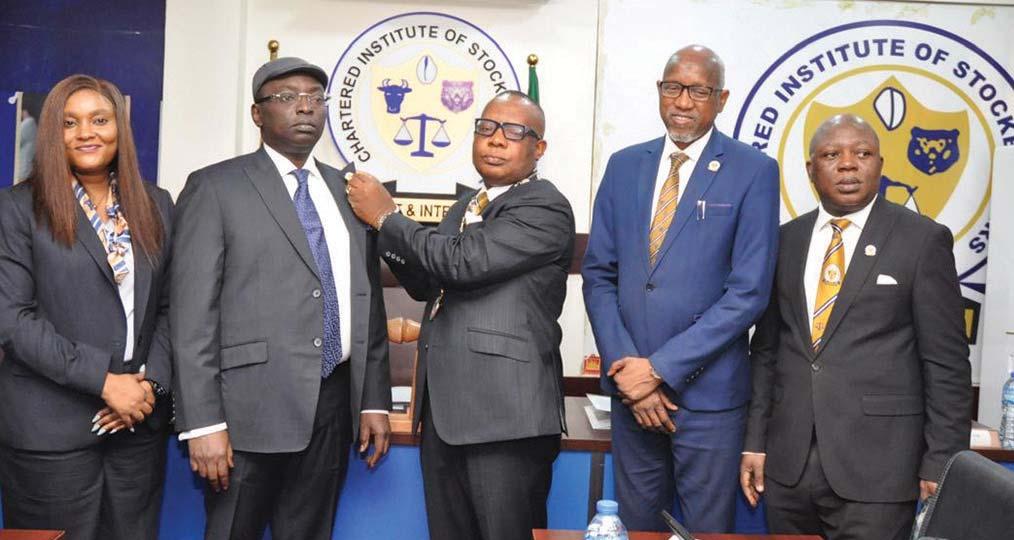
for talented Nigerian youths, allowing them to connect, access essential resources, and receive the necessary guidance necessary for developing their skills. Prospective contestants are invited to join the pursuit of excellence by signing up for FUZE Talent Show 3.0.”
Highlighting the platform’s accessibility, Olumide noted that there are no fees to participate in the audition, making it a genuinely inclusive event.
Kayode Tokede
The market capitalisation of the Nigerian Exchange Limited (NGX), at the end of trade last week, gained N481 billion to close at N55.978 trillion, boosted by investors’ renewed interest in banking stocks.
The NGX Banking index led the gainers’ chart last week, appreciating by 5.14 per cent week-on-week, buoyed by positive news of the Central Bank of Nigeria’s approval for
the merger between Unity Bank and Providus Bank, as well as the reintroduction of the retail Dutch auction system (rDAS) in the foreign exchange market to authorised dealer banks. Consequently, the NGX All-share index appreciated by 0.87 per cent week-on-week (W-o-W) to close at 98,592.12 basis points.
Also, the NGX ASI year-todate return of the index as at August 9, 2024 stood at 31.9 per cent.
Sectoral analysis of last week’s performance revealed a generally positive trend, with most sectors seeing gains, except for the NGX Industrial index, which retreated by 3.67 per cent.
This was followed by gains in the NGX Consumer Goods, NGX Insurance, and NGX Oil & Gas indices, which rose by 2.35 per cent, 1.79 per cent, and 0.97 per cent respectively.
The market breadth for the week was positive as 46 equities appreciated in price, 38 equities
depreciated in price, while 67 equities remained unchanged.
Oando led the gainers table by 60.47 per cent to close at N40.60, per share. R T Briscoe followed with a gain of 51.19 per cent to close at N1.27, while Japaul Gold & Ventures went up by 35.80 per cent to close to N2.39, per share.
On the other side, Champion Breweries led the decliners table by 15.03 per cent to close at N2.77, per share. BUA Cement followed with a loss of 9.99 per
cent to close at N128.90, while University Press declined by 9.92 per cent to close at N2.18, per share.
Overall, a total turnover of 2.679 billion shares worth N49.017 billion in 47,451 deals was traded last week by investors on the floor of the Exchange, in contrast to a total of 3.393 billion shares valued at N52.304 billion that exchanged hands last week in 44,814 deals.
The Financial Services
Industry (measured by volume) led the activity chart with 1.982 billion shares valued at N31.985 billion traded in 23,467 deals; contributing 74.00 per cent and 65.25 per cent to the total equity turnover volume and value respectively. The Oil and Gas Industry followed with 229.680 million shares worth N7.441 billion in 4,021 deals, while the ICT Industry traded a turnover of 113.887 million shares worth N3.059 billion in 4,260 deals.
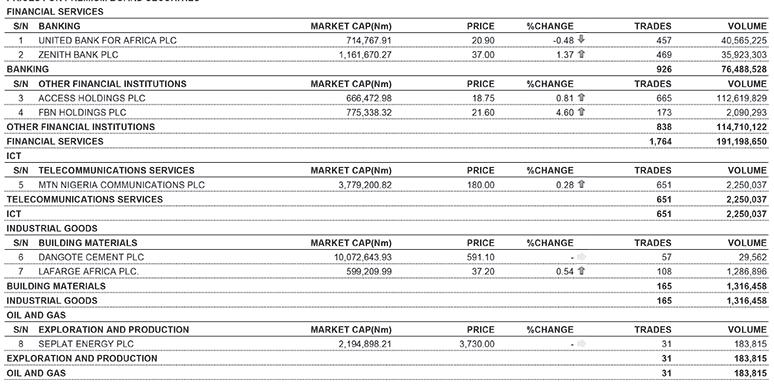
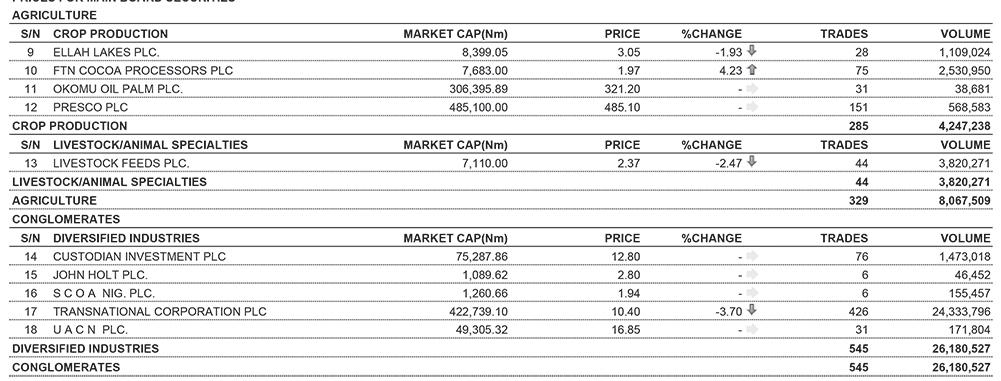

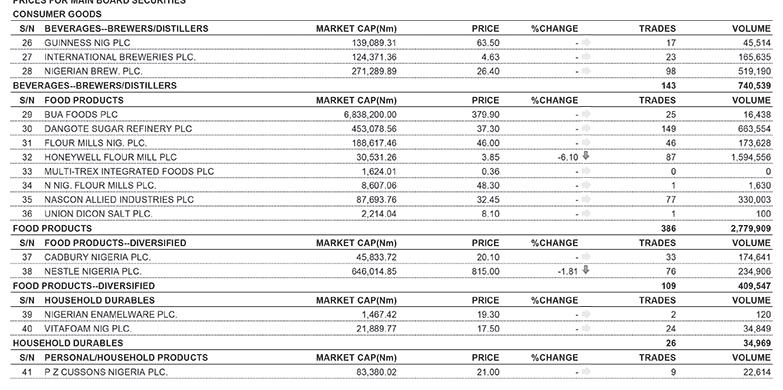





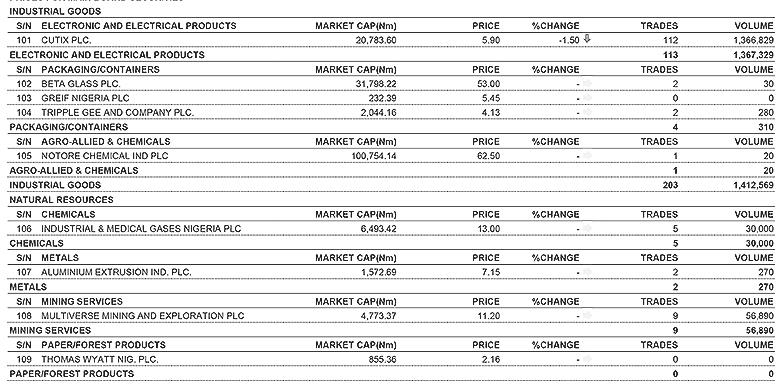

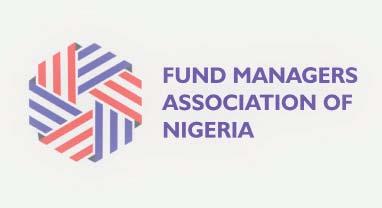
A Mutual fund (Unit Trust) is an investment vehicle managed by a SEC (Securities and Exchange Commission) registered Fund Manager. Investors with similar objectives buy units of the Fund so that the Fund Manager can buy securities that willl generate their desired return.
An ETF (Exchange Traded Fund) is a type of fund which owns the assets (shares of stock, bonds, oil futures, gold bars, foreign currency, etc.) and divides ownership of those assets into shares. Investors can buy these ‘shares’ on the
floor of the Nigerian Stock Exchange.
A REIT (Real Estate Investment Trust) is an investment vehicle that allows both small and large investors to part-own real estate ventures (eg. Offices, Houses, Hospitals) in proportion to their investments. The assets are divided into shares that are traded on the Nigerian Stock Exchange.
GUIDE TO DATA:
Date: All fund prices are quoted in Naira as at 08-August-2024, unless otherwise stated.

In this interview, the Managing Director of Genesys Tech Hub, Olamiposi Ekuma, shares her commitment to harnessing technology’s potential to address local and global challenges. Nosa Alekhuogie presents the excerpts:
What inspired the creation of the Genesys Startup Boost, and how has it evolved since its inception?
The Genesys Startup Boost was created to bridge the gap between innovative ideas and the practical skills needed to turn those ideas into reality. We noticed that many young entrepreneurs had great concepts but lacked the support to develop, launch, and scale their solutions. This program was designed to offer mentorship, resources, and a supportive community to guide these startups from their early stages to market entry. Over time, the program has grown to include a more structured mentorship process, collaborations with industry leaders, and expanded access to a broader network of investors and partners.
What are the key challenges you have faced in empowering young Nigerians with digital skills, and how have you overcome them?
One of the major challenges has been access to essential resources like laptops and reliable internet. Many young Nigerians are eager to learn but lack the necessary tools. I recall launching a campaign to collect used laptops from affluent kids who had more than one and then distributing them to underprivileged learners. Regarding internet access, we have had to provide stipends to help participants purchase internet bundles for our main learning programmes. Limited access to the internet not only restricts learning but also cuts young people off from discovering the vast opportunities, trends, and global advancements they could tap into to solve pressing problems.
Another challenge is the gap in foundational skills, which requires us to tailor our training programs to begin with basic digital literacy before progressing to more advanced topics. I remember working on a project in Ebonyi where one participant did not even know how to use a mouse. It is a humorous moment, but it highlights a real issue. While planning TxE, I had to engage in extensive mobilisation and pre-summit activities to ensure participants had a basic understanding of the concepts, so they could fully engage in the discussions. A tiered learning approach has also proven effective, ensuring that everyone, regardless of their starting point, can progress through our programs.
How do you identify the local challenges that your programs aim to address?
Identifying local challenges begins with directly engaging the communities we aim to serve. Many of the skills development initiatives I have designed stem from either accessing opportunities or struggling to find qualified candidates for available roles. While it is often said that there are no jobs, the reality is that jobs exist, but there is a shortage of skilled talent. I believe that with the right skills and mindset, we can create even more opportunities.
When I started my journey in Enugu, it felt like anyone who became proficient in tech had to move to bigger cities like Lagos for two reasons: to find work and to access mentorship, learning resources, and opportunities for growth. My mentor, Mr. Kingsley Eze, the founder of Genesys and a native of Enugu, was determined to establish a hub of innovation and learning right in the heart of Enugu. We realised we could not only become a talent factory but also drive economic growth within the state through innovation. We have come a long way since we started in 2016.
Can you discuss the mentorship process in the Genesys Startup Boost and how it helps budding entrepreneurs scale their solutions?
The process is highly personalised and hands-on. We match each startup with seasoned mentors who have expertise in relevant industries. These mentors guide the

startups through every step, from product development to market strategy and scaling operations. Our approach allows founders to implement action items, and then return with the results for further refinement. What sets our mentorship apart is its emphasis on practical, actionable advice.
Mentors help participants set realistic milestones, troubleshoot challenges, and connect with potential partners or customers. This ongoing support is essential in helping startups refine their products, pivot when needed, and scale their solutions to meet market demands. Additionally, we include an investment readiness component. Once the founders have refined their solutions, they are introduced to potential investors, preparing them to secure the funding needed to grow their businesses.
How do you ensure that the digital entrepreneurial skills imparted are aligned with the needs of the local market and sustainable development goals?
Since we provide talent to both local and international businesses, we stay attuned to the evolving needs of the industry through ongoing consultations with industry experts, employers, and alumni who are now working across various sectors. By aligning our curriculum with these insights, we ensure that the skills we teach remain relevant and in demand. We also place a strong emphasis on entrepreneurship that tackles local challenges, such as access to healthcare, education, and clean energy. This approach ensures that our graduates are not only employable but also prepared to contribute to sustainable development within their communities.
How do you stay ahead of the curve regarding technology trends and innovations to effectively empower young Nigerians?
I like to say that innovation is inherently local. In our training, we emphasise the importance of identifying local problems and developing solutions tailored to those challenges. We encourage our participants to view technology primarily as a tool for problem-solving and for scaling the impact of those solutions. We also foster a culture of experimentation, questioning the status quo, open communication, and idea-sharing, elements I consider essential to the innovation process. To stay current with trends, I see myself as a lifelong learner and an avid reader. I actively engage in conversations at various levels, both locally and internationally, because you cannot learn what you do not know unless you listen to those who do. Additionally, I am involved in several global networks and communities of thought leaders, innovators, and entrepreneurial support organisations (ESOs), which provide me with access to a wealth of information and insights.
What were some of the most impactful initiatives you led at TxE Africa, and what were the outcomes?
One of the most impactful initiatives at TxE Africa was creating a large-scale tech community that brought together over 22,000 African youths. We developed and implemented more than 20 skill development programs in areas like software engineering, data analysis, digital marketing, business analysis, and product design. These programs not only equipped participants with in-demand skills but also provided them with scholarships, laptops, mentorship, and career development opportunities. We also successfully organised Nigeria’s largest tech summit for two consecutive years, fostering collaboration between young tech talents and industry leaders and driving innovation and growth in the African tech ecosystem. The first summit saw over 28,000 registrations, while the second had over 30,000. One of the key
takeaways from this experience is the immense hunger for opportunities among Nigerian youths. Although the summit was held in Enugu, participants came from all over the country. I recall a young attendee from Sokoto who began his journey two days early just to make it on time. Many attendees were eager for the chance to win laptops, as they had been learning for some time but lacked access to these essential tools. Witnessing their determination and enthusiasm to learn more about tech and how to get started was a life-changing experience for me.
What are your plans for the future, considering the several projects you have?
Since my work at Genesys, I have expanded my focus and am now leading a $7 million project aimed at scaling access to education in Africa by funding and supporting innovators tackling educational challenges. The greatest need now is the opportunity to amplify the impact we have designed over the past few years. Looking ahead, my vision is to broaden our reach across Africa, scaling our training programs to empower more young women and youth. We are also forging partnerships with international organisations and tech companies to bring global opportunities to our participants. Another key focus will be enhancing support for startups through improved incubation and acceleration programs. We aim to build a stronger ecosystem that not only nurtures early-stage startups but also helps them scale and access international markets. Additionally, we are exploring ways to integrate cutting-edge technologies, like artificial intelligence and machine learning, into our curriculum to ensure participants stay at the forefront of innovation.
How do you envision the role of technology in addressing future local and global challenges?
I believe technology will become increasingly vital in addressing both local and global challenges. From enhancing access to education and healthcare to driving economic growth and combating climate change, technology offers the potential to develop scalable solutions with far-reaching impacts. Locally, I see technology as a powerful tool to empower marginalised communities by providing them with the skills and opportunities needed to improve their livelihoods. On a global scale, I envision technology fostering greater collaboration and knowledge-sharing across borders, enabling us to more effectively address shared challenges. However, for technology to truly realise its potential, it must be both accessible and inclusive. That is why I am committed to ensuring our programs continue to bridge the digital divide and equip young people with the skills necessary to contribute to a more equitable and sustainable future.
What advice would you give young leaders who aspire to make a significant impact in technology and community development?
My advice to young leaders is to remain curious, be resilient, and always prioritise the needs of the community in your efforts. The tech landscape is constantly changing, so it is essential to stay informed and be ready to adapt your strategies as new challenges and opportunities emerge. Building a strong network is equally important. Surround yourself with mentors, peers, and collaborators who can provide guidance, support, and diverse perspectives. Do not shy away from taking risks and learning from failures—they often offer the most valuable lessons.
Lastly, remember that impact goes beyond just creating innovative solutions. It is about making sure these solutions are accessible, sustainable, and genuinely meet the needs of the communities you serve. Stay true to your values and let your passion for making a difference drive your work.

L-R: Vice President of Unuedo Renaissance, Mrs. Sarah Ajose-Adeogun; Edo State governorship candidate of the African Democratic Congress, Mr. Osarenren Derek Izedonmwen; Peoples Democratic Party governorship candidate, Mr. Asue Ighodalo; governorship candidate of Labour Party, Mr. Olumide Akpata; and President of Unuedo Renaissance, Mr. Nuhu Yakubu, during a town hall meeting for the frontline candidates organised ahead of the September 21 Edo State governorship election by the association in Lagos…recently
Alex Enumah in Abuja
A Certified True Copy (CTC) of the judgement of a Court of Appeal in Abuja has revealed that the appellate court never voided the nomination of Mr. Asue Ighodalo as candidate of the People’s Democratic Party (PDP) in the forthcoming governorship election in Edo State.
The CTC sighted by Thisday on Sunday showed that contrary to reports in the social media, the three-member panel of the appellate court had in their July 22, judgement, dismissed the case of the appellant, Mr. Philip Shuaibu for being incompetent and lacking in merit.
The CTC has therefore laid to rest the dust raised over the participation of Ighodalo in the
September 21 governorship election in Edo State.
An APC leader and Senator representing Edo Central District, Comrade Adams Oshiomhole, had alleged that the Court of Appeal invalidated Ighodalo’s candidacy and therefore he was not “electable”. Oshiomhole had made the allegation last Tuesday while appearing as a Guest on a popular national TV program.
However, a 60-page CTC Judgement of the Court of Appeal made available to newsmen revealed that Oshiomhole’s claims were untrue as the appellate court clearly ruled in favour of Asue Ighodalo and dismissed Phillip Shaibu’s case with a fine of one million naira.
Justice James Omotosho of a
Economic Prosperity: Plans Underway to Rejuvenate Ogbomosoland Cultural Heritage, Says Former Presidential
Former Special Adviser on Information and Culture to former President Muhammadu Buhari, now Chair, Ogbomosoland Committee for Arts and Culture, Prince Williams Adeleye, has revealed plans are underway to rejuvenate the cultural heritage of Ogbomosoland.
This will also include showcasing its cultural values to the outside world, with the intent of promoting peace, creating jobs, and developing the city economically.
Ogbomosoland consists of five local government councils in Oyo State. They are Ogbomos South LGA, Ogbomoso North LGA, Surulere LGA, Ogo Oluwa LGA and Orire LGA.
Speaking with THISDAY in Ilorin over the weekend on the sideline of the recent meeting of the committee, Adeleye stated: "Many countries, including the United Arab Emirates, United Kingdom, Malaysia, Kenya, South Africa, and Rwanda, have thrived on tourism.
"And we are aligning with the position of the federal and state governments in promoting domestic tourism, arts and culture.
"Apart from the rich cultural heritage, Ogbomosoland is blessed with a wealth of tourism potential, historical relics, and artifacts, including ancient palaces,
shrines, cultural festivals, deities, masquerades, and various forms of cuisine that attract both local and foreign visitors".
"Ajomogbodo, the Egungun that is supernaturally capable of sitting comfortably in air or space without the aid of a stool or chair, Danafojura, whose mystery is bathing in fire while shouting of cold, Ayilere whose attribute is wallowing in any available muddy water; Arenugbongi with a mouth protruding like birds’ beak, the energetic Lobanika, the king’s Egungun that brandishes poisoned sword and many more are still much more around and they will display during the festival.
"Festivals are celebrated annually in Ogbomosoland. The Egungun festival and Odun Oole Oba, a special cuisine festival, have been particularly popular, attracting tourists from both within and outside the country.
"We are now working towards rejuvenating the cultural heritage and showcasing it to the world, with the intent of promoting peace, creating jobs, and developing the city economically".
He therefore said that, the committee has lined up series of activities scheduled to hold between December 19 and 24, 2024 in the town so as to showcase the cultural and tourism potentials of Ogbomosoland.
Federal High Court in Abuja, had on May 27, dismissed Shuaibu’s suit challenging Ighodalo’s nomination, for lacking merit.
Justice Omotosho in a judgement held that Shuaibu lacked the necessary legal rights to challenge a primary that he never participated, adding that the plaintiff’s claim of exclusion was baseless having failed to exploit guidelines for resolution of grievances before rushing to court.
Subsequently the court held that Dr. Asue Ighodalo was validly nominated as PDP Candidate in the February 22 primaries which held in Benin City, Edo State. Dissatisfied, Shuaibu had appealed the verdict of the trial court and urged that it be set aside on alleged claim that the judgement of the trial court was perverse and that the trial court did not also go into the merit of his case before
dismissing it.
But, the three-member panel in a unanimous judgement delivered by Justice, A. M Lamido, disagreed with Shuaibu.
Delivering judgement in the suit marked: CA/ABJ/CV/642/2024, the Court of Appeal Abuja had held that it lacked jurisdiction to entertain the case of the appellant in the first place, on grounds of locus standi.
The court in its ruling agreed with position of the trial court that the appellant lacked the locus standi to institute and maintain a proper action against the respondent having not participated actively in the February 22 primaries of the People's Democratic Party (PDP) which he had challenged.
The appellate court also held that Shaibu's suit is premature and incompetent for his failure to fulfill a condition precedent
which requires an aggrieved party in a primary to submit to internal dispute resolution mechanism before filing an action in court.
Furthermore, the Court of Appeal ruled that the appellant hinged his case on alleged disenfranchisement of delegates and by extension argued that votes were unlawful allocated to the respondent but failed woefully to adduce any iota of evidence in proof of his allegations.
"There is no evidence either from the depositions in his affidavit or documents annexed to his originating summons tending to show that votes were allocated to the 4th respondent Ighodalo unlawfully," Abubakar Lamido JCA held.
"In the light of the above, it is my considered opinion that the appellant Shaibu did not prove his case to be entitled to the reliefs sought. The issues are resolved
against the appellant Shaibu and in favour of the respondents. This appeal lacks merit and it ought to and is hereby dismissed.
“Costs of N1,000,000 to each respondent," the Judgement further read.
Following these revelations, the coast is now clear regarding the authenticity and validity of the primaries which produced Dr. Asue Ighodalo as candidate of the PDP. The appellate court, in this judgement, also settled and discountenanced the issue of alleged unlawful exclusion of 393 delegates earlier determined by Justice Ekwo of the Federal High Court Abuja. Meanwhile, further investigations on INEC's portal reveals that Dr. Asue Ighodalo is the PDP candidate in Edo State governorship election, as his name and particulars are published in the final list of candidates released by the commission.
Michael Olugbode in Abuja
Multi-billion-naira worth of cocaine concealed in heavy duty automobile pivot shafts, and Ghanaian fabric, Kente, among others have been recovered in a nationwide operation by the National Drug Law Enforcement Agency (NDLEA).
In a statement, Sunday, revealing that the operation was intelligence-led, spokesman of the anti-narcotics agency Femi Babafemi noted that 2.32 kilogrammes of cocaine concealed in Ghanaian traditional kente materials going to the United Kingdom were intercepted at a courier firm in Lagos last Monday.
The statement also revealed that10.494 kilogrammes of same class-A drug buried in heavy duty pivot shafts heading to the United States were recovered at the same logistics company after the NDLEA sniffer dogs fished out the automobile spare parts containing the illicit drug, bringing the total weight of cocaine seized in the two shipments to 12.814 kilogrammes.
Babafemi added that five other consignments going to the United States, United Kingdom and Canada were also intercepted at the courier firm in Lagos last on Friday.
The intercepted consignments
include 517 grammes of cocaine in clothing materials; different quantities of pentazocine injection, promethazine injection and cocodamol pills, all heading to the UK as well as 297 pills of tramadol 225mg going to Canada.
He said in a different logistics company in Lagos, NDLEA operatives recovered 21 parcels of Loud, a synthetic strain of cannabis weighing 10 kilogrammes coming from the US and meant for delivery in Abuja.
Babafemi said in another intelligence-led operation, NDLEA operatives last Wednesday arrested a member of a cocaine trafficking network, Obiora Agudosi, at Alafia Orile, Amuwo Odofin area of Lagos while attempting to move 9 kilogrammes of cocaine to Onitsha, Anambra State.
He also said two members of another cocaine syndicate based in Nnewi and Oba town, Anambra State, were arrested last Thursday in a follow up operation following the seizure of their consignments in a GUO transport company bus at Benin, Edo State, same day.
He noted that while the bus driver, Harrison Mbachu, 44, was arrested at Benin tollgate with a total of 2.865 kilogrammes cocaine, Izuchkwu Arinze, 40, was picked at Nnewi town while attempting
to collect his own consignment of 1.748 kilogrammes cocaine and 514 grammes sodium bicarbonate, with Ameachi Okoro, 39, arrested while trying to pick his own 1.117 kilogrammes cocaine at Oba town.
Babafemi disclosed that NDLEA operatives at Tincan Seaport, Lagos, last Wednesday intercepted 532 parcels of Loud, a synthetic strain of cannabis weighing 265.25 kilogrammes in a black Toyota Sienna bus, which is one of the three vehicles in a container marked MSMU 6029570 coming from Montreal, Canada.
He said the seizure was made during 100% joint examination with men of Customs Service and other stakeholders, and that the following day, Thursday, the operatives recorded yet another seizure of 75 parcels of same substance weighing 37.5 kilogrammes in a container marked FSCU-9274613, that came from Canada.
In Adamawa State, NDLEA operatives last Thursday with the support of men of operation Farauta Sector 3, Mayo Belwa, arrested 49-year-old Joseph Peter with 425 compressed blocks of cannabis sativa weighing 291.2 kilogrammes in his Toyota Camry car marked Lagos KSF 381 HM. He claimed he was bringing the
consignment from Edo State to deliver in Yola, Adamawa State.
While two suspects: Adekunle Sunday Adebayo, 50, and Yahaya Mamuda, 35, were arrested at Gadar Tamburawa area of Kano last Tuesday with 29.5kg cannabis, NDLEA operatives in Lagos recovered 1,169 kilogrammes of the same psychoactive substance from a bus along Orchid Road, Ajah, last Sunday.
No less than 1,230 kilogrammes cannabis was destroyed on three hectares of farmland at Ikeje Forest, Edimogo Village, Igalamela/ Odolu LGA, Kogi State last Friday by NDLEA officers supported by men of the Nigerian Army while the owner, Danjuma Maji, 40, was arrested.
He said with the same drive, commands and formations of the agency across the country continued their War Against Drug Abuse (WADA) sensitization activities in schools, worship centres, work places and communities among others in the past week.
Meanwhile, the Chairman/Chief Executive Officer of NDLEA, Brig. Gen. Buba Marwa (Rtd) has urged them and their compatriots across the country to continue with their current balanced approach to drug supply reduction and drug demand reduction efforts.
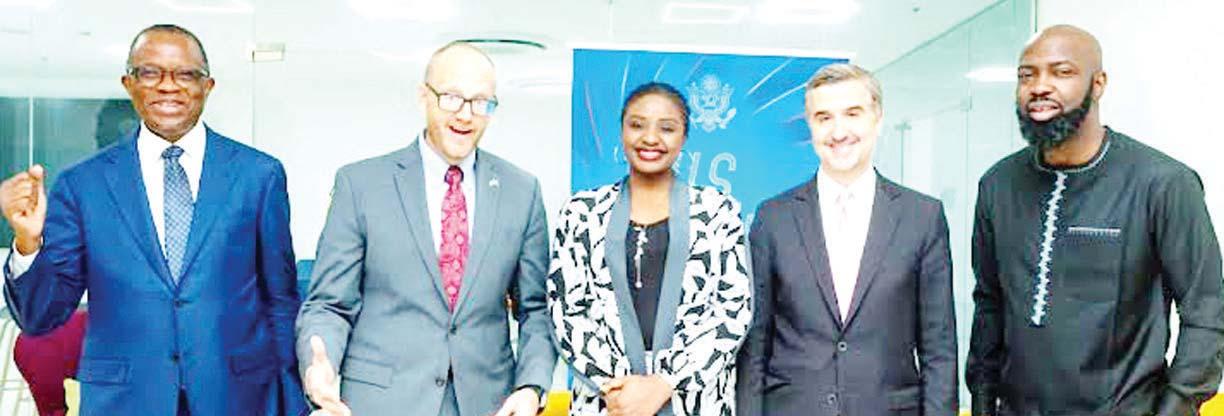
MEETING
L-R: Chief Executive Officer, 21st Century Technologies Limited,Mr. Wale Ajisebutu; U.S. Consul General, Mr.Will Stevens; Founder, Africa Global Market, Inya Lawal; Assistant Secretary for Economic and Business Affairs, U.S. Department of State,Mr. Ramin Toloui; and Executive Vice-Chairman, Chocolate City Group, Mr. Audu Maikori during stakeholders meeting in preparation for the third edition of the African Creative Market (ACM) flagship event set to take place from September 17th to 20th at the Landmark Event Centre, Victoria Island, Lagos
Urges designation of Africa’s most populous nation as ‘Country of Particular Concern’ Says Nigeria fails to prosecute perpetrators of violence related to blasphemy
United States Commission on International Religious Freedom (USCIRF) at the weekend, in a report, stressed that religious freedoms were constantly being trampled upon in Nigeria.
USCIRF said the report provided an update on continuing systematic and ongoing restrictions on freedom of religion or belief in Nigeria.
It said several states in Nigeria were currently enforcing blasphemy laws to prosecute members of faith-based groups, including Christians, Muslims, and secular humanists.
In the 2024 Annual Report, USCIRF said, “The government also continues to tolerate egregious violence against religious groups by non-state actors, such as the Islamic State-West Africa Province (ISWAP), JAS/Boko Haram, and other extremist groups.
“This violence affects large numbers of Christians and Muslims in several states across Nigeria and targets both religious sites and individuals from religious communities.”
USCIRF recommended that the US Department of State should designate Nigeria as a “Country of Particular Concern” for engaging in what it said was a systematic, ongoing, and egregious violation of religious freedom.
USCIRF is an independent, bipartisan federal government entity established by the US Congress to monitor, analyse, and report on religious freedom abroad.
It makes foreign policy recommendations to the US president, the Secretary of State, and Congress intended to deter religious persecution and promote freedom of religion or belief.
The organisation is chaired by Stephen Schneck, while Eric Ueland is the vice chair.
Stressing that Nigeria's 1999 Constitution stated that the federal and state governments could not adopt an official religion, USCIRF stated that at the same time, the constitution permitted the use of Shari'a and traditional law courts for non-criminal proceedings at the state level, but did not compel all citizens
to abide by them.
It stated that currently, 12 states in northern Nigeria, along with the Federal Capital Territory (FCT), had implemented Shari'a legal frameworks and some were applying Shari'a in criminal cases.
USCIRF stated in the report, “Sharía codes prohibit blasphemy and other offences based on Islamic law, as interpreted by each state's high court. Shari'a courts utilise a religiously grounded penal code, including for serious criminal offenses, and specify punishments, such as caning, amputation, and stoning.
“The Nigerian government continues to imprison individuals accused of blasphemy and often fails to pursue perpetrators of violence related to blasphemy allegations.”
The US commission stated that Nigerian authorities arrested humanist Mubarak Bala in 2020 on blasphemy charges over a Facebook post considered insulting to Islam. It said in 2022, the Kano State High Court sentenced him to 24 years in prison.
USCIRF said in February 2024,
Kano State Court of Appeal granted Bala's appeal, and in May the court sentenced him to five years.
In another instance, USCIRF said Sufi Muslim Yahava Sharif-Amina had remained imprisoned since 2022 for sharing audio messages deemed "insulting to the religious creed".
The report added that the Nigerian authorities arrested Sufi Sheikh Abduljabar Nasiru Kabaru for blasphemy in 2021 and sentenced him to death in 2022, stressing that he remains in prison.
USCIRF stated, “The government arrested Muslim Ismaila Sani lsah on blasphemy charges in 2021 and he remains in prison as well. Sufi cleric Abdulazeez Inyass, arrested in 2015 on blasphemy charges, remains in prison and is facing a death sentence.
“Authorities released Christian Rhoda Jatau from prison on bail in December 2023 but she still faces charges of ‘inciting public disturbance’ and ‘contempt of religious creed’ after her arrest in May 2022.
“Nigeria's government at both the federal and state levels continue to
The Arochukwu Kingdom in Abia State is in quandary as the state government prepares to appeal a court order mandating Governor Alex Otti to withdraw the staff of office issued to Nwa Mazi Eberechukwu Kanu Oji as Eze Aro IX.
The coronation of Oji as Eze Aro IX on July 27, 2024 and the subsequent court order nullifying the event have further deepened the cracks among the 19 kindreds that constitute the Arochukwu Kingdom.
While some kindreds led by Ibom Isii are sticking with the earlier crowned Eze Aro, Godwin Kanu Idei and have hailed the court order, other kindreds backing Eberechukwu Oji have frowned at the order and would join government in the impending appeal.
The Abia State Attorney General and Commissioner for Justice, Mr.
Ikechukwu Uwanna, has already signified that government would not only appeal the court but also apply for stay of execution of the order.
The Abia State High Court in Umunneochi presided by Justice C. Chido Nwakanma had on July 31, 2024 ruled that the coronation of Eze Aro was a nullity following a motion on notice filed in suit No.HUM/1/2024.
The court held that the coronation was held sub judice since the suit over the tussle for Eze Aro stool is still pending in court hence the state government should not have authorised the coronation.
Aside from Governor Otti, the mandatory court order also affected other government officials, including the Attorney General, Ikechukwu Uwanna, the Commissioner for Local Government and Chieftaincy Affairs, Prince Uzo Nwachukwu and his ministry. They were all "mandated and
compelled" to withdraw the staff of office from Eberechukwu Oji.
The court also ordered that all parties in the suit should return to their former positions and conditions pending the determination of the matter.
The court further restrained Nwa Mazi Pastor Eberechukwu Eni Kanu Oji from parading himself as Eze Aro of Arochukwu Kingdom.
In addition, the court restrained all the respondents and their agents in whatever name or nomenclature from harassing, intimidating or threatening the 19 Eze Ogos, Eze Asaga, Eze Ezeagwu, Eze Ibom Isii with dethronement, arrest and detention in whatever manner.
These multiple orders in effect meant the court recognized that His Majesty Eze Godwin Kanu Idei Kanu Okoro Oke was already crowned as at October 20, 2023 before the suit was filed.
It also voided the crowning of Nwa Mazi Pastor Eberechukwu
Eni Kanu Oji as Eze Aro pending the conclusion of the legal tussle to determine the authentic Eze Aro IX.
Aside from the staff of office, the certificate of recognition issued to him on January 26, 2024 was also voided pending the determination of the suit.
The suit over the Eze Aro stool was instituted by the President General of Ibom Isii Kindred, Mazi Adolphus Nwankwo, Mazi Kingsley Okoro Oke for the ruling families of Oro Okennachi and Mazi Dike Ezenta for a group known as Concerned Umuaro for Justice and Equity from the 19 villages of Arochukwu Kingdom.
Joined as defendants are Mazi Udo Chijioke, Nwa Mazi Eberechukwu Kanu Oji, Rev Uma Ukpai and other pastors listed for the coronation, Sam Wonder, Attorney General, Governor Otti, LG Commissioner, Ministry of Local Government Areas, HRH Eze Kanu Nwa Kanu, and HRM Godwin Okoro Oke.
tolerate attacks by non-state actors who testify their violence on religious grounds. Islamist and some Fulani militant groups have expressed a goal of overthrowing secular governance with the intention of enforcing a singular interpretation of Islam.”
The report disclosed that approximately 30,000 Fulani bandits operated in several groups in Northwest Nigeria, with groups consisting of anywhere from 10 to 1,000 members.
It said, “These groups engage in violence and banditry targeting predominantly Christian communities in Nigeria and generally pose the greatest security threat in North-west Nigeria.
“This activity includes kidnapping, rape, property and cattle theft, illegal possession of weapons, and murder. The specific perpetrators of and motivation behind individual attacks can be difficult to verify.”
Emmanuel Addeh in Abuja
The Nigerian Association of Chambers of Commerce, Industry, Mines, and Agriculture (NACCIMA) has appointed the President of the Oil Palm Growers Association of Nigeria (OPGAN), Joe Onyiuke as the Vice Chairman of the NACCIMA Agribusiness Trade Group.
In a statement, Dele Oye, the National President of NACCIMA, said Onyiuke will work closely with the chairman to provide leadership and strategic direction to NACCIMA in the agribusiness sectors of the Nigerian economy.
“I am delighted to inform you of your appointment as the Vice Chairman of the NACCIMA Agribusiness Trade Group. This appointment is a testament to your extensive experience and remarkable contributions to the agricultural sector, particularly in the cultivation and promotion of oil palm in Nigeria.
“As Vice Chairman, you will work closely with the Chairman to provide leadership and strategic direction to NACCIMA in the agribusiness sectors of the Nigerian economy.
“Your role will involve advocating for policies that support agribusiness, fostering collaboration among stakeholders, and driving initiatives that enhance the growth and sustainability of the sector,” Oye stated.
“Onyiuke brings his vast experience spanning over 25 years in corporate, legal, and entrepreneurship into the business of agriculture. He is passionate and desirous of fostering and promoting the cultivation/ growing of oil palm, including
harnessing the entire value chain in Nigeria.
“His advocacy and push to increase the number of oil palm producing states from 24 to 27 states have yielded the desired result, as they are now fully recognised and supported by the federal ministry of agriculture and food security.
“He has been at the vanguard of championing the revamping of the oil palm ecosystem as well as addressing the Nigerian oil palm challenges while contributing to food security in Nigeria.
“In order to address the issues of farmer education and extension service, he set up oil palm radio and TV to cater to the needs of farmers and bring them up to date with best management practices in the growing/maintenance of oil palm plantations.
“Onyiuke was the national legal adviser to the National Cotton Association of Nigeria, NACOTAN. He was also in the banking industry and worked in different departments, including Credit and Marketing, Legal, Risk Management, and Classified Assets, where he excelled by winning different awards before his voluntary resignation to pursue other passions.
“ He is on the board of several agricultural and corporate initiatives and ventures. He is the managing director of Ayip Eku Oil Palm Company Limited. He is married with children and plays golf and lawn tennis,” the statement said.
Oye stated that Onyiuke’s leadership and expertise will be invaluable to NACCIMA as it strives to lead and innovate within the agribusiness sectors.

Chuks Okocha in Abuja
Socio-Economic Rights and Accountability Project (SERAP), has urged President Bola Tinubu to “direct the Attorney General of the Federation and Minister of Justice, Lateef Fagbemi, SAN, and appropriate anti-corruption agencies to investigate the spending of $1.5 billion World Bank loan obtained by the 36 states and Abuja for poverty reduction
and social protection across the states.”
“Suspected perpetrators of corruption and mismanagement should face prosecution as appropriate, if there is sufficient admissible evidence, and any proceeds of corruption should be fully recovered.”
SERAP also urged him to “direct Mr Fagbemi and appropriate anti-corruption agencies to promptly investigate the alleged
mismanagement of the Chinese loans of $3.121 billion obtained by the Federal Government.”
SERAP urged him to “instruct the Economic and Financial Crimes Commission (EFCC) and Independent Corrupt Practices and Other Related Offences Commission (ICPC) to jointly track and monitor the spending of the $1.5 billion World Bank loan to Nigeria’s 36 states and Abuja.”
In the open letter dated
10 August 2024 and signed by SERAP Deputy Director, Kolawole Oluwadare, the organisation said: “Ensuring accountability for the spending of World Bank loan and Chinese loans would build trust in democratic institutions with the ultimate aim of strengthening the rule of law.
“Impunity for corruption in the management of World Bank loans and Chinese loans will continue as long as high-
Mourns ex-Rangers legends, loss of lives during hunger protests Dogara rebukes Bauchi gov over comments against Tinubu
Chuks Okocha in Abuja and Segun Awofadeji in Bauchi
The 2023 presidential standard bearer of the Labour Party, Peter Obi, has berated Nigeria's sports leadership for the disastrous outing by Nigeria in the justended 2024 Olympics in Paris.
Nigeria finished with no medal after putting in billions of naira, where nine African countries won medals.
Obi, however, eulogised two Nigerian footballers and Ex-Rangers football Club legends, Stanley Okoronkwo and Harrison Mecha, where he joined other sports lovers in service of songs in Enugu last Thursday.
At the same time, he has expressed sadness over the loss of lives during the just-concluded #EndBadGovernance nationwide protests against hunger and hardship.
Also, a former Speaker of the House of Representatives, Hon Yakubu Dogara, has rebuked the Bauchi State Governor, Senator Bala Abdukadir Mohammed, for castigating President Bola Ahmed Tinubu, over the recent nationwide protest, which later turned violent, particularly in the Northern part of the country.
However, in a statement by his media aide Dr. Tanko Yunusa, Obi said, "Now that the Paris Olympics 2024 has officially ended, and our dear Team Nigeria, despite the huge financial investment made into the project, is returning without
a single medal, may I sincerely register my displeasure with the rascality and recklessness that has continued to characterise leadership in our nation, which often portrays our country as a joke, even on the international stage?
"How can one explain that a country like Jamaica spent less than 5% of what we spent on our contingents for the Paris Olympics 2024 and won as many as 6 medals, and with our huge financial investments, we could not win even a singular medal? At least, nine African countries won gold but the giant with over 200m people came home without even a bronze.
"We invested about N12 billion into this Olympics, which is almost twice the amount budgeted for the entire Ministry of Science and Technology for this year's budget. This is over N136 million (about $85,000) spent on each of the 88 Nigerian contingents to the Olympics, and no singular medal was won while Jamaica, a nation which spent far less than we did, a total of about $2300 on each contingent, won 6 medals; 1 Gold, 3 Silver and 2 Bronze at the Olympics. We must now question how we made this huge investment, without getting any returns.
"Sad stories like these are only obtainable because we have refused to embrace competence and capacity over favouritism in Nigeria,” he said.
Praising Stanley Okoronkwo and Harrison Mecha, Obi said, "I have consistently advised that such heroes who have made positive impacts in our nation and contributed to our development by utilising their talents and skills be celebrated and appreciated.
"Celebrating such heroic personalities will awaken in our younger generation, the passion to contribute to societal development. Both Okoronkwo and Mecha were football heroes who distinguished themselves in the field of play and contributed to the growth of our sports sector,” he said.
On the recent protest, Obi, in a series of posts on his X account on Sunday, said the sacrifices of the deceased and those still alive who had participated in the protests, were not in vain.
“With the #Endbadgovernance protests officially concluded yesterday, I want to once again express my deepest condolences to all who have lost their lives, including the security personnel, during these protests.
“These individuals gave their lives while advocating better governance in our nation. I extend my heartfelt sympathies to all the families who have suffered losses in this struggle. We all share in your grief, as we work together for the betterment of our country.”
Meanwhile, Dogara, in a press release titled: "On Governor Bala Mohammed's Latest Trade and
Truculent Buffoonery", criticised the governor's comments on the economic policies of Tinubu.
"It is certainly not a time to engage in blowing all the dog whistles at once in the irresponsible manner Governor Bala Mohammed did. For me, it didn’t come as a surprise because I had long ago, both in writing and on live TV, denounced him as a thug who speaks in the manner of thugs and understands only the language of thuggery.
"No doubt these are trying moments in Nigeria; with lots of nerves in the air and lots of spiting into the political wind. The job of leaders irrespective of the political tribe they belong to is to ensure that we bring this crisis to a responsible end by appealing to governments at all levels to scramble to meet some of the legitimate demands of the protesters, most especially, hunger and pervasive insecurity in the national interest.
"I am penning these lines to further disavow him and to tell those who don’t know that, although Governor Bala Mohammed is one of us, he is not all of us. Bauchi State is home to tested leaders who were not raised like mushrooms and who will not dare speak or operate in a manner that reveals contempt for rules, precedent, order, stability and national cohesion. But Governor Bala Mohammed does not only do so, he thrives in it," he said.
ranking public officials go largely unpunished for their alleged crimes. It is by pursuing these allegations and taking the evidence before the court that the truth will be revealed and justice best served.
“There are reports that the $1.5bn World Bank loan to the 36 states and Abuja and the $3bn Chinese loans obtained by the federal government may have been mismanaged or diverted, and in any case remain unaccounted for.
“Investigating and prosecuting allegations of corruption and mismanagement in the spending of World Bank loans and Chinese loans would be entirely consistent with the Nigerian Constitution, and the country’s international
anti-corruption obligations.
“We note that while a governor may enjoy immunity from arrest and prosecution, he does not enjoy immunity from investigation. Any criminal allegation against a sitting governor can and should be investigated pending the time the governor leaves office and loses immunity.
“Your government has the legal obligation to ensure accountability for the spending of the loans obtained from the World Bank and China. SERAP is concerned about the continuing lack of transparency and accountability in the management of World Bank loans and Chinese loans obtained by the states and the Federal Government.”
Adedayo Akinwale in Abuja
Governors elected on the platform of the All Progressives Congress (APC), National Assembly members, and other party stalwarts are billed to discuss leadership challenges encountered by various political parties in the country at a symposium holding tomorrow in Abuja.
The symposium organised by the National Progressives Hub (NPH) is aimed at celebrating the 1st anniversary of the inauguration of Dr. Abdullahi Ganduje and Senator Ajibola Basiru as the National Chairman and National Secretary of the party respectively.
NPH National Coordinator, Hon. Bukky Okangbe, in a statement yesterday said the symposium would also appraise the leadership style of Ganduje in the last one year.
He added that the gathering would bring together serving and non-serving governors, members of the National Assembly to be led by the Deputy Senate President, Jibrin Barau, cabinet members, APC leaders across the state and major support groups.
Okangbe noted that the Dean of School of
Postgraduate Studies, Baze University, Abuja and political commentator, Professor Abiodun Adeniyi would be presenting a keynote address titled 'Political Party Leadership in Nigeria: Challenges and Prospects' at Ladi Kuwali International Conference Centre, Abuja Continental Hotel, Abuja by 10 am.
He added that eminent Nigerians and leaders of the party scheduled to discuss the paper include the former Director General, Voice of Nigeria (VON) and foundation member of the party, Mr. Osita Okechukwu, former National Secretary of the party, Arch. Waziri Bulama and Barrister Alphonsus Eba Ogar, APC Cross River State Chairman and the Secretary of the Forum of APC State Chairmen. Okangbe stressed that Barau would be the Chairman of the occasion while Speaker of the House of Representatives, Rt. Hon. Tajudeen Abbas PhD, Chairman House Committee on Appropriation, Hon. Abubakar Kabir Bichi and Minister of State, Housing and Urban Development, His Excellency, Abdullahi Tijjani Gwarzo would be Special Guests of Honour.

The Peoples Democratic Party (PDP), yesterday, said the September 21 governorship election in Edo State on September 21, would serve as a referendum on the All Progressives Congress (APC) Misgovernance in the country.
The party also faulted the supreme Court judgement on the financial autonomy of the local governments administration,
explaining that it was unconstitutional and inconsistent with the 1999 constitution, especially on the constitutional provisions that stipulated that there should be a joint account between the states and local governments.
The party said it had set up a committee to review the judgement and consequently advise it.
At a press conference, National Publicity Secretary of PDP, Debo Ologunagba, said Nigerians
and indeed the people of Edo State were waiting to use the forthcoming governorship election to pass a judgement on the APC-led federal government for the alleged misgovernance and maladministration it brought upon Nigerians.
"Nigerians and indeed, the people of Edo State are waiting patiently to pass judgement on the APC for bringing such Misgovernance and maladministration. Never
in the history of Nigeria has such Misgovernance and maladministration brought on the people, coupled with high level corruption.
"Nigerians are waiting and watching with the APC governorship candidate in the state, Monday Okpebhole, who is running from pillar to post, evading meeting the people because like the national body, the party in Edo State and its governorship
Sunday
Aborisade in Abuja
The senate, yesterday, challenged former President Olusegun Obasanjo to provide evidence that members of the National Assembly determined what they currently earned as salaries and allowances.
The red chamber, through its spokesperson, Senator Adeyemi Adaramodu, in a statement in Abuja, clarified that the senators received only the salaries allocated constitutionally by the Revenue Mobilisation Allocation and Fiscal Commission (RMAFC).
Adaramodu explained that the federal lawmakers did not implement constituency projects, contrary to popular belief.
Obasanjo, who was president
between 1999 and 2007, had on Friday in Abeokuta chided the federal lawmakers for fixing their salaries and emoluments.
He spoke while receiving in audience six members of the House of Representatives, who visited him.
The House of Representatives members, led by Hon. Ikenga Ugochinyere, were the co-sponsors of the bill on a single six-year term for president and governors, and power rotation between the North and South.
During the parley, Obasanjo said, "In your own case, with all due respect, you're not supposed to fix your salaries. But you decide what you pay yourself, the allowances that you give yourselves (included) newspaper
allowances.
“You give yourselves all sorts of things, and you know it is not right. It is immoral, (yet) you are doing it, the senate is doing it, and you are beating your chests about it. In some cases, the executive gives you what you're not entitled to. You all got N200 million (each)."
However, the senate expressed shock over Obasanjo’s statement, which it described as hypocritical and stated that there was no way its members could determine their wages and allowances.
Part of the statement read, “The Nigerian senate is petrified by the tattling story of determining its own salaries and receiving a special fiscal package from the presidency.
“This sordid and tell-tale assertion was amplified during a visit of a group of House of Representatives members to the former President Olusegun Obasanjo.
“To straighten the records, the senate receives only the salary allocated constitutionally by the revenue mobilisation fiscal allocation commission. We challenge anyone who is privileged, either in qualified or absolute position, to bring forth any contrary fact.
“The senators or the National Assembly do not and cannot fix their salaries. Any suggestions contrary is uncharitable and satanic. It's only an attempt to crucify the legislature by the centurions of political hypocrisy.”
Emmanuel Addeh in Abuja
The Nigerian Institute of Architects (NIA) has called for a collaborative effort with the Federal Ministry of Art, Culture, and the Creative Economy to promote and preserve Nigeria's cultural heritage through architecture.
In a meeting with the Minister, Hannatu Musawa, at the weekend in Abuja, the President of the NIA, Adeniyi Mobolaji, pointed out the institute's contributions to global development and proposed various areas of collaboration.
He said that this includes the iconic building designs, preservation of national monuments, and representation of architects on cultural agency boards.
"From the monumental structures to the residences and buildings that make up the fabric of a city, we can learn a lot about who the people were who inhabited them long before our time.
“Architecture defines a people, era, and time. At its roots, architecture exists to create the physical environment in which people live, but architecture is more than just the built environment; it's also a part of our culture.
"We propose collaboration in various areas, including advocacy for architecture's classification as a creative industry. We further suggest exploring digital architecture initiatives, public art installations, and public
enlightenment campaigns to promote architectural heritage and design excellence," he stressed.
In her remarks, Nigeria's Art, Culture, and Creative Economy Minister, Musawa, reiterated architecture as an integral part of the Creative Arts Industry.
She acknowledged the significant role that architecture plays in shaping cultural and artistic landscapes and committed to a partnership that will bring their expertise to bear in the building of cultural hubs.
"As we move forward with initiatives such as the Naija Creative City in Abuja, Museums, and Cultural Centres, I am committed to involving the Institute of Architects in these projects. Their expertise will be
invaluable in showcasing our rich culture and heritage, and in preserving and promoting our national identity."
"I believe that creative talent is essential to societal development, and I am confident that together, we can create a built environment that reflects our values, aspirations, and identity as a nation.
“I look forward to working closely with the Institute of Architects to achieve this vision, and I am excited to see the impact that our collaboration will have on the cultural and artistic landscape of Nigeria," she explained.
This partnership aims to showcase Nigeria's rich cultural diversity and promote cultural tourism, contributing to the nation's economic growth.
candidate have nothing to offer.
"As you are aware we are now on the home run for the September 21, 2024 Edo State Governorship Election. Our Candidate, Dr. Asue Ighodalo is coasting to victory as he is enjoying the support and solidarity of the overwhelming majority of the people of Edo State including across all party divides.
"Our party is running a very robust, issue-based campaign that has penetrated the nook and crannies of Edo State with a detailed people-oriented Manifesto of that is resonating with the people of Edo State as it embodies their aspiration in every sector of life.
"This is evident in the organic crowd and followership in our
rallies across all the Wards in the State, where majority of Edo people, including prominent members of the APC have publicly expressed support for our candidate.
"You will observe that in Edo State today, it is our candidate that is campaigning. Asue Ighodalo’s popularity and acceptability by the majority of the people of Edo State have dwarfed, dumbed and incapacitated the APC and its candidate, Monday Okpebholo.
"Having realised that they have no prospect in the election, APC leaders like Adams Oshiomhole are now engaged in peddling lies and falsely claiming that the PDP candidate has been disqualified,” Ologunagba stressed.
Adedayo Akinwale in Abuja
The NvolveMee Nigeria Campaign has revealed that it planned to mobilise 37 million youth envoys across the country towards accelerating the Sustainable Development Goals (SDG) Decade of Action in Nigeria.
Lead programme Director and Management Expert, Kabir Momodu, in a statement issued yesterday to commemorate 2024 International Youth Day said the groundbreaking campaign was part of the larger Envoye initiative to promote youth engagement, education, empowerment, employment and innovation.
According to him, TheNvolveMee Nigeria Campaign is positioned as a transformative national initiative designed to mobilize 37 million youth envoys across the country, as communitybased leaders responsible for working towards accelerating the Sustainable Development Goals (SDG) Decade of Action in Nigeria.
Momodu explained that the Envoye programme would activate National Volunteer Citizens, focusing on driving national integration, promoting peace and unity, as well as fostering an inclusive environment that offers equal opportunities for all, including a strong emphasis on gender equality.
Central to this initiative, he noted, was the ambition to lead Nigeria towards a net-zero economy, utilising a green, energyefficient, and circular economic strategy to facilitate progressive change.
Momodu emphasised that at the heart of the Campaign was a commitment to multi-ethnic inclusion, geo-economic integration, and religious tolerance.
He stressed that by inspiring emerging youth leaders, the campaign aimed to build partnerships that align with the One-Nigeria Dream Agenda, creating a unified, people-centric nation.
Momodu added: “The Envoye initiative will connect with community impact leaders across Nigeria, fostering collaboration and communication to empower voices at the grassroots level.
“This will be achieved through the creation of intergenerational policy impact programs, designed to bridge the generational gap and pave the way for a new direction in Nigeria's growth. The campaign will also establish ‘Village2Village’ youth-centric engagement hubs across electoral wards, activating community-driven actions that benefit the people.
“One of the key aspects of the NvolveMee Campaign is its approach to youth engagement. Moving away from the traditional tokenization of young people, the campaign engages youth as active shapers of the Nigerian dream.
“Also, it introduces an incentives-based nationwide volunteer platform. This platform will offer tangible rewards such as scholarships, community service credits, and other forms of recognition, motivating young Nigerians to participate actively in volunteer activities that contribute to their development and the nation's progress.”

L-R: Senior Manager, Customer Experience, Food Concepts Limited, Uwem Essiet; Director of Marketing, Food Concepts Limited, Olufemi Akintola; Managing Director, Adio Strategy and Communications, Ayodele Adio, and Senior Manager, Digital Sales, Food Concepts Limited, Oluwaseyi Fadipe, after a training on managing social media crisis and reputation management in Lagos…recently
Wole Ayodele in Jalingo and Hammed Shittu inIlorin
Troops of 6 Brigade, Nigeria Army, Jalingo have arrested suspected terrorists and bandits in Jalingo and Karim Lamido Local Government Areas of Taraba State who were allegedly planning mayhem and unrest in the state.
Besides, several arms and ammunitions including 1 AK 47 and 20 rounds of 7.62 MM were recovered from the suspects as well as 436 machetes, motorcycle, mobile phones and 4 filling machines.
DESOPADEC Contractors Seek Audience with Oborevwori
Sylvester Idowu in Warri
Delta State Oil Producing Areas Development Commission (DESOPADEC) Contractors Forum has appealed to the state Governor, Hon. Sheriff Oborevwori, to grant the group audience to discuss the development of the indigenous contractors in tandem with his MORE AGENDA.
The Forum in a statement issued yesterday at the end its executive meeting and signed by its Chairman, Ogie Samson, said it was displeasing that after more than a year in office, the governor was yet to meet with DESOPADEC indigenous contractors.
“We were short of words when a member of the executive asked if the governor remember the existence of the forum despite its contributions before, during and after the election that brought him into office,” he said.
Samson noted that there is an urgent need for the governor to initiate a meeting with the
executive of DESOPADEC Indigenous Contractors Forum to discuss issues that would make a success of his MORE AGENDA.
He said of the germane issues to be discussed include but not limited to prompt payment of contracts executed, contract variations, hike in prices of materials for execution of contracts, stressing that the Forum does not want the challenges to become a threat to the execution of the governor’s MORE AGENDA. Samson averred that the DESOPADEC Indigenous Contractors Forum executive has been placating members over challenges facing them because of the peaceful dispositions of their leaders.
According to him, “With our understanding of peaceful environment for development, we have been patiently sacrifice our time, energy and resources to ensure proper peace among indigenous contractors and the government hoping that the governor will call us for a family discussion.
‘EKIFEST Launched Ekiti’s Creative, Hospitality on Global Map’
Gbenga Sodeinde in Ado Ekiti
Ekiti State Governor, Mr. Biodun Oyebanji, has declared that the glamour surrounding the justconcluded Ekiti State Festival of Arts and Culture (EKIFEST) has showcased the state on the world map as home to hospitable, ingeniously artistic and culturally endowed people.
Oyebanji acknowledged that the weeklong event that featured various programmes attached with arts and culture, as well as the number of contingents that visited the state to participate in the festival, had impacted positively on the growth of the local economy.
Oyebanji stated these at the weekend during the grand finale of the 2024 edition of EKIFEST held at the palatial Ekiti Parapo Pavilion in Ado Ekiti, the Ekiti State capital. The governor, represented by the Deputy Governor, Chief Monisade Afuye, saluted the security agencies for providing security cover for
all the contingents throughout their stay in the state.
In the same fashion, Oyebanji commended the contingents for cooperating with the security outfits, saying their peaceful and lawful dispositions largely contributed to the glamour and reception EKIFEST 2024 garnered among the populace.
On the significance of EKIFEST, Oyebanji posited that the carnivallike event demonstrated that the government was making huge investment in arts and culture sector to boost creative industry to generate jobs and income for Ekiti citizens.
According to him, “With 2024 edition of EKIFEST, we have successfully showcased our rich cultural heritage, our sense of hospitality and creative arts to the world. The one-week programmes improved the commercial activities in the state, the contingents and other visitors were exposed to the ways of life of the Ekiti people.
Similarly, Kwara state police command at the weekend arrested 13 suspected kidnappers and other criminals who have been
terrorising the residents of the state for the past few months.
According to a statement signed by the acting Assistant Director
of Public Relations of 6 Brigade, Captain Olubodunde Oni, on the 6th of August, troops received a credible information that bandits were enroute Mashingi village market in Karim Lamido Local Government Area to purchase food items.
Bishop, Church of Nigeria, Anglican Communion, Diocese of Kubwa, Rt. Rev. Duke Akamisoko, has urged the government to quickly address the economic challenges facing the country to ameliorate the current hardship.
Akamisoko made this
appeal yesterday during the Holy Eucharist for the 20th anniversary/thanksgiving of the Church of Transfiguration Anglican Communion, Kubwa, with the theme “Arise and Build.’’
He said the economic and political situation of the country had made some Nigerians
including religious leaders to lose focus. The cleric said, however, that he and many other religious leaders would continue to pray for the right actions and steps to be taken.
“The economic and social situation in our country is not pleasant and also not
encouraging; so, I think political leaders need to listen to the people.
“I have heard the governmentsay that it is someone that is engineering protests; it is not true; the hunger, pain and hardship are the ones engineering the protest.
A civil society organisation (CSO), Campaign for Ethics and Good Governance, has asked the Economic and Financial Crimes Commission (EFCC) and Nigeria Financial Intelligence Unit (NFIU) to look into the multi-billion naira contracts being awarded by Governor
Godwin Obaseki of Edo State.
The group expressed shock that with less than three months in office, the governor had awarded contracts worth over N200 billion to firms, whose owners are his associates.
Among the contracts the group queried is the N20 billion
consultancy for the Benin-Asaba Highway project.
In the petition signed by group’s convener, Comrade Lucky Osazuwa Efe, he alleged that the governor approved and released the N20 billion for consultancy to beneficiaries who are his friends.
Segun Awofadeji in Bauchi
The Senator representing Bauchi South senatorial district, Shehu Umar Buba, has accused Bauchi State Governor, Bala Mohammed, of allegedly ‘short-changing’ the people of the state, describing him as corrupt, and has impoverished the people of the state.
Buba said this in Bauchi while granting interview to journalists at the next level office of the All Progressives Congress (APC) at weekend when the party flags were handed over to the 20 standard bearers for the August 17 local government area election in the state.
Efe named the firms as Infrastructure Corporation of Nigeria and AAA Infrastructure Nigeria.
The Benin-based CSO sent copies of the petition to the attorney-general of the federation and minister of justice and the inspector-general of police (IG).
According to him, “Nothing will stop us from winning in this election because of the maladministration of the Peoples Democratic Party (PDP) in Bauchi State. Now the people are being impoverished by the PDP policy in the state. You can see that the state PDP government is very corrupt, and the corruption is very obvious to everybody.” He said that “under the government of the PDP, the corruption has affected many people negatively. With these, we are very optimistic that we are going to win this election. And with this, we are heading towards 2027 general election, and we are ready for them.
Igbawase Ukumba in Lafia
A Chinese firm, Nizhong Mining Company, yesterday indicated interest in investing $50million in tin exploitation and processing in Agwada, Kokona Local Government Area of Nasarawa State.
The Chairman of Nizhong Mining Company, Mr. HeRuchui, discussed this when he led the management of the firm on a courtesy visit to the state Governor, Abdullahi Sule, at the Government House in Lafia.
The company’s chairman told
Governor Sule that Nizhong Mining Company would explore and be involved in the exploitation of other solid minerals such as Lithium in the Agwada area.
He added that they have secured their cadastral licence as well as consent letter from the federal government and the host community to that effect. The chairman of the Nizhong Mining Company equally declared the donation of1,200 bags of rice to the state government for onward distribution to community members.
Okon Bassey in Uyo
The Peoples Democratic Party (PDP), Akwa Ibom State, weekend elected chapter executive committee members across the 31 local government areas of the state to pilot the affairs of the party for the next four year.
The new leaders of the party at the grassroots level emerged at a congress where the national delegate as well as Persons Living with Disabilities(PLWD) where equally elected . Akwa Ibom State Governor, Umo Eno, was among members of the party elected as national delegates held at the PDP chapter headquarters.
In a message to the local government chapters over the conduct of the congress, the state governor, who is also the leader of the PDP in the state, praised the unity of purpose urging the new officers elected to steady the Party on the Path of election victory in the state.
While addressing the stakeholders over the LGA chapter election in the state, the chairman of the PDP, Rt Hon Aniekan Akpan, had urged them to elect officers who are ready to make the needed sacrifices that will draw more faithful and supporters to the PDP.
Fidelis David in
Akure
The Conscience of Yoruba Nation, an affiliate of Pan Yoruba social-political organisation, Afenifere yesterday said the people of the region will resist plot by certain rogue political actors to take to destabilise a democratically elected
government of President Bola Tinubu and plunge Nigeria into intractable internal conflicts.
The group stated this in a statement issued and made available to Journalists in Akure by the Convener who doubles as the National Organising Secretary of Afenifere, Kole Omololu. Precisely, it noted that the
people of Yoruba will never accept and will ever resist any thought, plan or attempt to truncate the democratically elected government of Tinubu or its subnational entities under any guise.
“At the inception, the Conscience of Yoruba Nation alongside Afenifere called for
restraints. Our position then was premised on a belief that public grievances had been duly registered, clearly heard and loudly vented. We pleaded with the conveners and mobilisers of the nationwide protests to call off the protest in order to foil the plan of rogue political actors to use it to foment violence.
Kemi Olaitan in Ibadan
The Chairman, Academic Staff Union of Universities (ASUU), University of Ibadan chapter, Prof. Ayoola Akinwole, has said the federal and state governments must resolve the conflicts between the various level of governments, the working masses and students in the university system by addressing the concerns of the three groups and prioritising the development of education sector in the country.
He stated this while presenting the 556th inaugural lecture entitled “Aquaculture Engineering: Reconciling the Balance in The Triad of Fish, Plants and Man”, at the university of Ibadan.
According to him, the conflict stemmed from insufficient allocation of resources to education which leads to inadequate infrastructure, poor facilities and outdated curricula, allegations of corruption and mismanagement of funds within the education sector and increment in tuition fees, making education unaffordable for many students.
Others are poor living
conditions in hostels and academic buildings, inadequate healthcare, and lack of support services for students, disputes over workers’ rights, salaries, and benefits, leading to strikes by academic and nonacademic staff, deterioration of university infrastructure, affecting teaching and learning conditions, government interference in university affairs, appointments, and policies and controversial inconsistent policies which leads to high unemployment rates among graduates thereby causing frustration and discontent.
He stated that ASUU and its members continue to display uncommon courage and resilience to look straight into the eyes of those he described as oppressors both at local (individual university branches) and national (federal and state government) levels and speak truth to them without minding whose oxen are gored.
He then canvassed for integrating engineering solutions with biological systems to optimise aquaculture practices.
While noting that urban
David-Chyddy Eleke in Awka Gunmen operating in Nkpologwu in Aguata Local Government Area of Anambra State have kidnapped three persons, including a lawyer, in the early hours of yesterday.
An eyewitness speaking in a trending video on social media said the gunmen stormed the community between 7:30a.m and 8:00a.m, to carry out the operation.
The video shows a somersaulted vehicle along the Nkpologwu-Akpo Road, which is believed to belong to one of the victims.
President General of Nkpologwu Community, Prof. Ferdinand Ezeiruaku,
confirmed the incident in a telephone interview.
He stated that the three men were kidnapped at different locations in the community by heavily-armed men.
Two of the victims, including the lawyer, are based in Abuja, while the third victim is based in Port Harcourt.
They had returned to the community to attend an event organised by the local women’s group in their August meeting.
Ezeiruaku expressed concern for the victims’ safety and urged the public to pray for their safe release.
Efforts to reach the Anambra State Police Public Relations Officer, SP Ikenga Tochukwu, for comment were unsuccessful.
aquaculture is crucial for food security, job creation and income generation, Akinwole urged governments at all levels to promote it through public
awareness and community education, targeting specialised markets for commercial success and environmental awareness.
He said: “The government,
as a matter of policy, should implement best management practices (BMPs) in all agriculture, aquaculture, and food production faci-lities, ensuring
Former National Chairman of the Inter Party Advisory Council (IPAC), Chief Peter Ameh has said that inflation and food crisis have forced families to make stew with cucumbers and carrots because basic vegetables like tomatoes, peppers, and onions are too expensive in the market. He, therefore, urged the federal
government to roll out urgent measures that would arrest the hardship and surging food prices to end the economic turmoil in the country. Ameh said that the federal government should ensure that all the policies that plunged the Nigerian people into deeper poverty and hardship in the last one year be thoroughly reviewed to bring succor to
minimal environmental impact and effective farming operations while minimising negative impacts on human, animal, and plant health.
the people. He also said that all those detained in connection with the ongoing protest should be released with immediate effect if the government is desirous of a quick end to the nationwide unrest.
Ameh, who spoke to journalists in Abuja on the fall out of the #EndBadGovernanceInNigeria protests, lamented that many
Nigerians have been plunged into deeper poverty and hardship in recent times.
According to him, “Subsistent living has vanished leaving many families in distress. Parents struggle to put food on the table, and some are forced to make stew with cucumbers because basic vegetables like tomatoes, peppers, and onions are too expensive in the market.
Governor Hyacinth Alia of Benue has condemned the assassination of Mr Chris Terfa, a humanitarian worker, by unknown persons on Friday in Makurdi.
The News Agency of Nigeria (NAN), reports that Terfa, until his death, was a prominent health rights advocate and leader in Nigeria’s development sector. He was also the National
Chairperson, National Key Population Health and Rights Network (NKPHRN), and the Executive Director of Concerned Youth for Development Initiative (CYDI).
Terfa was killed on Friday evening at his office complex, along Nyesom Wike Road, Makurdi, by yet-to-be identified assailants.
The governor, accompanied
by some top government functionaries, visited the family of the deceased yesterday.
He expressed deep sorrow over the loss and extended his condolences to the family, friends, and colleagues of the deceased.
Alia recalled the deceased’s significant contributions to the health and human rights sectors, particularly his advocacy for
vulnerable populations in the fight against HIV/AIDS. He commended the prompt actions of the Divisional Police Officer of E Division, Mr Daniel Ezeala, and his team, and charged them to arrest and prosecute the culprits. Alia assured Benue residents that the state government was committed to ensuring that justice was served
Kemi Olaitan in Ibadan
Former Vice President, Prof. Yemi Osinbajo, has warned religious leaders, particularly Christians, to stop placing premium on benefits and rewards, especially on Christians in government and position of authority, as it makes national development suffer because the people’s mind will be soiled and unable to do what is right.
This is just as he called on them to preach and teach what he described as ‘real gospel’ in the interest of peace and national development.
He declared that the real gospel that transforms nations is not the message that places emphasis on riches and wealth without recourse to hard work and productivity.
Osinbajo stated these at the
The Federal Road Safety Corps (FRSC) has responded to a media publication regarding the delay in issuing national driver’s licences across the country.
Corps Public Education and Strategic Communication Officer (CPESCO), Olusegun Ogungbemide, said this in a statement yesterday in Abuja.
Ogungbemide, who applauded the media platform for its watchdog role, said it was pertinent to correct some of the misconceptions conveyed in the publication.
This, he said, was to avert misleading the general public on what had actually hampered the smooth production of the National Driver’s Licence.
“The attention of the FRSC has been adequately drawn to an article published by
today(yesterday) 11 August.
“To state the obvious fact and correct the misinformation stated in the above-quoted article, it is pertinent to say that at no time did the FRSC blame anyone in the tripartite regarding the driver’s licence issue.
“This is because the Corps does not believe in apportioning blame, but is keenly interested in getting the system to work for quality service delivery and customer satisfaction,” he said.
Ogungbemide said the entire processes surrounding the production of the national driver’s licence were delicate.
This, he said, was due to the intelligence and data-gathering ability of the scheme, adding that the Corps had to subject the entire system to a comprehensive overhaul.
He said, however, the efforts needed time to be brought to perfection.
“On assumption of office in May 2024, one of the priority areas the FRSC Corps Marshal, Shehu Mohammed, committed his administrative energy to, was the total revamp of the national driver’s licence production.
To nip the problem in the bud, he visited the production plant to have an on-the-spot assessment of the issues militating against the smooth flow of production.
“Aftermath of that visit revived the system and brought the plant up to speed.”
He said that the identified issues were decisively dealt with, fixed and production resumed in full force, pursuant to his directive for the plant to commence 24-hour production.
Mary Nnah
The Africa Creative Market (ACM) is back with its third edition, “Innovation Meets Imagination,” and it’s going to be big.
weekend while delivering a lecture titled: ‘The Christian Faith in the Political Struggles: A Case Study of Nigeria’, at the 68th anniversary and 58th Annual International Convention of The Gospel Faith Mission International (GOFAMINT). According to him, many prosperous nations of the world have no natural resources while many nations with many national endowments are lurking
in poverty “because people do not play according to the rules of hard work and productivity.”
He added, however, that “many countries in Europe and America that we seek to be like thrived based on the true gospel of Jesus Christ that was preached from the pulpit coupled with other virtues such as hard work, productivity, integrity and protection of the poor among others.”
He said many preachers do not care to question the source of wealth of their members but attribute almost any unexplainable wealth and riches to miracles, urging them to teach the right doctrines in their messages from the pulpit, such that the ‘Godly and Christians’ values’ to make a positive difference and impact on the people around them will take priority.
From September 17th to 20th, 2024, the Landmark Event Centre, Lagos, will transform into a vibrant hub of creativity, technology, and innovation. Expect mindblowing showcases, inspiring keynotes, and unparalleled networking opportunities that will leave you buzzing!
not just hosting an event - we’re igniting a movement. ACM 3.0 is where creativity meets technology, and the possibilities are endless.”
According to host and Founder of Ascend Studios Foundation, Inya Lawal, “We’re
With over 10,000 attendees, 45 exhibitors, and a diverse range of activities, Lawal stressed that this is one event that shouldn’t be missed.
them. Which policeman in Nigeria, except perhaps the very top brass, is not suffering from the phenomenal increase in prices of food and all other goods in the markets? Yet, on top of fighting bandits, armed robbers, criminals and Yahoo boys, they are the ones that must put down these protests, risking their own lives and limbs, when many of the protesters are their neighbours or even children.
Soldiers are already privately chaffing that, in the past decade and a half, they have been dragged into police duties, grappling with Boko Haram, ISWAP, MASSOB, pipeline vandals, oil thieves, farmer-pastoralist warriors, kidnappers, secessionists and sea pirates. You now add protesters to the mix, with some of them waving Russian flags and asking soldiers to overthrow the elected civilian leaders and take over? Dragging soldiers into this mix when neither the government nor the public have any tolerance for mistakes, such as when an Army drone hit villagers at Tudun Biri and everyone was shouting blue murder?
APC leaders must have been torn apart by the turn of events. Its leaders at the national level immediately suspected that PDP, LP and NNPP forces were at work to undermine the Tinubu government. In states where opposition parties control the government however, APC leaders were not unhappy if protesters stormed Government Houses and partially blamed the state governments for the mess.
On the other hand, PDP leaders must have seen the protests as a vindication of their regular criticism of the Tinubu Presidency’s socio-economic policies. Never mind that they themselves didn’t
have a different template, because Alhaji Atiku Abubakar supported the removal of petrol subsidy and proposed to privatise the oil refineries. Having lost last year’s presidential election by a narrow margin, PDP strategists must now see a chance to drive a wedge between APC and voters in readiness for a 2027 rematch.
Although Federal Government officials accused Labour Party of fueling the protests because its leader Mr. Peter Obi voiced support for it, the party and its once vociferous Obidient wing played no visible role in the protests. Their South Eastern support base was eerily quiet. They must be gloating, that it is the very areas that voted for APC and its candidate that are now protesting in the streets. Kwankwasiyya/NNPP leaders were at first happy since the protests were essentially against Federal Government’s macro-economic policies, and Kano State Governor Abba Kabir Yusuf even voiced support for them. But they reckoned wrongly, because their stronghold state went up in flames and they quickly began to sing a different tune.
These protests’ organisers were akin to the blindmen who touched the elephant’s trunk and thought it was a snake. They remained mostly underground and used the social media to mobilise for the protest. Their two most prominent demands were to bring down the cost of food and fuel, though some groups published a long list of demands that included bringing back the old national anthem and changing the constitution. Although the president has promised to dialogue with them, we are yet to see the protest leaders come forward for dialogue. It is doubtful if they will,
because Nigeria Police is fond of framing twenty charges around a single offence. Protest footmen and foot women were definitely galvanized by the harsh economic climate in the country, and they took to the streets in many cities even though they did not know who the protest organisers were, what were their real motives or even, what their full charter of demands was. While most of the marchers were probably innocent and well-meaning, criminals infiltrated their ranks in several Northern cities, looted shops and offices and engaged the police in running battles.
Lagos and the South West, long thought to be the hotbed of such protests, had a relatively easy time this time around. Most probably it learnt a bitter lesson from the EndSARS riots. In these matters people blame everyone but themselves; some sent out leaflets asking Igbos to leave Lagos, allegedly because they harbour an agenda to burn it down. Which is a baffling allegation, considering that Igbo traders own a substantial part of Lagos goods and wares. Other people alleged that South Westerners lay low because the President is their kinsman, with the counter charge that Northerners did not join the End SARS protest in 2020 because a Northerner was President, sidestepping the fact that SARS was never seen as a terror in the North, where it was much less visible than in Lagos.
What about that Russian flag that some protesters held aloft in some cities? Maybe it seeped in from Niger Republic, which in the past year wrested itself free from Franco-American military bases and rushed pell-mell into Russia’s embrace, together with its Alliance of Sahelian
fully impact the final medal table. This underscores the crucial role of possessing superior organizational capabilities and engaging in long-term planning in the success of our athletes and teams. It is imperative that we allow adequate time for preparations to manifest in tangible results, and this should be a key focus of our sports administration.
However, the trend of Nigerian athletes competing for other countries raises questions about our sports administration, nationalism, and reward systems. Annette Nneka Echikunwoke, who won silver for the USA in the hammer throw, was a victim of administrative incompetence in the 2020 Olympics and hence had to switch representation to another country. Salwa Naser took silver for Bahrain in the women’s 400m race. Yemisi Ogunleye won gold in the women's shot put for Germany. Tade Ojora and Victoria Ohuruogu competed for Britain, Rhasidat Adeleke for Ireland, Daisy Osakwe for Italy and Manuel Mordi for Germany, among others. This trend is a loss for Nigeria and must end. We must be ready as a country to harness the talents of all Nigerians and appreciate them, no matter where they are in the world. This will not only strengthen our sports teams but also promote a sense of national pride and unity.
John F. Kennedy argued that "sports are a microcosm of society. They are a medium through which we convey our values and goals." It has the power to change the world. It has the power to inspire. It can unite people in a way that little else does. It speaks to young and old in a language they understand. It creates hope, whereas once, there was only despair. During this Olympics period, Nigerians feasted on the game, glued to their screens to cheer up their favourite athletes and inspire Nigerian athletes to sporting immortality.
As the Olympic games were on, Nigerian youth embarked on the mother of all protest, where in the North, many lives and property were lost and damaged, and, in the South, a pervasive feeling of hopelessness was in the air. Whether there was any link between the competitive sports of the Olympics and the competition for state power by protesters is yet to be fathomed, but one thing is clear: there is
State neighbours Mali and Burkina Faso. Or maybe it was more sinister than that, as Nigerian soldiers see it, with Chief of Defence Staff General Chris Musa saying holding the Russian flag aloft is treasonable.
When the dust began to settle after the first two days of the protests, many Northerners began to wonder if they had not grabbed the most dangerous part of the elephant, i.e. the tusks. Most probably, the first, Kenya-inspired persons who mooted the protest idea were internet savvy NGO busy-bodies in Lagos. Yet, Northerners saw that the South East was totally quiet, the South West that championed most previous protests was largely quiet, there were only flickers of protest in the Niger Delta, while several Northern cities burnt, had several youngsters shot and had to endure 24-hour curfews.
What happened? While some Northerners thought the region was taken for a ride, some Southerners turned round and accused the North of a power grab, that its citizens were irked by the “loss of power” in 2023 and wanted “to grab it back after only a year.” You see, the essential lesson of the old Hindu story of the blindmen and the elephant is that human beings have a tendency to claim absolute truth based on their limited, subjective experience. They ignore other people's limited, subjective experiences which may be equally true. In this ongoing argument in Nigeria about the motives and roles of different persons, parties, agencies and regions in the EndHunger protests, we are like the blindmen who touched different parts of an elephant. No one is absolutely right and no one is absolutely wrong. Let us march forward and continue to argue, peacefully.
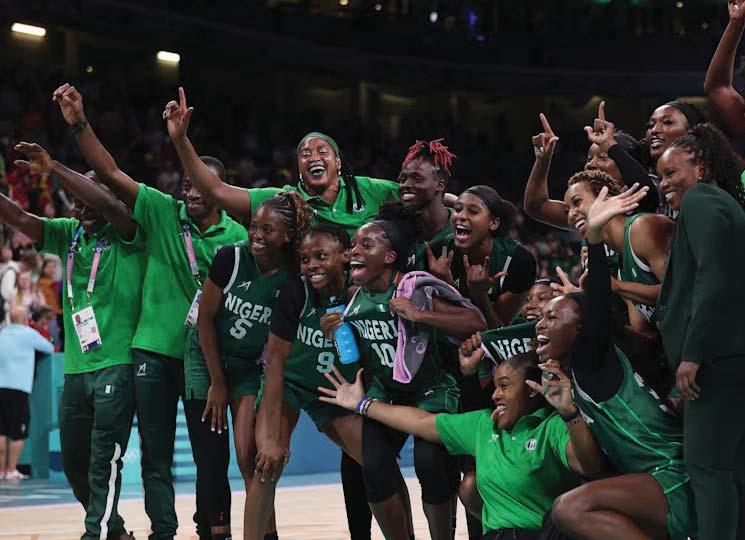
a parallelism between competitive sports and competitive contest for influencing government power in a direction the protesters are clamouring for.
The physicality of many sports, where athletes engage in direct, sometimes brutal, competition, also draws symbolism from physical combat. Sports like boxing, rugby, and American football, where physical dominance is crucial, can be seen as direct analogues to combat. Even in less physically confrontational sports, the psychological battles between competitors—where mental strength,
resilience, and the will to win are paramount—resemble the psychological warfare between opposing forces in a conflict.
Sporting competitions as modernday wars is a metaphor that captures the Olympics' intensity, rivalry, and national significance. While most of the sorts share many characteristics with warfare—nationalism, strategy, physical and psychological battles—the critical difference lies in sports' peaceful and constructive nature. Unlike wars, which bring destruction and suffering, sports
unite people, offering a way to celebrate human achievement, resolve conflicts, and foster global unity. The contrast between the Russian-Ukraine conflicts, the Hamas brouhaha and the Paris Olympics is obvious. The Olympics are symbols of peace and prosperity. The insane, rootless fanaticism that drives a sports team is the same spirit that motivates patriotic people. Nigeria should use opportunities of future Olympics to be counted among the respected nations of the world. Let our future outing qualify us to be regarded as a nation of serious minded people .


Duro Ikhazuagbe Live in Paris
Nigeria’s D’Tigress Ezinne Kalu has been named into the All-Season Team of the Women’s Paris 2024 Olympic Games Basketball Tournament.
Point Guard was phenomenal for Nigeria in D’Tigress historymaking campaign at the Paris 2024 which ended yesterday in the French capital.
Although Nigeria lost to eventual eighth back-to-back champions USA 74-88 on Wednesday night, Kalu was a major force behind D’Tigress becoming the first-ever African team to play in an Olympic Quarter-Finals.
She averaged 18.5 points, 3.0 rebounds, 4.0 assists and 2.5 steals per game.
That performance has now moved Nigeria four ranks up from 12 to 8 on the FIBA power ranking table.
The Head Coach of the team, Rena Wakama was also adjudged the Best Coach of the women’s basketball Tournament here in Paris.
Wakama led the D’Tigress to beat world number 3 Australia as well as world number 5 Canada for Nigeria to reach the quarterfinals, an African record never previously attained by either male or female team.
Interestingly, on the day that Team USA narrowly defeated hosts France by just one point to win their 10 gold medal and eighth consecutive one, it was a double celebration for A'ja Wilson after the USA forward who was voted
the MVP
showed why she is one of the biggest stars in the global game with another exceptional campaign. She was a dominant force in the Final, putting up 21 points,
13 rebounds, and 4 blocks in the Gold Medal Game. Throughout the competition, she averaged 18.7 points, 10.2 rebounds, 1.8 assists, 1.5 steals, and 2.7 blocks per game while shooting 59.2 per cent from the
That contributed to an amazing 25.7 performance efficiency valuation for Wilson who won her second Olympic Games basketball gold medal on the final day of the tournament here in Paris.
Nigeria’s Sydney 2000 Olympic Games 4x400m Relays gold medallist, Enefiok Udo-Obong has described the country’s failure to win any medal at the Paris 2024 concluded yesterday in the French capital city as a result of having incompetent administrators and inadequate preparations.
Udo-Obong who is here in Paris as the technical director of Saudi Athletic development, further stressed that apart from the above factors, ill luck also played a part in ensuring that
The United States snatched the top spot in the 2024 Olympic medal table as their women's basketball team earned a thrilling victory over hosts France to win the final gold on offer in Paris. The fearsome US team was in danger of one of the all-time Olympic upsets but won 67-66 to take gold for a record-breaking eighth Games in a row, meaning the US moved level with China's 40 golds in the medal table.
But with the American team having won 44 silvers to China's 27 – they have also won 126 medals overall to China's 91 – they top the medal table for the fourth time in a row.
In a repeat match-up of Saturday's men's final that was
won by the star-studded US at France's expense, Team USA trailed 53-51 with five minutes to play.
The occasion provided one last taste of the atmosphere of wild home support in the French capital.
LeBron James, the NBA superstar and men's gold medallist for the US, was courtside, while French President Emmanuel Macron was in the stands in support of the hosts.
The US edged back in front and in a dramatic finale, with the lead at 67-64, Gabby Williams sank a buzzer-beater for France, but it was judged to have come from inches inside the three-point line and that meant the USA won by a point.
Team Nigeria repeated the Medals “No Show” first experienced at London 2012 here in Paris.
“The failure of our athletes to win medals is due to a combination of lack of preparation, bad luck and incompetence of some of the handlers.”
He therefore calls for sweeping reforms in the administrations of most of the national sporting federations, the majority of whom their leaderships have lost touch with the latest trends in the world.
“Enough is enough. People must be held accountable. The first thing is a sweeping change in the executives of sporting federations.
“We need new ideas and fresh actions. Good that federation elections are coming soon. A lot of board members are coming with nothing to offer. Only perhaps for title in which they are ready
to pay their way for.
“We also need a strategy which should be led by the Ministry
and there must be a deliberate plan to arrive at fixed targets. Short, medium and long terms,”
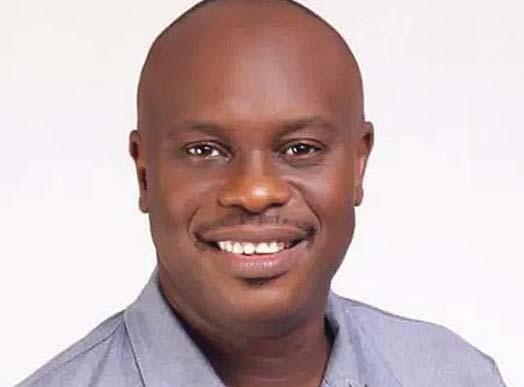
Super Eagles striker, Kelechi Promise Iheanacho, made his first appearance in a Sevilla jersey this afternoon as the Spanish side played against Liverpool at Anfield.
The 27-year-old joined Los Nervionenses on a free deal after his contract with Leicester City expired, bringing his seven-year
stint at the King Power Stadium to an end.
The Nigerian forward was thrust into Sevilla’s first eleven to face Liverpool at Anfield, but the English side were three goals up at the end of the first half courtesy of a Diogo Jota goal and a double from Luis Diaz.
Iheanacho was replaced at half-
time while another Nigerian came on at the start of the second half, in the person of Chidera Ejuke.
The former Royal Antwerp winger sparked some life into Sevilla’s attack, dribbling past Trent Alexander-Arnold, before playing a short pass to Gerard Fernandez, who then bent the ball into the far corner of Vitezslav
he counselled.
Udo-Obong is fondly remembered for running the anchor leg of Nigeria’s 4×400 metres relay. With Nigeria almost losing out in the 1600m relay after receiving baton in the fourth place, with American Michael Johnson speeding away to the gold, Udo-Obong switched gear and gave the race all he could. He covered a lot of distance to finish second behind Johnson.
Nigeria’s silver medal at the Sydney 2000 Olympics was eventually elevated to gold following the disqualification of Team USA. Antonio Pettigre was found to have doped.
Four years later at Athens 2004, Udo-Obong added another 4x400m Relays bronze to his collection to emerge one of the only Nigerian Olympians with two medals at the Games.
Jaros’ goal to pull one back for Sevilla.
17-year-old English youngster, Trey Nyoni, came off the bench to score Liverpool’s fourth of the game with a brilliant half-volley. Sevilla kicks off their La Liga season on Friday, as they travel to The Gran Canaria Stadium for their opener against Las Palmas.

There was this short story we read in our primary school English textbook many decades ago. Lifted from ancient Hindu texts, it was about six blind men that heard about an elephant and approached it in order to understand it. They all groped at it. One of them touched the trunk and said, "This thing called elephant is just like a snake!" Another touched the ear and said, “An elephant is like a fan!” Yet another blindman touched the leg and said, “No, an elephant is like a tree!” A fourth blind man touched the body and he said, “This thing called elephant is just like a wall!” Another man grabbed the tail and said, “Aaah! An elephant is just like a rope!” The last blindman touched the tusk and said, “You are all wrong. The elephant is just like a spear!”
I thought about this story of the blindmen when I read many opinions in the mainstream and social media as government officials, security agencies, journalists, academics and others argued over the real meaning of the #EndBadGovernance protests that ended at the weekend [petered out was more like it] after ten days. I counted up to twenty different perspectives regarding the essence of the protests. None was completely right or completely wrong; it all depended on one’s location, role, stance, observation, interest or mischief vis a vis the protests. In other words, which part of the elephant he or she
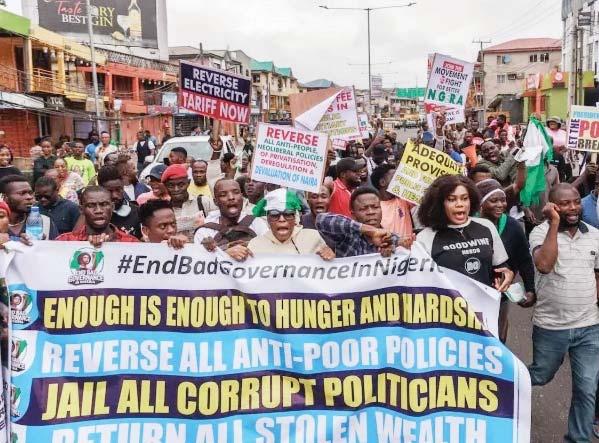
touched as a blindman.
We could glean the Tinubu Presidency’s perspective of the protests from the President’s national broadcast on the fourth day since its start. No doubt the president, who prides himself as a veteran of protests against military
dictatorship and against the June 12 election annulment, was embarrassed to find himself and his Administration’s policies as the target of protests, after only one year in office. While he was personally proud of the near-anarchic June 12 protests, President Tinubu’s personal
view of protests may have been modified by the EndSARS riots of 2020, when his businesses and expensive LASG property were targeted by rioters, followed by the embarrassing allegations and counterallegations over what happened at Lekki toll gate. His essential message this time, as encapsulated in his broadcast, is, yes, things are tough, citizens have a right to protest, but they should do so peacefully and should exercise more patience because there is light at the end of the dark socio-economic tunnel. State governors, who knew how desperate the socio-economic situation is because they spent most of the past year handing out palliatives, foresaw danger ahead of the protests and in their various ways they took steps to try to avert them. They made appeals; they mobilised clerics and elders; they employed party loyalty; empowered security agencies in their states and in some cases, they organised counter protests against the protests. In many states, the efforts failed miserably. National Assembly members escaped unscathed from these protests even though their scandalous lifestyles contributed to citizens’ anger against the government. Not to mention the tongues of their leaders, especially the Senate President, whose tongue is akin to a flame thrower in a petrol depot. Policemen and security agents must have thought that this is all unfair to
Continued on page 44
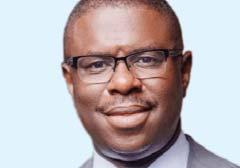
Nations, diplomacy, and sports are interwoven.
Sports persons and sports teams are, in a sense, representatives of and mirrors of their countries. It is no coincidence that most great nations are also leading sporting countries because it is a significant tool of soft power projection. Nations demonstrate their might either through ‘Fight’ or ‘play’. The latter is the province of international sporting events like the Olympics.
Sporting competitions, particularly at the elite level, have often been likened to modern-day wars. This metaphor draws on the intense rivalry, nationalistic fervour, and strategic and physical battles that characterize sports and warfare. However, unlike actual wars, which involve devastating loss of life and destruction, sports provide a controlled environment for channelling competitive instincts and resolving conflicts through non-violent means. Little wonder the famous author Goerge Orwell posits, “serious sport has nothing to do with fair play. It is bound up with hatred, jealousy, boastfulness, disregard of all rules, and sadistic pleasure in witnessing violence: in other words, it is war minus the shooting." Modern states are not expected to wage war against each other for the fun of it or just sheer dominance; the only arena of legitimate dominance that elicits nationalism and patriotic fervour is international sports. Like wars, sporting events, especially
international competitions like the Olympics, become arenas where national pride and identity are fiercely defended and displayed. Athletes are often seen as warriors representing their nations, carrying the hopes and aspirations of their people. The victories and defeats in these arenas are celebrated or mourned, almost like battles won or lost on a battlefield. The spectacle of countries competing against each other in these global events can evoke strong emotions, much like the nationalism that fuels wars. Preparing for high-level sports competitions mirrors the strategic planning capabilities seen in military campaigns. Coaches and athletes meticulously study their opponents, devise game plans, and adapt their strategies as the competition unfolds. This aspect of sports is comparable to the strategy and tactics employed in warfare, where intelligence, preparation, and adaptability often determine the outcome. The intense focus on outmanoeuvring and outthinking the opponent in sports can be seen as a simulation of the strategic elements of warfare.
The Olympics are the highest arenas of sporting glory, where sporting artistry, creativity and skills are showcased to a global audience for fame, glory, prominence and recognition. Whatever happens there mirrors the relative might and priorities of the state. It significantly reflects the economic status of a state and the opportunities it offers. Betterorganized societies and prosperous nations
are more likely to achieve better results; the reverse is the opposite. Prosperous countries invest heavily in the sports industry and reap the reward in the country's performance at these major sporting events. Historically, Africa and other third-world countries have won fewer sports awards in these competitions. Although this may have improved a little recently, the improvement is not significant.
The Paris Olympics is the latest iteration of great power competition in sports. So far, the final medals table reaffirms the familiar order of precedence among sporting nations: the US, China, Australia, France, the UK, Japan etc, are the leaders. Despite our population and talent, Nigeria is nowhere represented in the medals table. Nigeria's lacklustre performance at the Paris 2024 Olympics has shown our level of organizational tardiness, shabby preparation and shortterm solutions for long-term challenges, poor incentive system, lack of patriotism, corruption and nepotism; low government and private sector investment. Olympics success is a function of many factors- training and preparation, athlete commitment and level of patriotism, sports administration capabilities, investment in sporting infrastructure, funding and professionalism. The poor organizational capabilities of the Nigeria Olympic Committee (NOC) led to the non-registration of Favour Ofili for a race in which she had a bright chance. This
is not the first time NOC has displayed this level of negligence. Nigeria’s performance at the Paris Olympics mirrors the extent of our preparations, investment, and commitment. It is clear that we need a significant improvement in our sports administration to avert a more consequential crisis soon afterwards. Our athletes do not just have potential, they are talented and capable. However, there is a lack of sufficient incentive and motivation for them to excel in the global international sporting arena. D’Tigress, Nigeria's female basketball team, became the first African team (male or female) to reach the Olympic quarterfinals in Basketball. Favour Ofili became the first Nigerian in 28 years to reach the 200m finals. Chukwuebuka Enekwachi, in shotput, shone brightly even without a medal. Also, 18-year-old Samuel Ogazi became the first Nigerian man to reach the 400m final since 1988. Ese Brume, Ruth Usoro, and Prestina Ochonogor all secured spots in the final of the long jump event.
These achievements are a testament to the potential of our athletes and should give us hope for the future of Nigerian sports.
The Honourable Minister of Sports, Senator John Owan Enoh, demonstrated exceptional organizational skills at the Summer Olympics. However, the limited timeframe was insufficient to
